






The Goldfields-Esperance Development Commission acknowledges the traditional custodians throughout the Goldfields-Esperance region and their continuing connection to the land, waters and community. We pay our respects to members of Aboriginal communities and their cultures, and to Elders both past and present.
For thousands of years, Aboriginal and Torres Strait Islander peoples have welcomed visitors to their Country as part of their cultural practices.
The Welcome, which serves to give permission to the visitors to be on their Country, is delivered through spoken language, song, dance, and at times a smoking ceremony. Adopting the practice of a Welcome to Country by Traditional Owners or custodians of the land, or an Acknowledgement of Country by nonAboriginal or non-custodians of the land, demonstrates our recognition of Aboriginal and Torres Strait Islander peoples as the first peoples of this land and our commitment to culturally safe and inclusive ways of working. As a continuation of GEDC’s commitment to our reconciliation journey, we have our Acknowledgement to Country currently translated into ten of the 17 Aboriginal languages of our region.
We thank the Goldfields Aboriginal Language Centre and the language custodians for their contribution to this resource. Locations of languages are approximate and may not be based on traditional locations.
GEDC-tula yurrulykula yilta ngaarla parnajanu. Goldfields-Esperance region mantangkaya nyinanyi kapi, ngurra, parnaya kanyinyi. Respect-pala nintilku yiltajanalarti, Tjukurrpala janampa respect-amulku. Elderstila respect nintilku, elders kuwarrija, elders-jaya yanu wantingu nganananya.
Ngurra lampaju kulinyila Nga Goldfields-pa kamu Esperance-pa Development Commission-lu kulinyi ngurra waljajarra pararra Goldfieldspakamu Esperance wana nyuntutinyi kurnu parna kapi kamu ngurra walja. Ngayutinyipa kuntala kanyininyi parlparriku Martuku ngurra kamu kuruwarri kamu jilpi tuju juljujarnu kamu yungunku.
Goldfields-Esperance Development Commission ninti ngurra kanyilpa Kawutjarra-ngurra. GEDC ninti purlkanya manta lipi, kapi puru ngurra. Pirni kurnta yanangu, yanangu pirni-lu ngurra walykumunu kanyinma puru lurrtjurring. Pirn-lu kurtarriwa ngayuku kutjurlping katja puru ngula puru kuwarring katja.
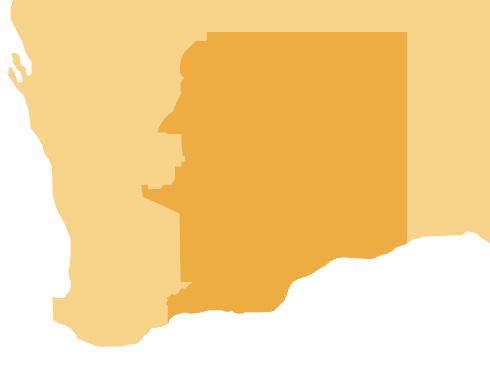
Perth
Goldfields-Kepa Kurl djandjoo koorliny. Birdiya kaditjidjiny Noongar Moort boolarang Goldfields – Kepa Kurl boodjar wer baalabang ngadiny dandjoo yoodaniny Boodjar Kep wer Moort. Ngalak kadidjiny ngalang kootadjinong boola Moort-ak Ngalak kadidjiny ngalang koota-djinong boola moort-ak.
Ruukulinu Ngurra Nangana The Goldfields-Esperance Development Commission ruukulinu ngurra kapi nangana nurraku, nurrapirni ngurra yungkarra nyinannyinangku mirrirringku nurra jirtu tawarra nyinannyinan. Ngalipaka The Goldfields-Esperance Development Commission pukurlpa wangkatjapirni jirtu yamatjirrin nyalpapirni, kaparlipirni tana kuwarri nyinan, tana pawurtu.
Goldfields-Esperance Development Commission ruukulilku Wangkatja pini Malpa, Anang tjuta ngurrara Goldfields-Esperance regiontjanu. Tjanalu tirtu kanyira parnaku, kapiku, ngurraku, tjanalu kuturtu kurti kanyira. Goldfields-Esperance Development Commission kuntawiya kulilku, nyakula, pukurlpa piniku kuwarri nyinarra, pukurlpa nyalpa piniku tiwa nyinangu. Palunya.
Yintaanku parna. Goldfields-Esperance Development Commission yintaa Yarnangu Goldfields-Esperance-ngku tjanaku tirtu kanyila parna, kapi ka ngurra. Ngalipaku kulila Yarnangu ka tjanaku Tjukurrpa; ka nalpa pirni wanka ka ngalpa pirniku warrkanu.
Wirrurl kanyilpai ngurra ka palu jana lintinyi. Anangu tjutaku kanima ngurra wirruku munu kapi, ngurra. Anangu tjuta wirru ngurra kanyilpai ka tjilpi tjuta irriti tjana pukalpa nyinapai.
Ngadjungarra ngurra nguntu wamurti. Goldfields-Esperance Development Commission-nya ngadjungarra nguntu tartinyirri matayi wamurti pana katajala Goldfields-Esperance region mathulu tjukurrpa munjanguu pana, kapi and mathalu. Ngadjungarra nguntu tartiny matayi pana, tartiny ngaringin matayi yungarnkin matayi.
Parna-lipitja Kulira Watjarni. Kawultjarra-ngurra Itjaparantja Tjanala Tjungungku Atatjurra-kulira Kanyintjakitja- nyinapayi, Kamitjantu panyangku Kamitjantu palya watjarni, wati minyma tjukurrpa kanyilpayinya tjananya, panya Kawultjarra-ngurra, Itjaparantala tjanala rawanguru nyinanyinara; parna, ngurra, kapimpa rawa nyina-nyinatja tjananya. Nganarna Kamitjantu, Arnanguku ngurrarra winki palya watjarni kaltja kurlu; munu Yirna-tjurta, irrititja-mpa kuwarritja kurlu-kurlu.

Welcome to the Goldfields-Esperance Development Commission (GEDC) Annual Report for the financial year 2023-2024.
This Annual Report has been compiled by the GEDC and is submitted to the Parliament of Western Australia as a summary of the year’s achievements and performance, measured against our Government Goals, strategic priorities and key performance indicators.
This Annual Report is available in PDF format from our website, www.gedc.wa.gov.au and can be made available in alternative formats on request. To make inquiries or share feedback on this Annual Report, please contact GEDC on (08) 9080 5000 or send an email to: info@gedc.wa.gov.au

For the year ended 30 June 2024
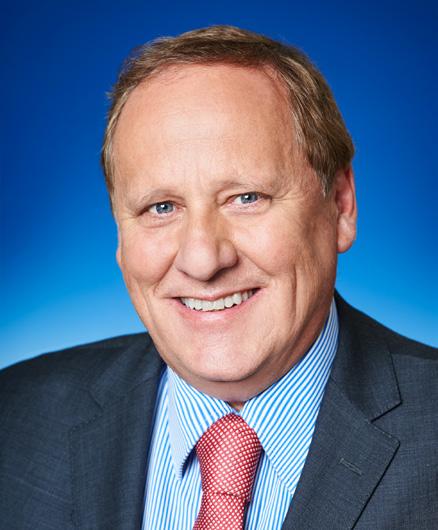
To the Hon. Don Punch MLA Minister for Regional Development
In accordance with Section 63 of the Financial Management Act 2006, we hereby submit for your information and presentation to Parliament the Annual Report of the Goldfields-Esperance Development Commission for the financial year ended 30 June 2024.
The Annual Report has been prepared in accordance with the provisions of the Financial Management Act 2006.
The Goldfields-Esperance Development Commission is established under the Regional Development Commissions Act 1993.
In the performance of its functions, the GEDC complies with all relevant laws and key legislation impacting on its operations including but not limited to:
• Regional Development Commissions Act 1993
• Auditor General Act 2006
• Disability Services Act 1993
• Equal Opportunity Act 1984
• Financial Management Act 2006
• Freedom of Information Act 1992
• Industrial Relations Act 1979
• Minimum Conditions of Employment Act 1993
• Public Sector Management Act 1994
• Salaries and Allowances Act 1975
• State Records Act 2000
• Procurement Act 2020
• Work Health and Safety Act 2020
• Royalties for Regions Act 2009
• Public Interest Disclosure Act 2003.
At the date of signing, the GEDC is not aware of any circumstances which would render the particulars in this statement misleading or inaccurate.

Terrence Winner Chairperson
August 2024

Kris Starcevich Chief Executive Officer
August 2024


The Goldfields-Esperance region is geographically, economically and culturally diverse with significant opportunities across a range of dynamic industry sectors.

It is with great pleasure I present the GEDC’s Annual Report for 2023-24, for the first time as Chairperson, a position I was privileged to be appointed to in August 2023.
Despite recent challenges facing some of our industries and communities, I continue to be encouraged and uplifted by the incredible opportunities for growth in our region which are underpinned by the strength and resilience of our region’s people, industries, businesses, and community organisations. These are enduring characteristics of the Goldfields-Esperance region, and while we are proud of our idyllic and diverse places to live and visit, we also know how important our contribution is to the State’s economy, with a Gross Regional Product of $14.9 billion.
As Chairperson and a passionate Goldfields local, I frequently encourage the Board and staff to find ways to enhance our economically and culturally diverse region and promote our amazing regional communities.
In October 2023, the Honourable Don Punch MLA, Minister for Regional Development, released the Western Australian Regional Development Framework (Framework).
We plan to continue travelling and engaging across our vast and diverse region in the year ahead and I would like to take this opportunity to acknowledge current Board Members Tracey Rathbone (Deputy Chair), Tim Carmody, Jaimen Hudson, Sarsha Lander and Katrina Stubbs who, along with the GEDC’s dedicated CEO Kris Starcevich, have been exceptional advocates for the Commission and for the needs of the Goldfields-Esperance region and a great team to work with.
Regional development is fundamentally about the people who live, work and invest in our regions. It is about the community and economies in these regions, and how they contribute to a growing and sustainable future for all Western Australians.
This Framework sets out a clear vision and focus areas for the Regional Development Portfolio, which includes Regional Development Commissions (RDCs), and aims to ensure WA has sustainable, vibrant and liveable regional communities, supported by strong and prosperous economies.
30 years on, since the Regional Development Commissions Act 1993 came into being, the significant role of RDCs across the State continues to evolve within Government and be acknowledged by our regional stakeholders. Throughout the year, I was delighted to host the Minister for Regional Development on several visits to the region and assist with many other WA Cabinet Minister’s visits and engagements, including Community Cabinet in Kalgoorlie-Boulder in July 2023.
Meeting throughout the year in various regional locations including Ravensthorpe, Norseman, Kalgoorlie-Boulder and Esperance, gave the Board the opportunity to connect with local stakeholders and hear and see firsthand, the issues and opportunities they are facing.
Once again, our achievements over the past 12 months have been presented in line with our GEDC Strategic Plan 2022-24, which identifies five strategic initiatives. Aligned closely to the Framework, these are:
1. Resource and Industry Development
2. Industry Diversification
3. Regional Living
4. Aboriginal Economic Development
5. Organisation Excellence
Finally, I would like to recognise the efforts and contributions of outgoing Chairperson Sabina Shugg, and Board Member Rowena Leslie. Both Sabina’s and Rowena’s leadership, direction and support made my transition extremely smooth and I wish them both the very best for their future endeavours.

Terrence Winner, Chairperson August 2024
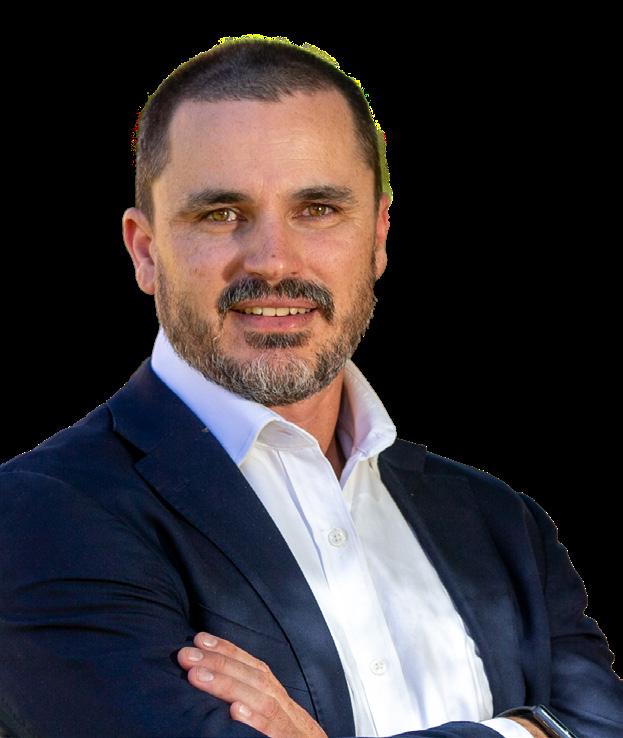
It has been another exciting and productive year for the GEDC and the GoldfieldsEsperance region, a region that continues to play a significant role in the State’s economy. Our remote regional areas have received high levels of visitation and migration from the larger centres, which has created growth in the local economies.
Like other parts of regional Western Australia, we are experiencing the pressures from the cost of living, high costs of doing business, supply constraints on workforce, accommodation and housing, competitive global markets, and a drying climate. But despite these challenges impacting communities and our key economic drivers, the region has seen significant and sustained investment from our mining operations, transitions into renewables, and government investment in key infrastructure and land activation measures.
This year the GEDC was the lead agency for several regionally significant projects including the Kalgoorlie Rail Realignment Project, which is underway with funding of $2 million from the Australian Government and a further $500,000 from the Western Australian Government. The GEDC is the lead agency for a Regional Drought Resilience Plan, also funded by both levels of government, recognising the need for regions to better understand their vulnerabilities and be prepared for a changing climate.
In addition to the projects outlined in this year’s report, we were thrilled to see several key investment decisions in our region earlier this year.
We are often called upon to facilitate groups that map opportunities and interventions in order to address these matters with place-based solutions. This has included a focus on residential housing and land, activating industrial land, economic development, climate resilience and water security.
In addition to promoting and supporting local and regional outcomes, the GEDC is part of the Regional Development Portfolio and has played a key role in the development and implementation of the WA Regional Development Plan, contributed to State and national inquiries and committees, supported key statewide regional development initiatives and influenced policy development.
We continue to work closely with First Nations people across the region, supporting local Aboriginal enterprise to build capacity and access procurement opportunities, undertaking concept and project development and Co-Chairing an EconomicEmpowermentWorking Group with the Tjiwarl Aboriginal Corporation in the Northern Goldfields.
These investments include the State’s commitment to industrial land in the Goldfields, which was bolstered by major investments in the Mungari Strategic Industrial Area and Anzac Drive Estate - something the GEDC and our stakeholders have been working towards for many years.
The Eucla Airstrip has also been a priority infrastructure project for several years, and with the support of the State and Local Government, has now received over $3 million to seal the airstrip and make it suitable for all weather use.
The GEDC actively works with many stakeholders and government agencies to understand the complex issues facing our region, also working across government portfolios to identify actions, strategies and funding.
With a proactive Minister, a supportive and strategic Board and a dedicated and passionate team of regional development practitioners and corporate staff, I am confident we will continue to generate positive regional development outcomes for the Goldfields-Esperance region into the year ahead.

Kris Starcevich, Chief Executive Officer
August 2024
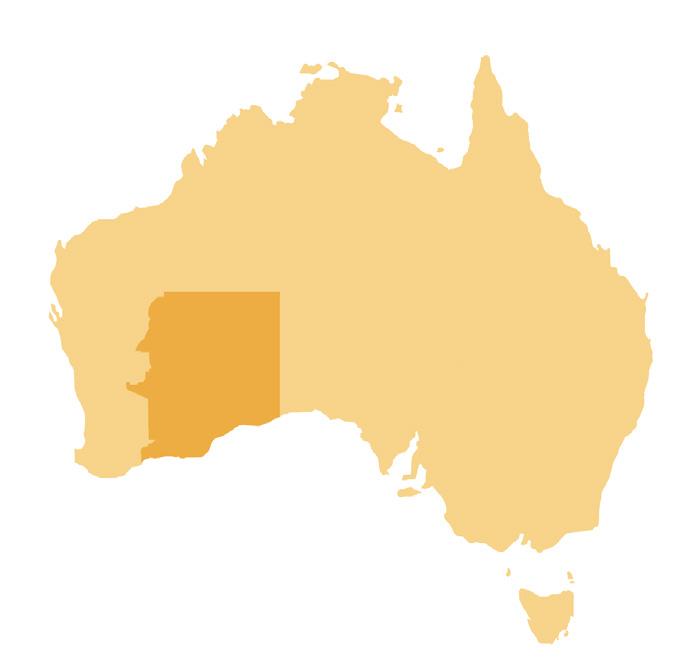
The Goldfields-Esperance region is located in the south-eastern corner of Western Australia.
The largest in WA, our region covers an expansive land area of over 950,000km2. That equates to over 148 Perth Metropolitan Areas!
per Local Government Area
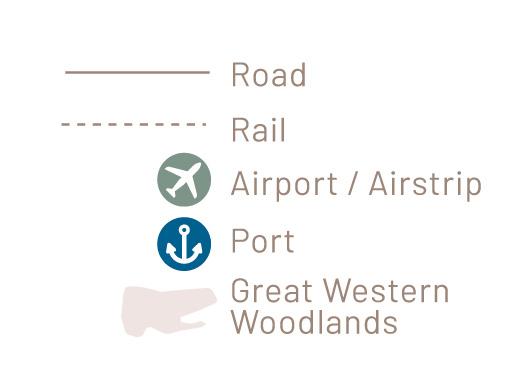
One of the most significant mining regions in Australia producing commodities including gold, nickel, copper, lithium, iron ore, rare earths and critical minerals. The mining sector contributes $27 billion in regional economic output.
The region is geographically vast and diverse, internationally recognised for its expertise in mining mineral resources, rich agricultural commodities, spectacular natural environment and an abundance of unique experiences.
The southern region features primarily broadacre crops, with livestock, fisheries and forestry activities. The Esperance Port is a strategic asset and important economic enabler with its highest traded commodities being iron ore, grain and spodumene.
(2022-23)
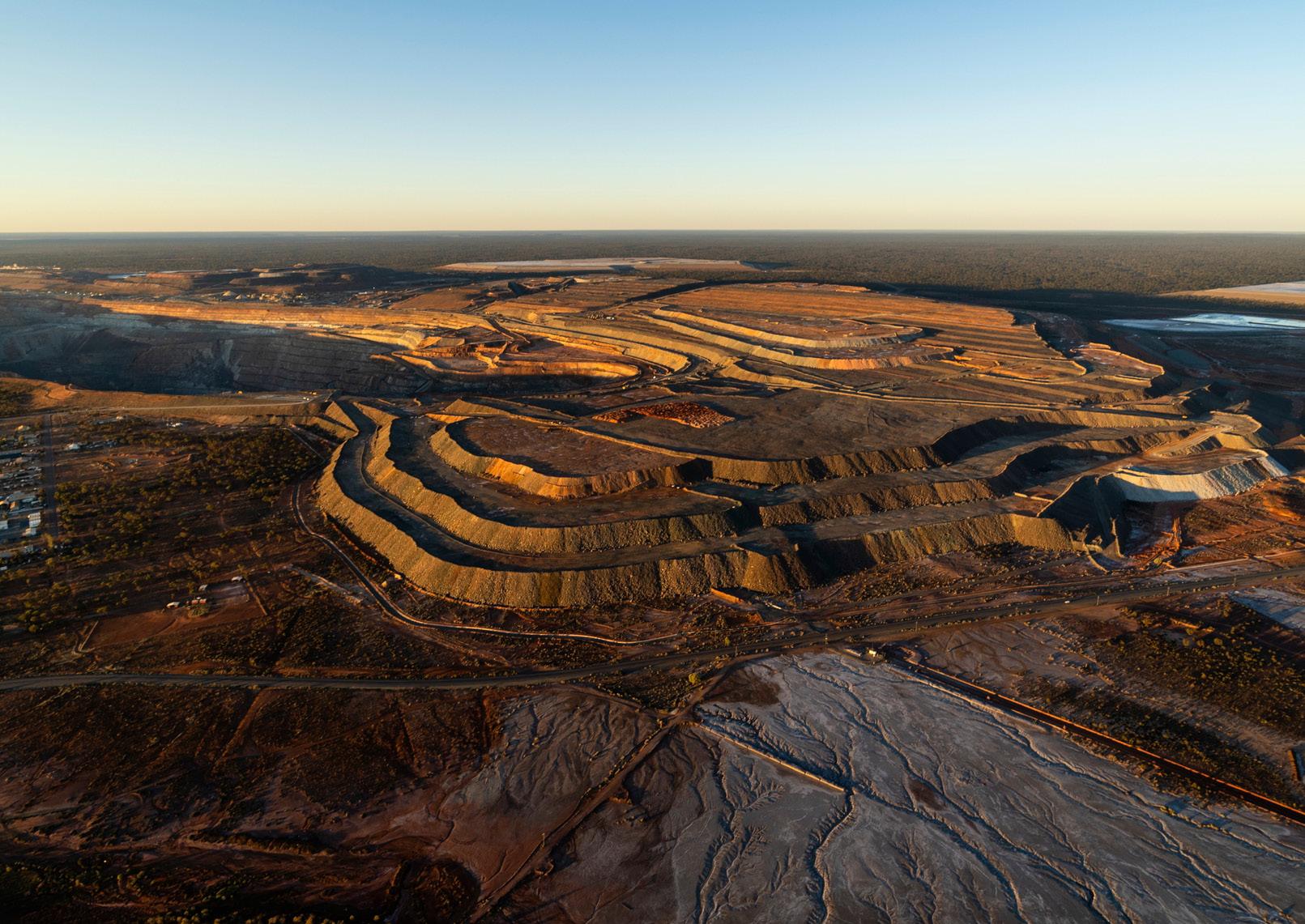
Unemployment Rate (Sept 2023)
Sectors by Economic Output ($m)
Mining Manufacturing
Construction
Rental, Hiring & Real Estate
Agriculture, Forestry & Fishing
Transport, Postal & Warehousing
Electricity, Gas, Water & Waste Public

The purpose of the Goldfields-Esperance Development Commission is to facilitate economic and social development in the region. The Goldfields-Esperance Development Commission works with business, industry, the community, and government to achieve this goal.
The Goldfields-Esperance region is economically and culturally diverse, with vibrant communities and a prosperous future.
The Goldfields-Esperance Development Commission is a values-driven agency that promotes a positive and collaborative working environment within our team, government and with our stakeholders.
In all that we do, inspiring a culture of innovation, continuous improvement and leadership within the agency.
Acting with integrity and accountability, making ethical and informed decisions, consistent with State Government objectives. This is demonstrated through excellence in governance and performance of the agency.
We care about the work we do and people we work with. We engage respectfully with stakeholders, to connect and collaborate, to understand complex and diverse issues and perspectives, and to facilitate initiatives and investment in the region.
We take a proactive and adaptable approach to economic development, promoting initiatives that bring about meaningful change within government, industry, and regional communities, and making a positive difference for the region and the State.

The GEDC is a statutory authority that works closely with other agencies, including the Regional Development Portfolio (the Portfolio), to deliver its government goals, and to coordinate and influence the activities of other government agencies in the region.
The Portfolio comprises the following agencies that work together to develop and implement regional development activity across the State:
• Western Australian Regional Development Trust (the Trust);
• Regional Development Council (RDCo);
• Nine Regional Development Commissions (RDCs) including the GEDC;
• Department of Primary Industries and Regional Development (DPIRD); and
• Western Australian Regional Development Alliance (WARDA).
The Portfolio creates the link between government priorities and regional representation, championing regional economies and being an advocate for the regions across and beyond government.
This unique position means the Portfolio is well placed to support government plans in the regions, by providing strategic advice that reflects on-the-ground needs. The Portfolio works to develop strong and effective relationships across government, industry and community to achieve positive regional development outcomes.
The Minister for Regional Development published the Regional Development Framework in October 2023 as a new framework to guide the initiatives of the Regional Development Portfolio. The Regional Development Framework sets out a vision for WA regional communities and five areas of focus to guide the work of Portfolio agencies.
These five focus areas respond to regional need, align with Government priorities and the legislative framework for the Portfolio. The five focus areas below, inform the strategic plans and business plans of each portfolio agency including the GEDC.
• Regional liveability
• Economic development, diversification and innovation
• Climate resilience and low carbon transition
• Aboriginal empowerment and prosperity
• Organisational excellence
Western Australian Regional Development Portfolio Agencies
Australian Regional Development Trust
and
Development
Minister for Regional Development
Council Western Australian Regional Development Alliance
9 Regional Development Commissions
The Goldfields-Esperance Development Commission, established under the Regional Development Commissions Act 1993 (Act), is listed as a statutory authority on Schedule 1 of the Financial Management Act 2006 and subject to the provisions of the Public Sector Management Act 1994.
The GEDC is one of nine Regional Development Commissions, established to fulfil and serve their unique region of Western Australia, and to achieve specific objectives defined in the Act:
For the purpose of achieving the objectives, the GEDC is to do the following:
The GEDC is responsible to the Minister for Regional Development, the Hon. Don Punch MLA. The Minister has the power to direct the GEDC either generally or with respect to a particular matter, on the exercise and performance of its powers, functions and duties under the Act.
The GEDC is governed by a Board of seven people, including six regional representatives from Local Government, community and Ministerial nomination, and the CEO, who is a member of the Board by virtue of office.
• Maximising job creation and improving career opportunities in the region;
• Developing and broadening the economic base of the region;
• Identifying infrastructure services to promote economic and social development within the region;
• Providing information and advice to promote business development within the region;
• Seeking to ensure that the general standard of government services and access to those services in the region is comparable to that which applies in the metropolitan area; and
• Taking steps to encourage, promote, facilitate and monitor economic development in the region.
• Promote the Goldfields-Esperance region;
• Facilitate co-ordination with relevant statutory bodies and State Government agencies;
• Cooperate with representatives of industry and commerce, employer and employee organisations, education and training institutions and other sections of the community within the region;
• Identify the opportunities for investment in the region and encourage that investment;
• Identify the infrastructure needs of the region, and encourage the provision of that infrastructure in the region; and
• Cooperate with: departments of the Public Service of the State and the Commonwealth, and other agencies, instrumentalities and statutory bodies of the State and the Commonwealth; and Local Governments, in order to promote equitable delivery of services within the region.
Through a Service Level Agreement (SLA) and Partnership Framework, the Department of Primary Industries and Regional Development supports the GEDC with resources to fulfil its functions under the Act and is the employing agency for the staff assigned to the GEDC under section 29 of the Act. All members of the Board and staff are regionally based and contribute specialised skills, experience and local knowledge that benefits the Commission and the region.
The GEDC Strategic Plan 2022-24 sets out key initiatives and strategies for GEDC to drive economic and social development for the region.
The GEDC Strategic Plan has five priority areas for the GEDC for the Annual Report period 2023-24, these are:
• Resource and Industry Development
• Industry Diversification
• Regional Living
• Aboriginal Economic Development; and
• Organisational Excellence
Further information on our Strategic Priorities can be found on page 23.
Senior Regional Development Officer
Regional Development Officer Director Regional Development
Chief Executive Officer
Minister for Regional Development
GEDC Board
Chief Financial Officer (DPIRD)
Senior Regional Development Officer
Senior Regional Development Officer Director Regional Development Communications Adviser (0.5)
Local Content Adviser
Regional Development Officer
Regional Development Officer
Executive Officer
Executive Assistant Administration Officer
The Board is the governing body of the GEDC and meets up to six times annually.
Board Members are appointed by the Minister for Regional Development and approved through Cabinet.
Meetings are held around the region, enabling members to be accessible to local stakeholders. This provides Board Members with valuable insight into the challenges and opportunities facing the region and priorities for regional development.
In 2023-24 the Board undertook a number of regional Board meetings in the City of Kalgoorlie-Boulder, Shire of Leonora, Shire of Esperance and Shire of Dundas.
The Risk Management and Audit Committee (RMAC) is a sub-committee established by the Board and met three times during 2023-24. It is required to manage the GEDC risk register and implement actions to identify and mitigate new and changing risks to the agency and Government. The RMAC also oversees an effective internal audit function under Section 53 of the Financial Management Act 2006.
In August 2023, two Board appointments ended. GEDC acknowledges the significant contribution made by retiring Board Members during their tenures.
Sabina Shugg, GEDC Chair
Appointment: Community Representative Term: 1 Sept 2020 - 6 Aug 2023
Rowena Leslie, GEDC Board Member
Appointment: Ministerial Representative
Term: 12 Jul 2021 - 6 Aug 2023




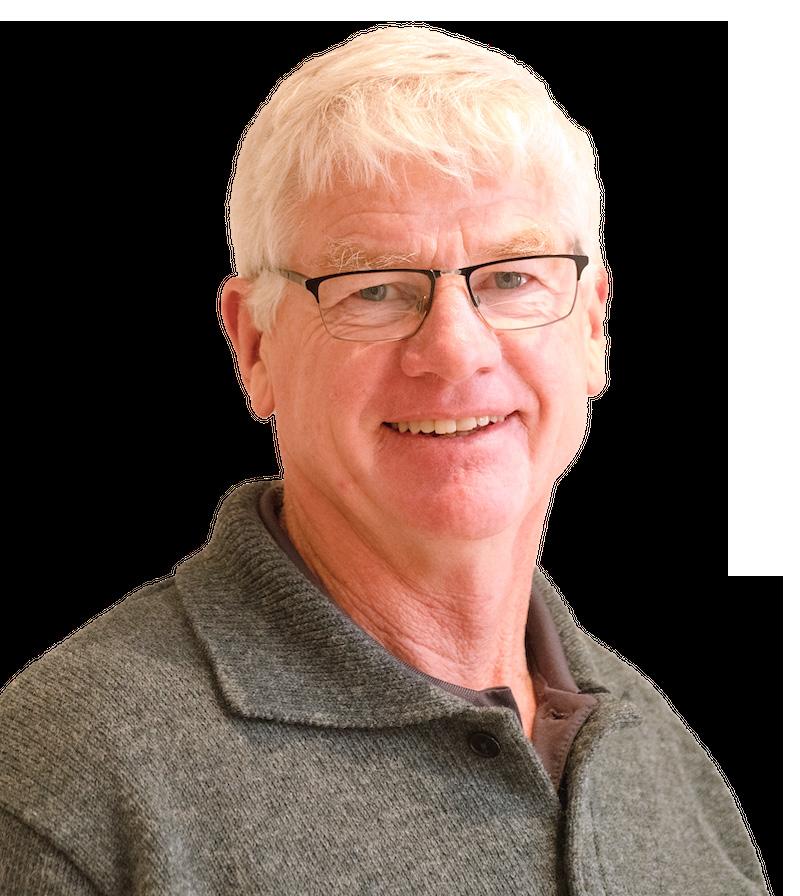
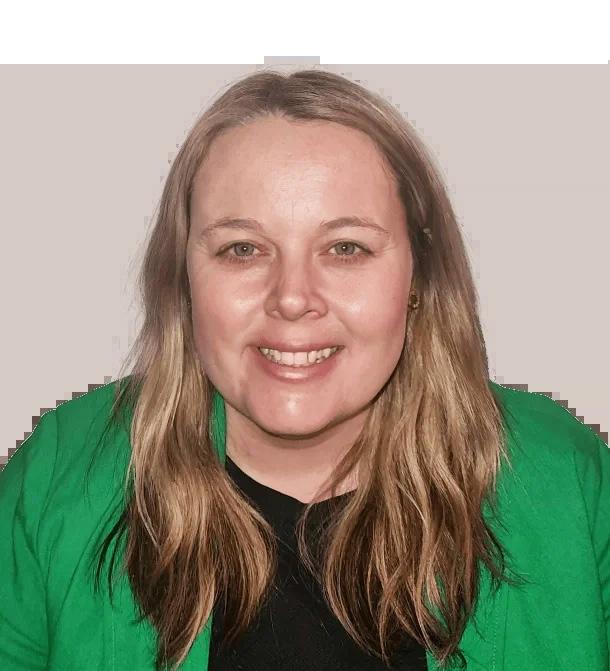
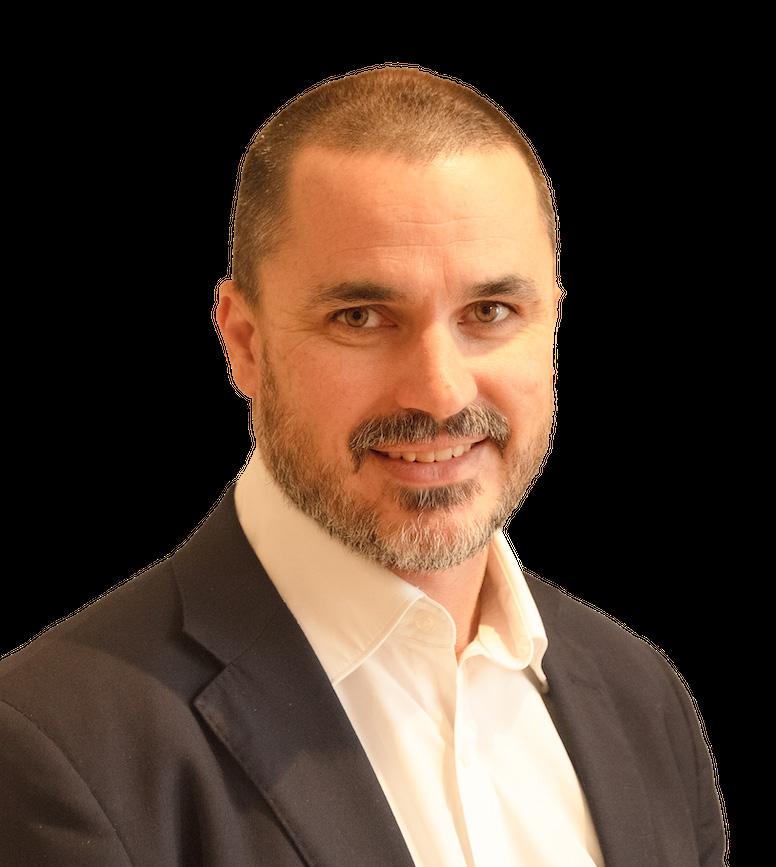
Appointment: Community Representative Term: 1 Oct 2020 - 30 Jun 2026
Terrence was appointed to the GEDC Board in 2020, bringing with him 15 years of experience as a CEO within the not-for-profit sector. Terrence holds qualifications across management, strategic leadership, business, community development, marketing, training, youth and disability services and has excellent insight into regional challenges and opportunities, being raised in the Goldfields.
Terrence is very active within the Goldfields-Esperance community, holding several key roles, including elected Councillor with the City of Kalgoorlie-Boulder, CEO of the Goldfields Individual & Family Support Association Inc., and Chair of the Kalgoorlie-Boulder Visitors Centre.
Terrence was named the 2009 WA Young Person of the Year, is a previous winner of the State Leadership and Innovation Award at the Western Australian Regional Achievement & Community Awards and has won a Mayoral Award from the City of Kalgoorlie-Boulder.
Appointment: Local Government Representative Term: 1 Jan 2022 - 31 Dec 2025
Tracey was elected to the Shire of Coolgardie Council in 2011 and is currently the seated Deputy Shire President, having been selected in 2013.
Tracey holds a Diploma of Local Government, is an Alumna of the Western Australian Local Government Association (WALGA), the Australian Rural Leadership Foundation (ALRF) and the Rural Regional Remote Women’s Network of WA (RRR Network). She is passionate about community and applies her individual leadership style locally and regionally, to inspire inclusion, collaboration and change wherever possible.
As a practicing life skills coach, Tracey is committed to making a difference in the community and is an advocate for those navigating mental health issues. Tracey continues to fervently raise the importance of improving access to mental health services, especially for youth, and the health and wellbeing of the region’s senior citizens.
Appointment: Ministerial Representative Term: 1 Jan 2022 - 31 Dec 2026
Jaimen is an Esperance-based business owner and internationally renowned photographer and videographer. After becoming quadriplegic following an accident, Jaimen developed an interest in drone photography and videography and now has his own business as a photographer and videographer, specialising in coastal and marine wildlife. In 2021, Jaimen starred in a documentary called Jaimen Hudson: From Sky to Sea.
He has extensive tourism and creative industries experience, and is a member of the WA Disability Commission Board. Jaimen won the Western Australian’s Young Achiever of the Year Award, 2018, in both the Online Achievement and People’s Choice Award categories and was a finalist for Young Australian of the Year, 2019.
Appointment: Local Government Representative Term: 1 Jan 2022 - 31 Dec 2025
Tim has been a Councillor at the Shire of Wiluna since 2019, becoming Deputy Shire President in 2023. He is an agricultural business owner with operations in Cascade, Esperance and Wiluna. He has 30 years’ experience working in the industrial minerals sector and managing mine sites in Australia, Zimbabwe and China. Tim was raised in a farming family based in Kulin and has engaged in the agricultural sector throughout his life.
Appointment: Community Representative Term: 7 Aug 2023 - 30 Jun 2026
A Wongutha and Yamatji woman born and raised in the Goldfields, Katrina worked in the mining industry for a number of years before establishing the Kalgoorlie-based business Kai Rho Contracting with her sister in 2013.
Whilst still at school, Katrina learned bookkeeping skills from her mother at the age of 16 – skills which became the foundation for her career in Finance. She has a Diploma of Management and Diploma in HR Management from Curtin University, Kalgoorlie. Now as the Chief Financial Officer for their business,
Katrina manages her commitments to work, her family and community. She is passionate about building opportunities in her community and uses her skills as Treasurer for three local organisations: the Kurrawang Aboriginal Christian Community, People’s Church Kalgoorlie and the Goldfields Aboriginal Business Chamber.
Katrina’s husband works alongside her and they have two children.
Appointment: Community Representative Term: 7 Aug 2023 - 30 Jun 2026
Since calling the Goldfields home in 2010, Sarsha has found her true passion for community. She has worked in the social services industry for the last 13 years, working across the mental health, drug and alcohol sectors before moving to the disability sector as Client Services Manager with Empowering People In Communities Inc (EPIC).
Sarsha has gained various qualifications in leadership, management, mental health and governance. As well as holding committee positions with a local martial arts group and the Museum of the Goldfields, she is also the founder and Chairperson of Golden Community Mile Inc.
Kris has been in the role of Chief Executive Officer at the Goldfields-Esperance Development Commission since May 2018, and originally joined the Commission in 2014.
With extensive experience working in regional Western Australia in both the public and private sectors, Kris offers a holistic approach to regional development.
Born and raised in Esperance, Kris began his career in secondary teaching in the Pilbara before taking up an opportunity to diversify his skills in the mining industry. Kris worked as a community relations practitioner for Rio Tinto for a number of years, working and living in several Pilbara communities.
During this time, Kris completed a Graduate Certificate in Community Relations at the University of Queensland, cementing his passion for community development he demonstrates today.
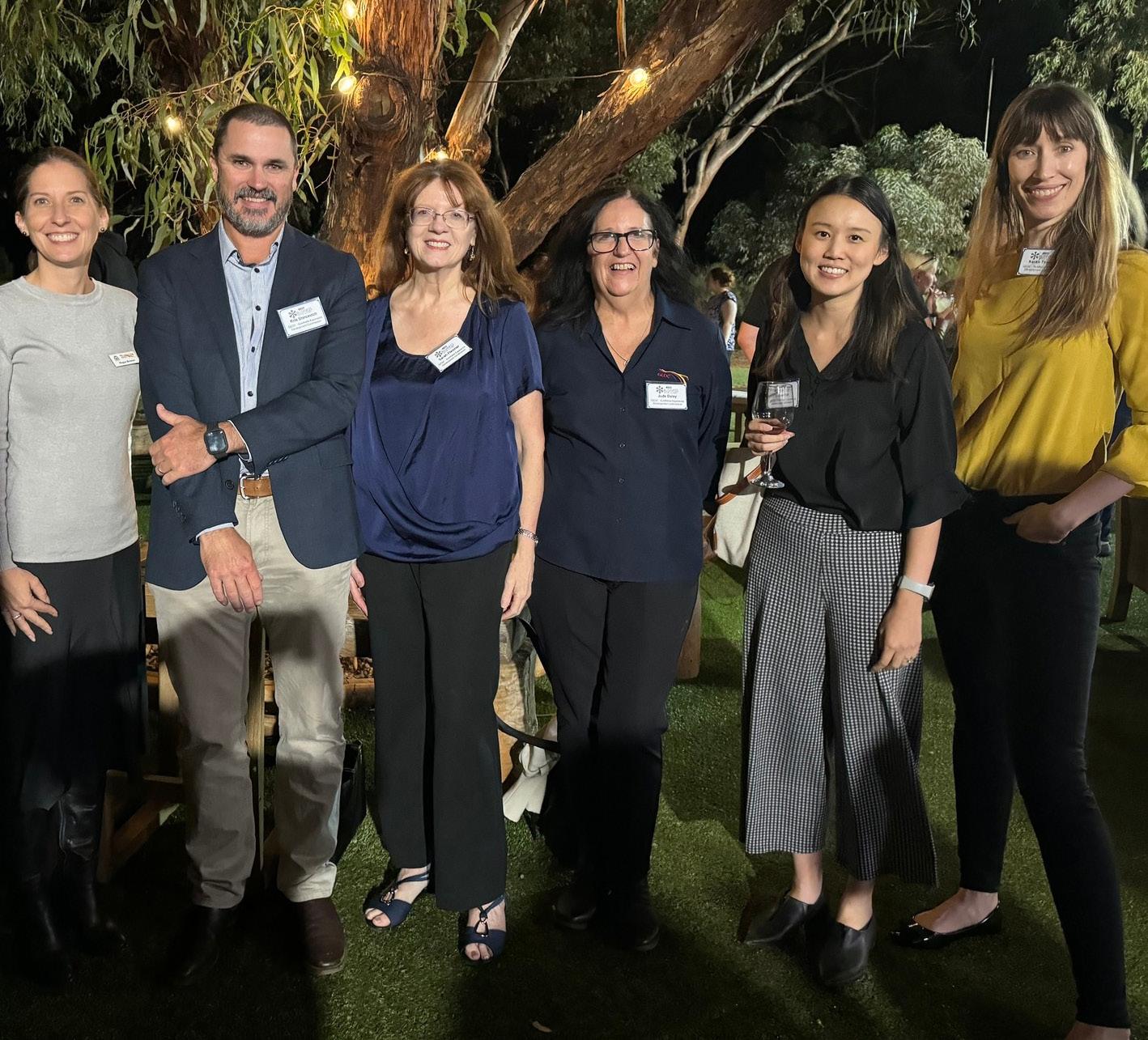
Reflected through its mix of skills and experience, our staff live and work in the region and have a wide range of qualifications and professions. The GEDC team comes together as a strong, supportive and unique workplace community, with a wide-ranging scope of knowledge, education, expertise and regional understanding.
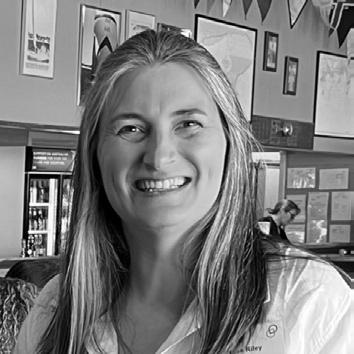


Rose Riley
Director Regional Development
Key Focus Areas:
• Agency leadership and performance
• Strategic initiatives
• Regional planning
• Industrial land, residential land and housing
• Infrastructure
Regan Brewer
Director Regional Development
Key Focus Areas:
• Investment management
• Grant governance
• Industry development
• Stakeholder engagement
Sarah Fletcher
Director Regional Development (Projects)
Key Focus Areas:
• Kalgoorlie Rail Realignment Project
• Infrastructure
• Workforce development
• Strategy and policy
• Stakeholder engagement
A shared commitment to maximise impact on our region, and in the communities in which we live.
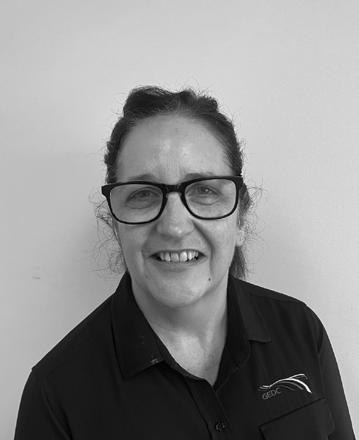
Jude Daley
Local Content Adviser
Key Focus Areas:
• Connecting local businesses with local supply opportunities
• Delivering local content events and workshops
• Regional perspectives for State policy and procurement reviews
• Stakeholder engagement
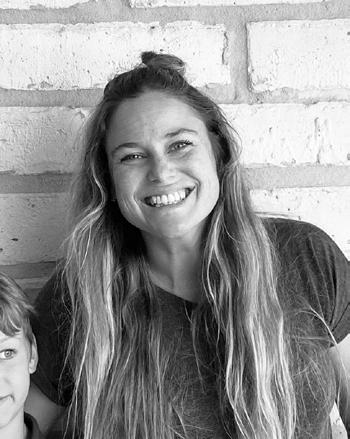




Kate Dansey
Communications Adviser
Key Focus Areas:
• Website development
• Project communications
• Raising GEDC profile
• Media support and promotion
• External facing communications
Haidee Vandenberghe
Senior Regional Development Officer
Key Focus Areas:
• Regional Drought Resilience Planning Program
• Early Childhood Education and Care sector initiatives
• Stakeholder engagement
Lillian Poh
Regional Development Officer
Key Focus Areas:
• RED Grants and Small Grant Program
• Housing and Land Summary
• Data analysis and REMPLAN modelling
• Stakeholder engagement
Sophie Willsher
Project Officer
Key Focus Areas:
• Goldfields-Esperance Regional Drought Resilience Plan
• Project Management
• Tourism initiatives
• Community capacity building
Shane Liddelow
Senior Regional Development Officer
Key Focus Areas:
• Regional coordination groups
• Infrastructure
• Tourism development
• Stakeholder engagement
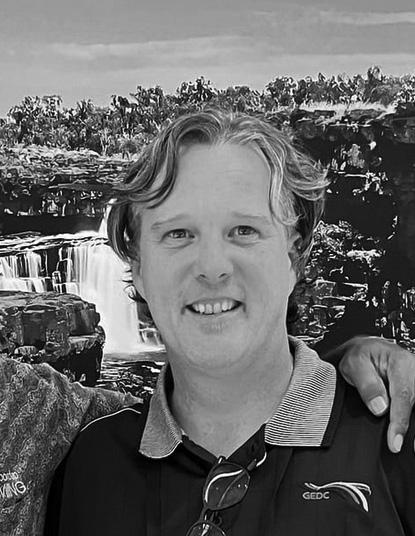
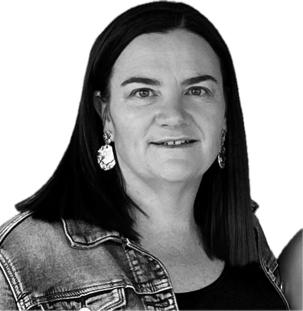


Nigel Bird
Regional Development Officer
Key Focus Areas:
• Creative arts and cultural industries
• Aboriginal empowerment and engagement
• Northern Native Seed Industry Development Initiative
• Film industry development
Amanda Klemm
Executive Officer
Key Focus Areas:
• Corporate Governance
• Administering and reporting for RMAC
• Internal Audit
• Cyber and Digital Security
• Internal Policy Review
• Financial Management
Karen Theaker
Executive Assistant
Key Focus Areas:
• Executive support for CEO and Board
• Stakeholder engagement
• Corporate and event support
Rachel Witheridge
Administration Officer
Key Focus Areas:
• Executive and Corporate support
• Financial Administration
• Project and event support
Other contributing staff throughout the year
Michelle Earle - Administration Officer
Makalla Skonis - Solid Futures Trainee
The State Government uses an Outcomes Based Management Framework to measure the effectiveness of the GEDC in meeting Government goals, desired outcomes and key performance indicators.
The GEDC’s Government goals set for 2023-24 are:
• WA Jobs Plan
Diversifying the Western Australian economy, creating local jobs for the future.
• Safe, Strong and Fair Communities
Supporting our local regional communities to thrive. DESIRED OUTCOME
The GEDC has two performance indicators – an effectiveness and an efficiency indicator – to measure the performance of the GEDC against its government goals, desired outcomes and service framework.
• Key Effectiveness Indicator
The GEDC’s effectiveness indicator is a measure of client satisfaction with the provision of an environment conducive to the balanced economic and social development of the Goldfields-Esperance region.
• Key Efficiency Indicator
The desired outcome of the GEDC is to encourage and promote opportunities to investment, attract and retain population, and grow the economy of the Goldfields-Esperance region.
The GEDC’s role is to promote economic development and sustainable regional communities.
The GEDC’s efficiency indicator is the average cost per hour to operate the GEDC over the financial year.
The Commission shares responsibility for achieving its Government goals and outcomes with the Regional Development Portfolio agencies, and by working with government departments to promote economic development and sustainable regional communities.

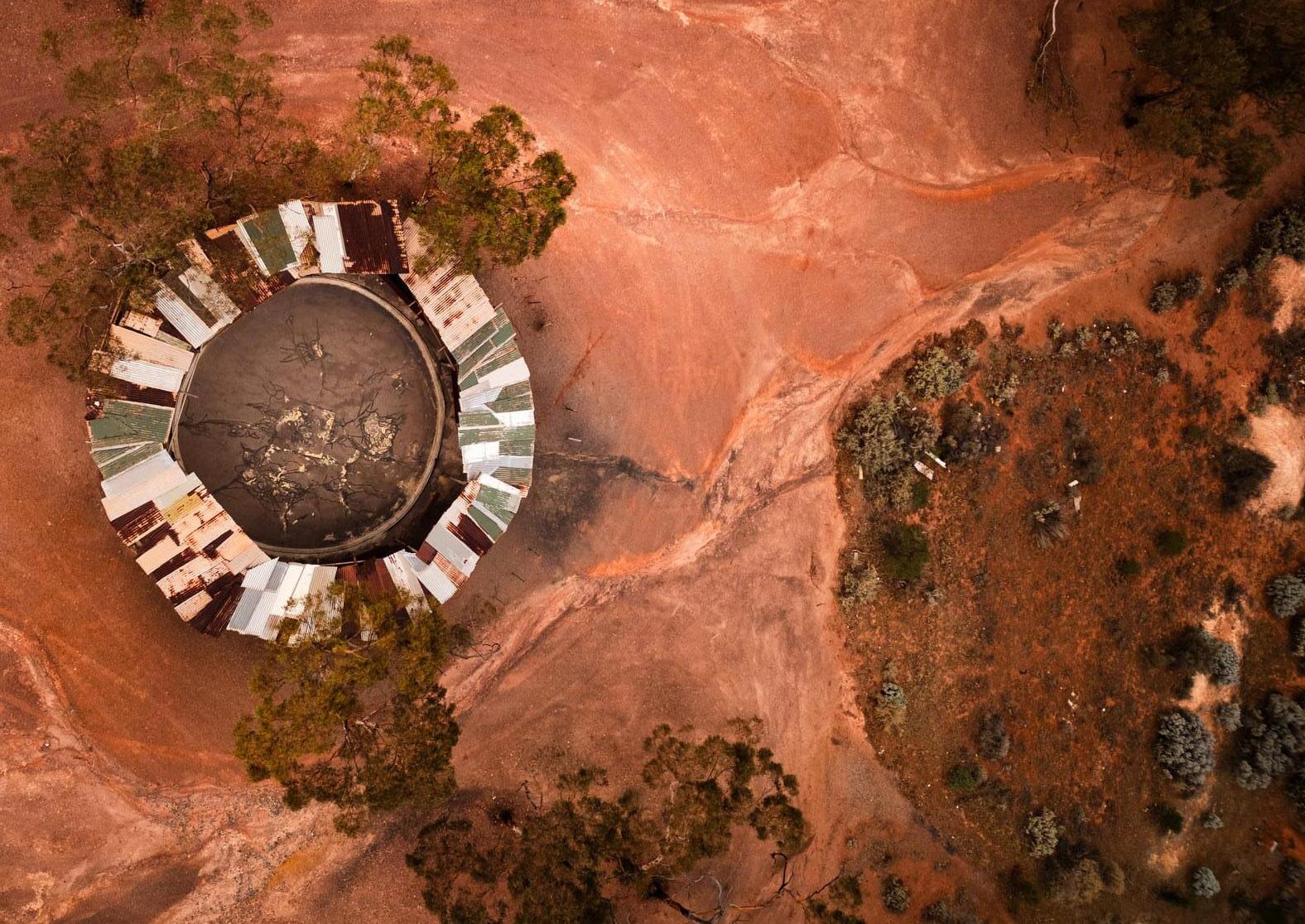
The GEDC fosters an environment of collaboration, for the benefit of the region, and works across government and industry to promote sustainable, vibrant, and liveable regional communities.
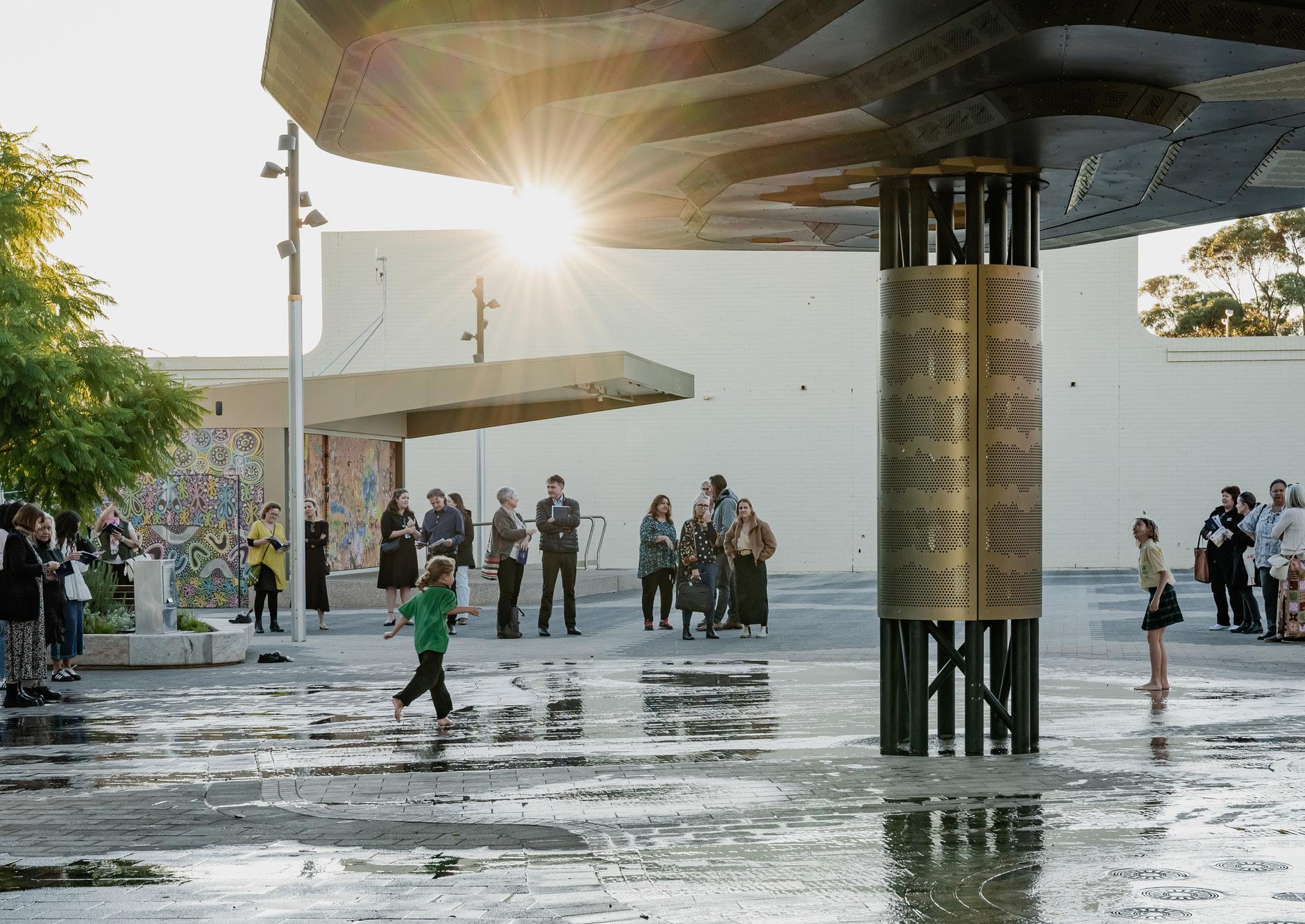
To achieve our Government goals, desired outcomes and key performance indicators, the GEDC prepares and implements a Strategic Plan.
The GEDC Strategic Plan 2022-24 provides strategic direction for the agency, setting out our approach to the delivery of regional development in the GoldfieldsEsperance region.
The Strategic Plan outlines key themes and strategies the GEDC will focus on to drive economic and social development for the Goldfields-Esperance region.
Our Strategic Plan 2022-24 identifies five strategic priorities underpinned by key initiatives to guide the agency’s operations and stakeholder interactions. Our achievements this year are presented in line with our strategic priorities.
AND INDUSTRY DEVELOPMENT
Grow existing, find and develop new, non-renewable resource and related industries.
INDUSTRY DIVERSIFICATION
REGIONAL LIVING
ABORIGINAL ECONOMIC DEVELOPMENT

Grow existing, find and develop new, other alternate industries.
Enhance regional living standards.
Enhance the economic participation of Aboriginal people.
ORGANISATIONAL EXCELLENCE
Excellence in all that we do.
The Goldfields-Esperance region has a wealth of mineral resources including those needed for renewable industries such as critical minerals and rare earths, as well as people with extensive skills, knowledge and experience in exploration, mining and mining services that will be used for the next generation of industry development.
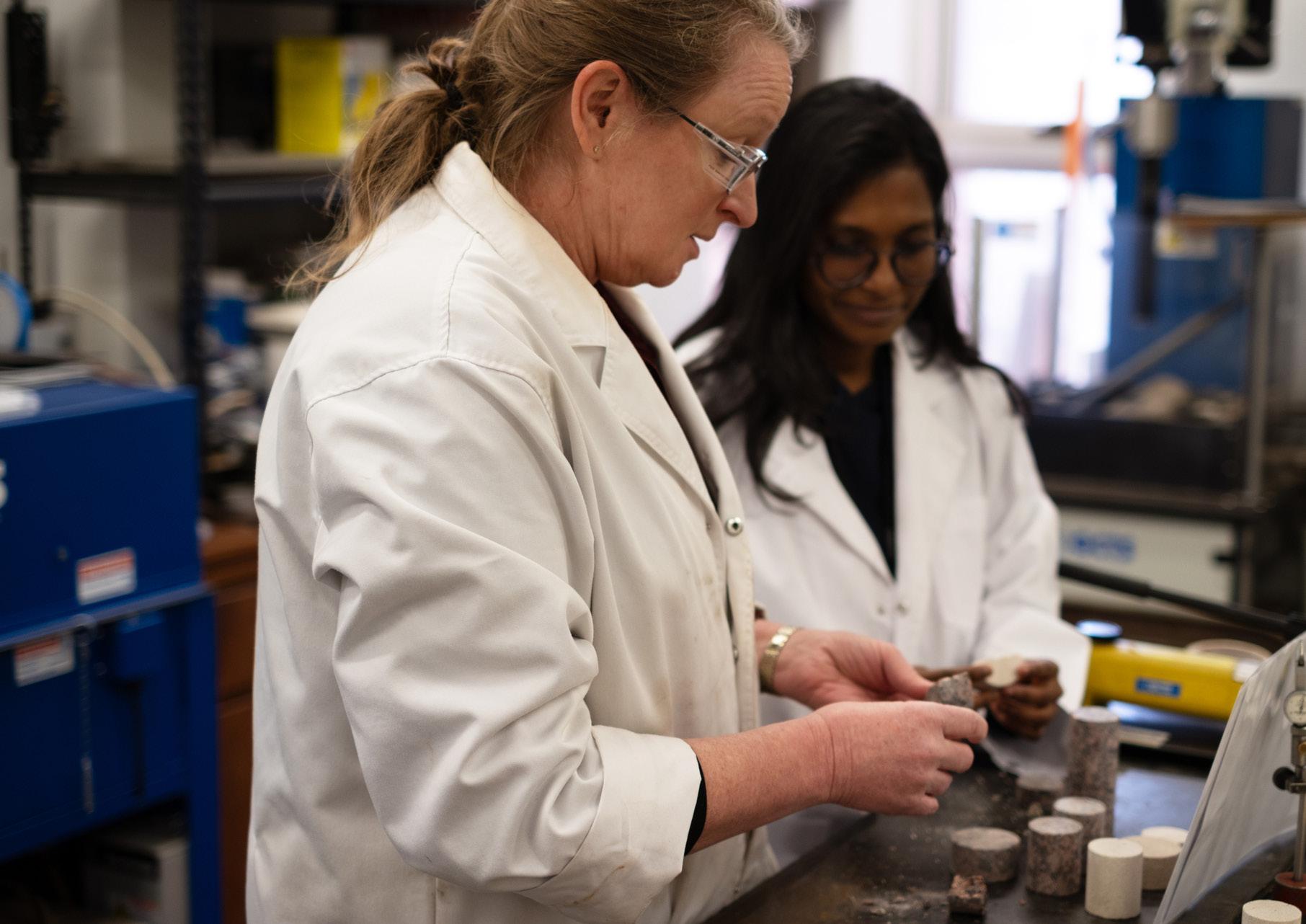
Accordingly, a key focus of the GEDC is to maximise the benefits from this thriving sector for the people who live and work in the region, build workforce capacity and resilience, and unlock new industry opportunities that support the longterm sustainability and diversity of the economy.
RESOURCE AND INDUSTRY DEVELOPMENT PRIORITIES
R1: Incentivise industries to have their employees living in the regions
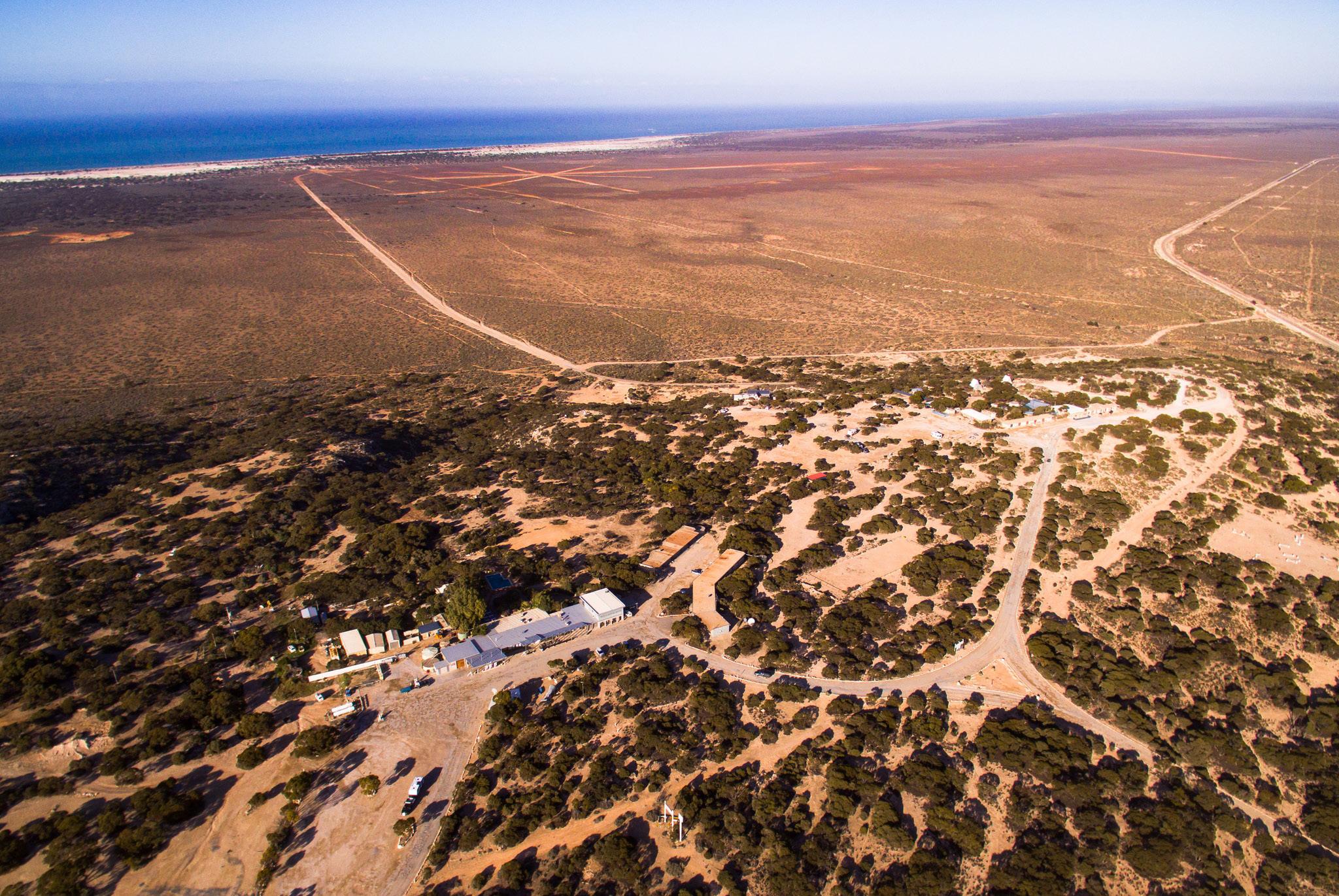
R2: Facilitate investment to attract people, jobs and skills
• Led Regional Economic Coordination Groups with industry and community stakeholders in Dundas, Ravensthorpe and Northern Goldfields, engaging with industry to support regional living.
• Hosted a “Meet the Buyer” event in Esperance, connecting local business with industry (page 28).
• Engaged with government and industry to facilitate industrial development in the region (page 26).
• Supported development of Goldfields industrial area activation with State agencies.
• Developed business case with the Shire of Dundas and Department of Transport to secure funding for new Eucla Airstrip.
• Developed business case and funding submission with the Shire of Esperance for Esperance Workers Accommodation proposal.
R3: Increase Aboriginal employment and business
R4: Advocate for policies that leverage industry’s social licence obligations and ensure practical fulfillment
• Worked in partnership with Tjiwarl Aboriginal Corporation and members through the State Government Indigenous Land Use Agreement (ILUA) to explore economic development opportunities (page 45).
• Supported employment and business events led by the Goldfields Aboriginal Business Chamber.
• Engaged with industry to inform and leverage social and economic development outcomes from new or expanding projects, including local supply and employment opportunities.
GEDC’s achievements this year are a result of foundational work undertaken with our partners over the last five years, leading to funding opportunities for the development of industrial land in 2023-24.
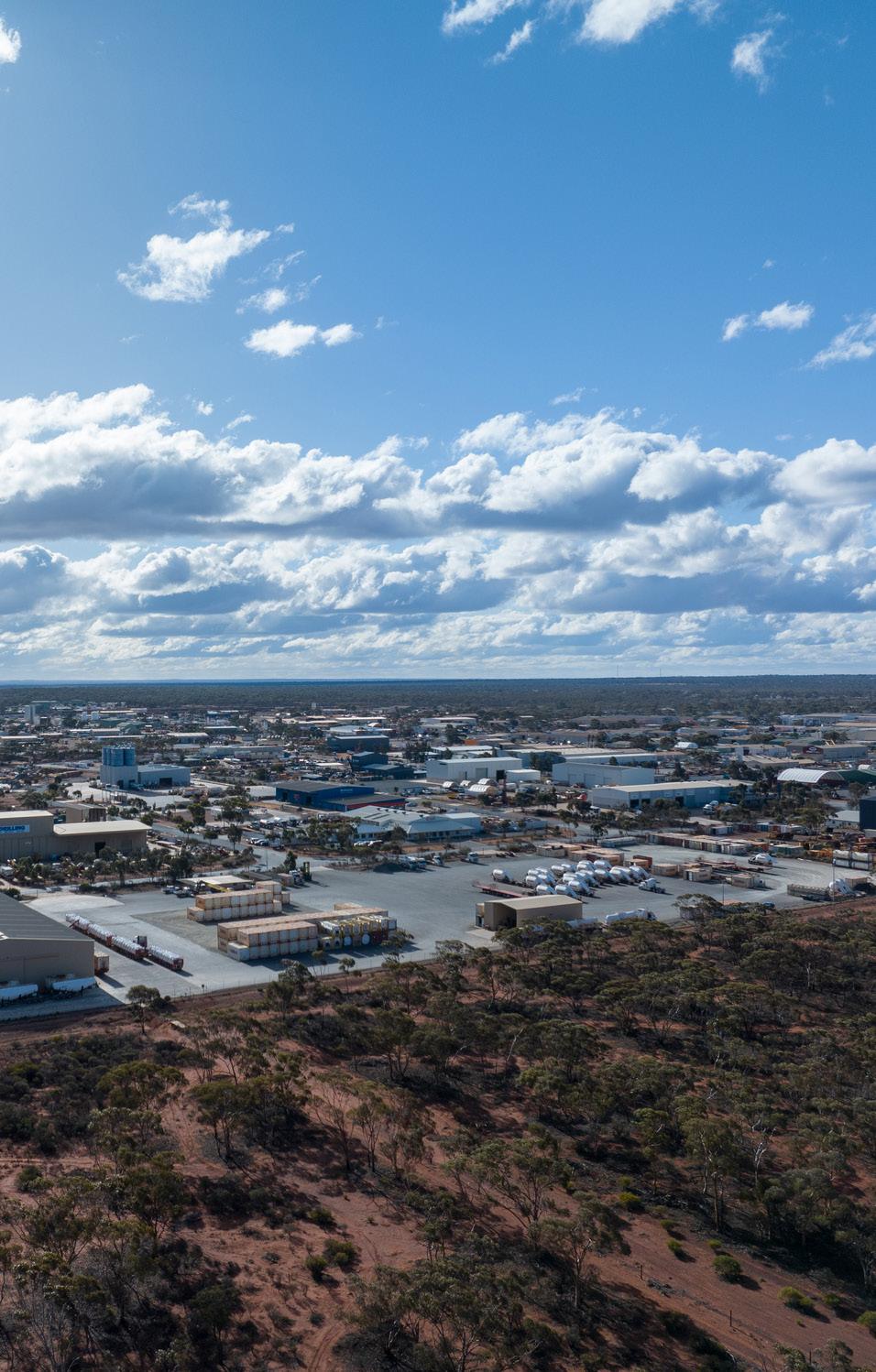
• Chaired three Goldfields Strategic Industrial Land Forum meetings with State and regional stakeholders.
• Participation in the State Government Goldfields Industrial Land Activation Group between May and October 2023.
• Met with a range of industry, GTE and government stakeholders about access to industrial land, industry needs and barriers and constraints to development.
• Hosted visiting agencies in the region to meet with industrial land stakeholders and visit development sites.
• Explored funding options to assist with industrial land development.
• Supported agencies to secure funding in the 2024-25 State Budget for $20.8 million to develop 22 industrial lots at Anzac Drive West.
• Supported agencies to secure funding in the 2024-25 State Budget for Mungari Strategic Industrial Area (SIA).
• Supported business case development with demand analysis and stakeholder engagement.
• Acted as facilitator between all levels of government to maintain a focus on industrial land development in the Goldfields at Anzac Drive West, Lot 505 and at Mungari Strategic Industrial Area (SIA).
Understanding the issue
Partnerships and collaboration
Building case for investment

In May 2024 members of the GEDC team visited communities across the GoldfieldsEsperance region to meet face-to-face with local business and organisations, deliver tender writing workshops and promote Goldfields-Esperance RED Grant opportunities.
Each of the State’s nine Regional Development Commissions has a Local Content Adviser – part of the Local Content Adviser Network – working to promote opportunities for regional business to supply goods, services and works to the State Government.
The GEDC’s Local Content Adviser (LCA) has strong local networks across industry bodies, small to medium enterprises and government agencies within and outside our region and engages with regional businesses in a variety of ways to connect them with tendering and contract opportunities.
tender writing workshops and one-on-one meetings with regional businesses in Kalgoorlie-Boulder, Leonora, Esperance and Ravensthorpe, over a two week period in May.
Topics covered at the workshops included:
• how to find government tender information
• understanding tender documentation and compliance requirements
• preparing a tender library to reduce time spent on tender responses
• how to write a compelling tender submission
Image: GEDC’s Regional Roadshow workshops at the Laverton Community Resource Centre
A key part of the LCA role is building the capability of regional businesses to tender effectively for government work. Throughout the year, the LCA met one-on-one with businesses at their premises, visited industry bodies, hosted events and forums and sent email communications about State Government supply opportunities and supported businesses with preparing for tendering and grant processes.
During 2023 and early 2024, the GEDC LCA engaged with local suppliers to ask if they had supplied to government previously and if not, why not. Consistent feedback received by the LCA from local suppliers included:
• There was a lack of visibility of government tenders and where to find information
• That tender processes were complicated and took a lot of time
• That their business was too small for a government contract so they hadn’t considered it
• That they couldn’t compete with Metropolitan based or bigger businesses
• To increase the success of Local Suppliers on government tenders.
To help address the above issues and assist with better promoting government tenders, the GEDC arranged a regional roadshow travelling around 1,500kms to deliver
• developing relevant case studies to support a tender bid
• the importance of asking for feedback if unsuccessful
The GEDC staff also delivered Regional Economic Development Grant workshops alongside the tender writing workshops and opportunities to meet one-onone with staff to discuss their projects and funding options.
The workshops were well attended with attendees asked to complete an evaluation form following the session. The average score for feedback about the tender writing session was 4.6 out of 5 (with 5 = excellent). The LCA will follow up with attendees over the next 12 months to review the impact of the workshop training and engagement on their businesses and tendering.
Meeting face to face with regional businesses in regional and remote communities has huge benefits – it builds meaningful connections and more positive perceptions of the role of government. It also builds local knowledge and capability leading to increased opportunity and economic benefit to local communities. The GEDC has a key role to play in the regions representing government ‘on-the-ground’, connecting people to the range of government opportunities available and demonstrating the value of regional suppliers to government.
In November 2023, GEDC hosted a “Meet the Buyer Breakfast” event in Esperance, to bring together local business and State and Local Government agencies. Local business is a significant employer in the regional economy. The GEDC plays a key role, through the State’s Local Content Adviser Network, in connecting local business with supply and procurement opportunities in Government.
Image: State and Local Government representatives at the ‘Meet the Buyer Breakfast’ in Esperance
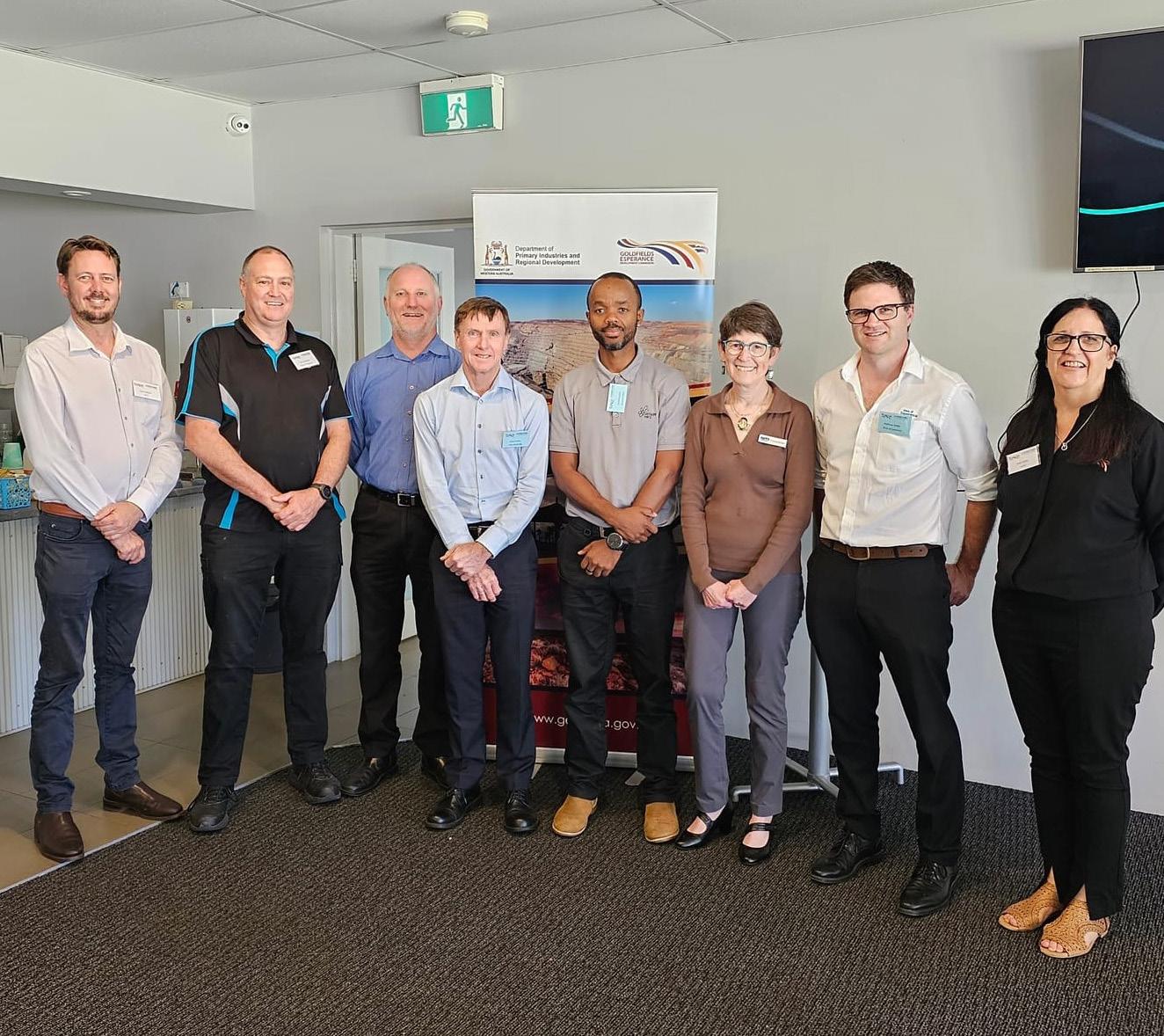
The GEDC and its Goldfields-Esperance Local Content Adviser hold regular meetings, events and forums across the region, to promote opportunities for regionally based businesses to tender for contracts to supply works, goods and services to State Government.
Supporting the purchase of works, goods and services from local businesses in regional WA, known as ‘Local Content’, is promoted through the WA State Government Buy Local Policy, which is designed to ensure regional businesses benefit from the billions in annual spending on infrastructure works and community services by the State Government, and local communities experience a range of flow-on effects and benefits too.
The stimulus for the Meet the Buyer event was to understand how local businesses could be better supported to tender for work with government, and introduce them to key government contacts in the region.
The ‘Meet the Buyer’ event was held to introduce local businesses in Esperance to government buyers and to increase local awareness of government procurement processes, including weightings which benefit local suppliers, making their bids more competitive. The Local Content Adviser promoted the event to many local businesses working closely with the Esperance Chamber of Commerce and Industry and the Shire of Esperance.
Over 50 people attended the event to receive presentations from Shane Power, Director Goldfields-Esperance Region at Main Roads WA, Mathew Walker, Director Asset Management at the Shire of Esperance and David Mureithi, Procurement Specialist from Southern Ports, about their pipeline of works, future contract opportunities for local businesses and what steps they could take to register for procurement updates and information.
South Regional TAFE, WA Country Health Services and WA Police also attended the event to meet and network with local businesses and to share the wide variety of contracts and tender opportunities on offer through the government - from construction to landscaping, photography, furniture, cleaning contracts and many more.

Esperance’s
‘Meet the
Events like this provide opportunity for local business to share their thoughts with State agencies about the perceptions and potential barriers to securing work through government. On the day, feedback from business included a lack of information about how to find out about contract opportunities, that businesses thought they were too small to apply for government work or were worried they couldn’t compete with larger or metropolitan based organisations. Many businesses hadn’t considered working with government so this event helped to provide information about what these opportunities could be and how someone new to tendering, could start looking for work with government.
Buyer’
event introduced local businesses to government buyers and opportunities in the region
At the start of the event, a poll of attendees identified over 70% had not worked with Government agencies previously. The Goldfields-Esperance
Local Content Adviser maintained contact with businesses attending this and similar events through the year and proactively reached out to connect businesses with specific government contacts and to provide information about State Government tender and supply opportunities by phone, in person meetings and by email.
The Local Content Adviser also engaged about training opportunities to help businesses such as the GEDC tender writing training held in April/May 2024.
Many of the businesses attending had a product or service offering relevant to the government requirements and after the event, the Local Content Adviser provided support to businesses attending, to take the next steps in supplying to government.
The aim of the event was to better understand local business perceptions and experiences of working with government – or why they haven’t yet worked with government – to provide information to help access government tenders more easily. Information was provided to attendees to make the process of working with government more readily understood, and they were
introduced to the Local Content Adviser and other government procurement leads in the room to discuss supplying to government. With many tens of connections made at and following the event, Meet the Buyer was a great success.
GEDC will continue to engage and support local businesses and track their interactions with government supply processes in coming years, to improve feedback on government policy and processes for local content and to understand the flow-on impacts of businesses tendering and securing contracts within the region.
The Goldfields-Esperance region has significant potential in renewable industries and opportunities in emerging non-resource sectors.

Diversification from resource-based industries presents an opportunity to prepare against economic and market shocks commonly associated with ‘boom and bust’ resource sector cycles. A diversified economic profile is linked to attracting and retaining new populations, and providing a range of meaningful, well-remunerated job opportunities.
D1: Advocate for digital infrastructure to enhance regional and remote living and capture highly skilled businesses and workforce
D2: Support renewable energy projects in the region, leveraging benefits for the State and local communities
• Contributed to State Government’s response on issues impacting telecommunications in regional WA.
• Participated in identifying and prioritising mobile black spot areas for Australian Government funding programs.
• Partnered with Local Government through GVROC Regional Climate Alliance on climate adaptation and mitigation projects.
• Engaged with renewable energy proponents investigating or planning projects in the region.
• Supported DJTSI and Mirning Traditional Lands Aboriginal Corporation (MTLAC) in engagement with the Western Green Energy Hub (WGEH) project.
• Participated in several workshops, including a site visit to Eucla in September 2023 as part of a study to understand the cultural values and opportunities relating to the WGEH project.
• Assisted MTLAC to build better relationships between State Government entities, MTLAC and WGEH.
D3: Capture opportunities from the emerging ‘low carbon’ economy
D4: Facilitate streamlined land use planning and industrial land assembly
• Participated in the Regional Development Portfolio’s collaborative Low Carbon Futures Network.
• Met regularly with DPLH on land use, planning and development matters.
• Chaired the Kalgoorlie-Boulder Land Group with key stakeholders and government agencies.
• Monitored progress of land and development projects.
• Contributed to planning for Goldfields and Esperance industrial land activation.
• Advocated across government for strategic land infrastructure and development.
D5: Advocate for infrastructure that supports critical services and supply chains
D6: Identify and support energy and water solutions
D7: Influence Government policies that enable and lead to regional investment and business development
• Implementing Kalgoorlie Rail Realignment Project, including delivery of Stage 1 Current State Assessment Report (page 32).
• Supported business case development for Eucla Airstrip.
• Project planning, research and engagement on the Goldfields-Esperance Drought Resilience Plan (page 34).
• Chaired the Goldfields-Esperance Water Security Group driving innovative solutions to water security.
• Facilitated the Local Content Program, gathering regional intelligence to inform local supply opportunities and procurement processes.
• Attended and supported State and Australian Government agencies to undertake consultation and engagement in the regions such as the DJTSI Ten Year Science and Technology Plan and Commonwealth consultations on housing and homelessness.
• Met with a wide range of visiting Government agencies and industry bodies within the region to provide briefings and facilitate introductions to regional organisations, to better inform development and roll out of government policy, programs and initiatives.
D8: Promote entrepreneurship and innovation into regional sectors
D9: Grow regional visitation and foster creative industry development
• Supported regional business and industry groups with a range of events and programs including the KBCCI Business Awards, Business After Hours, The Commerce Hub, ‘What’s Down the Track’ Forum and GABC Trade Forum.
• Built relationships with facilitators, educators, and funders of innovation to promote and connect regional opportunities.
• Coordinated the Regional Development Portfolio’s Creative Industries working group.
• Connected regional arts organisations with sponsorship and strategic partnership opportunities.
• Provided regional intelligence and consultation input into the Museum of the Goldfields Redevelopment proposal.
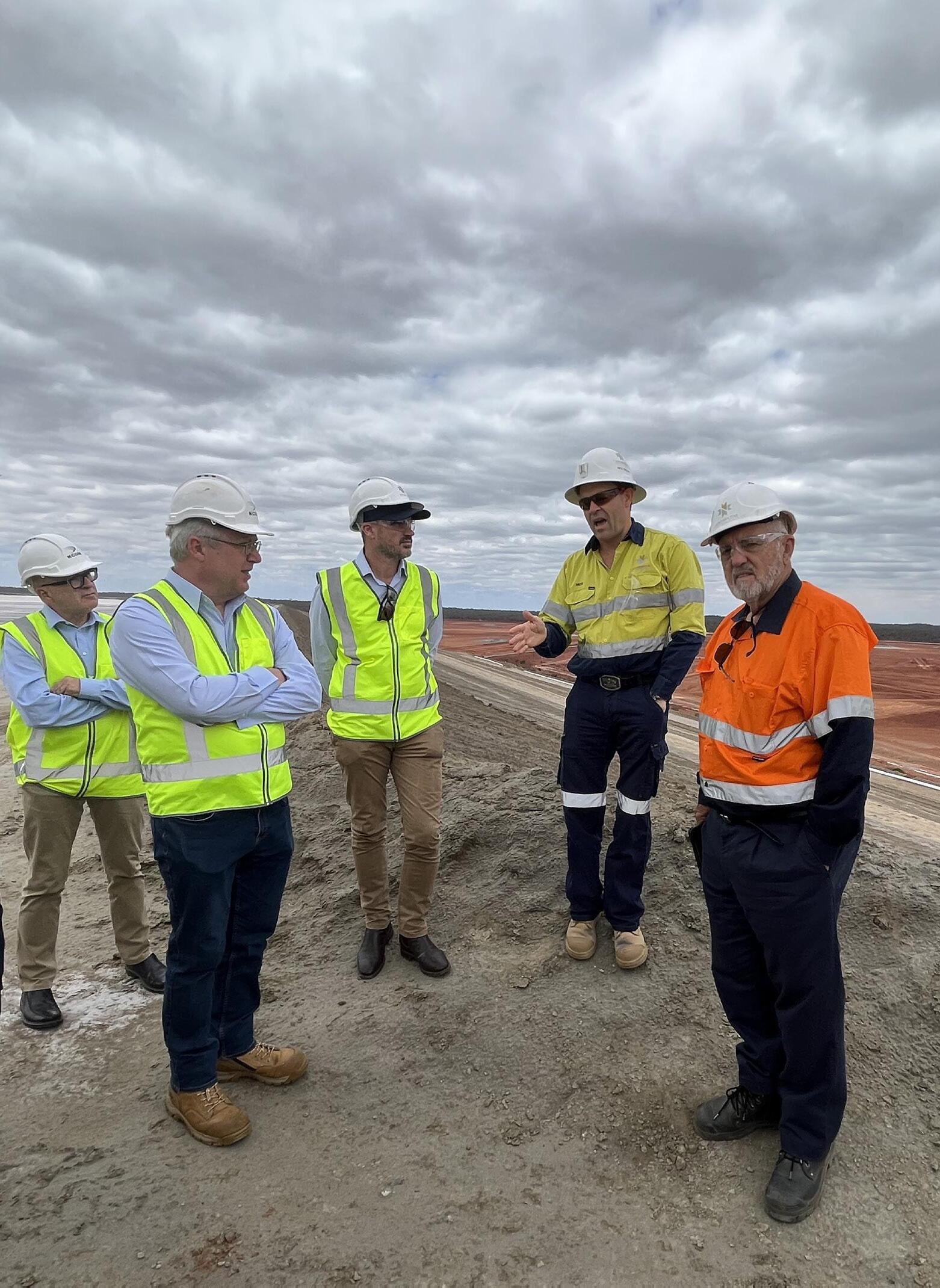
From a National and State rail and freight perspective, the City of Kalgoorlie-Boulder is strategically located with the National east-west rail line running through the City (to Perth), and the Northern Goldfields line (running north to south) intersecting the east-west track in the heart of the City.
The Kalgoorlie Rail Realignment Project (KRRP/the Project) is a Detailed Business Case (DBC) for the realignment of the east-west rail track and proposal for a new Intermodal Terminal (IMT) in Kalgoorlie-Boulder.
The potential outcomes of the KRRP are viewed as essential enabling infrastructure development for the region.
Rail and IMT infrastructure being investigated through the DBC could provide enduring benefits in freight efficiencies, road and rail safety, urban amenity, and unlock significant economic opportunities for Kalgoorlie-Boulder, the Goldfields, and enhance regional contributions to Western Australia.
Featured in planning strategies and frameworks since at least 2000, more recent studies exploring the KRRP concepts include the 2012-15 Portlink Project and the Kalgoorlie Rail Realignment Preliminary Business Case (PBC) 2018-19.
The Portlink Project commissioned by the Department of Transport (DoT) involved a series of interrelated planning studies that sought to link Port Hedland, Kalgoorlie-Boulder, Esperance and Geraldton and included road, rail and IMT projects.
The PBC, led by the City of KalgoorlieBoulder, Northern Star Resources and local stakeholders focused on the Kalgoorlie-Boulder area for rail and IMT outcomes. The GEDC supported these studies as a key regional stakeholder.
While all studies sought to identify the commercial viability of investing in a significant infrastructure project such as a rail realignment, or development of a new IMT through reference to consistent increases in rail freight, road to rail interests, warehousing possibilities, and new industries, the PBC recognised that releasing land for resources development could enable the investment proposition.
Responding to the findings of the PBC, the Australian Government committed $2 million towards a DBC for the KRRP in 2021 through the National Partnerships Program, State Government provided a $0.5 million contribution, secured by the GEDC.
GEDC was appointed the lead agency for the Project with support from DPIRD, DoT and the Public Transport Authority (PTA).
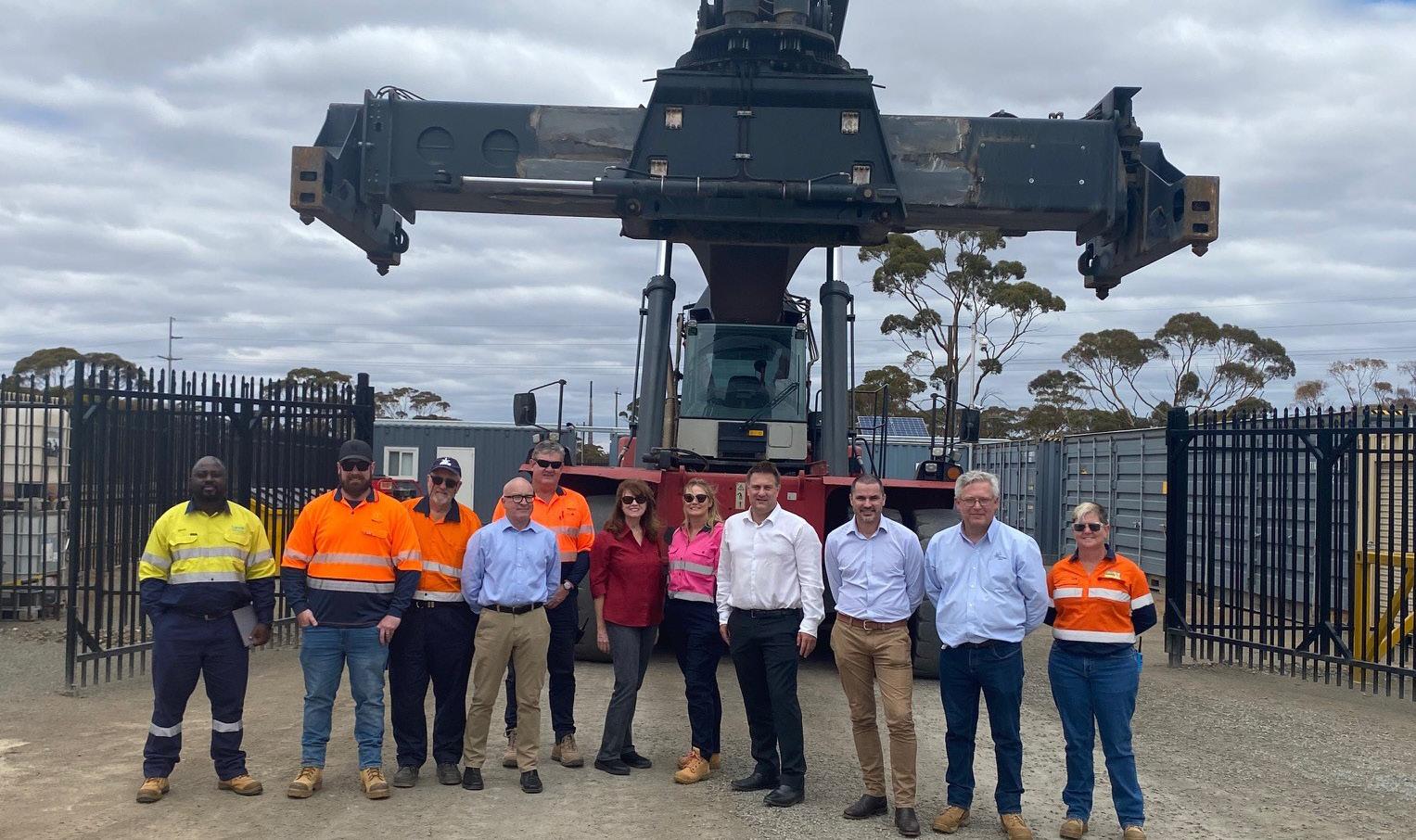
GEDC established governance for the KRRP in 2023, with a Steering Group of agencies comprising Local, State and Australian Government membership, meeting monthly and then bi-monthly during the financial year.
A Senior Officers (technical) Working Group has also been established to support delivery of the DBC. The KRRP Project Current State Assessment Report was completed in September 2023 to set the context for the project.
Investment Logic Mapping was facilitated with key stakeholders in late 2023 by the GEDC and Western Australian Treasury Corporation in Kalgoorlie-Boulder. These project activities have informed project planning and development of the Statement of Requirements for the studies and DBC.
A scope of works for consultancy services to support delivery of the KRRP DBC progressed through the State Government tender process in April 2024, with the KRRP DBC consultancy contract anticipated to be awarded in July.
The KRRP DBC will include freight and supply chain analysis, land use assessment, examine rail realignment and IMT options, understand costs, benefits, risks, financial and ownership models and provide a business case for the optimum infrastructure proposal/s.
The KRRP Detailed Business Case will include freight and supply chain analysis, land use assessment, rail and IMT options, cost-benefit analysis, development models and financial analysis for preferred infrastructure proposals.
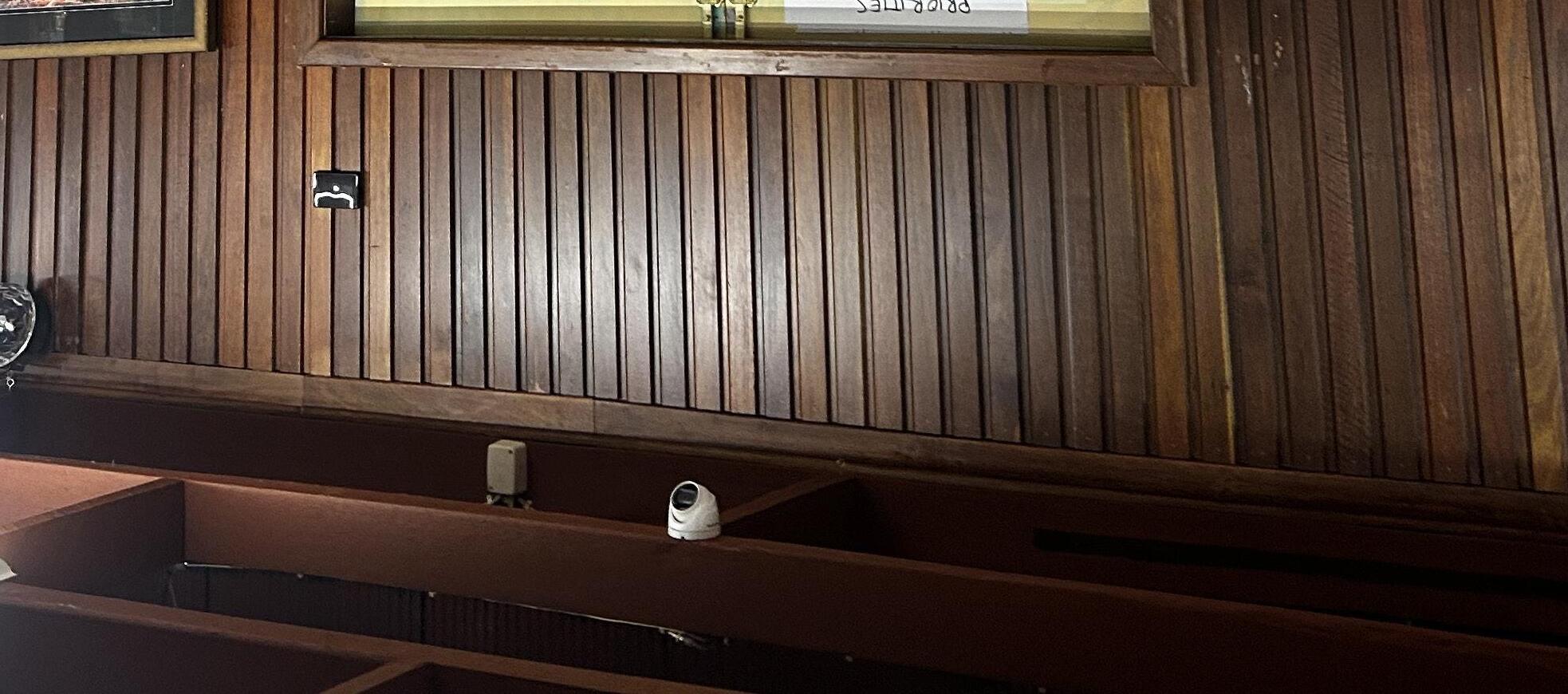
Identifying practical solutions to achieve water security is the focus of a new program for the region. The GoldfieldsEsperance Development Commission was successful in obtaining funding to plan and prepare for future droughts.
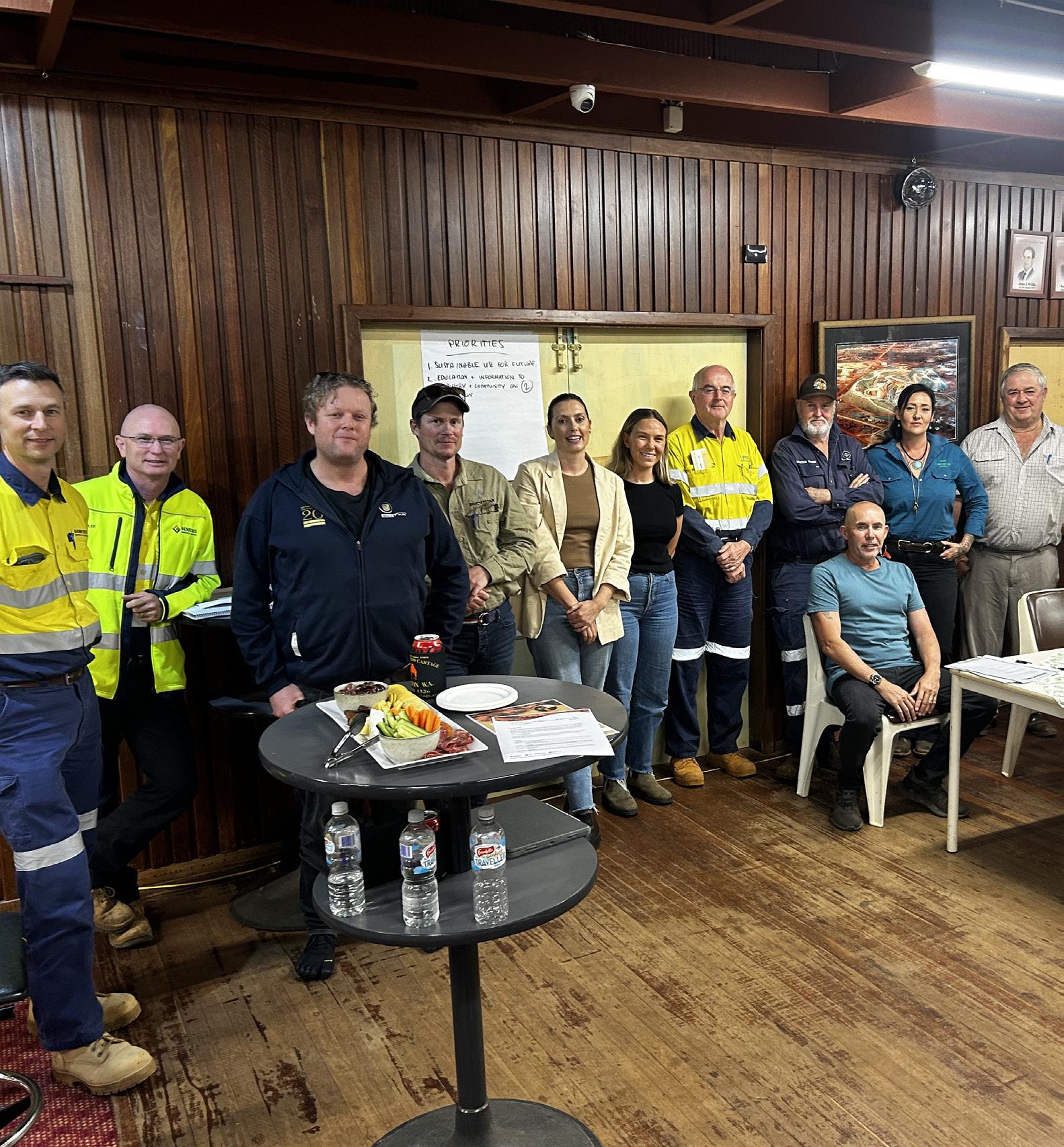
With a low population density across a vast area, and a largely arid area, water access and supply has been identified by stakeholders across the region as the primary climate vulnerability for Goldfields-Esperance communities and industries.
To address issues around water security, the GEDC, along with the Goldfields Voluntary Regional Organisation of Councils (GVROC), Department of Water and Environmental Regulation and the Water Corporation, formed the GoldfieldsEsperance Water Security Group (GEWSG).
Endorsed by Minister for Water, the Hon. Simone McGurk, and chaired by the GEDC, the GEWSG is working to identify proactive solutions to water security issues and opportunities.
In September 2023, the GEDC was successful in its Expression of Interest to participate in the Regional Drought Resilience Planning Program (RDRP), which is funded jointly through the Australian Government’s Future Drought Fund and DPIRD. Developed with oversight from the GEWSG, Goldfields-Esperance Drought Resilience Plan, will provide a coordinated approach to building drought resilience in the Goldfields-Esperance region.
The GEDC has developed a project plan and scope of works for consultancy services to support the project, and undertook a tender process during MarchJune 2024. It is expected that a consultant team will be appointed in July 2024 to support the GEDC with technical elements of the project such as drought vulnerability assessments and mapping.
The plan will have a strong focus on water security and aims to understand drought and water related threats impacting communities and industries across the region. It will also assess the current water assets, their vulnerabilities and the actions needed to make water resources fit-for-purpose.
A key aspect of the RDRP program is stakeholder engagement, and during this financial year, GEDC staff have visited communities and Local Governments from Hopetoun through to Laverton, meeting with almost 100 stakeholders and travelling over 3700km.
Work on the RDRP will be continuing throughout 2024, with the final plan released for public comment towards the end of the year.
Capturing input from stakeholders across the region is crucial to ensuring the Regional Drought Resilience Plan reflects localised vulnerabilities and opportunities, and that the actions identified meet the region’s needs. The final plan will assist with attracting investment into actions that build the climate resilience of the region.
21 May 2024
Shire of Dundas Consultation Workshop
29 May 2024
Pakaanu Aboriginal Corporation (at Laverton) Consultation Meeting
Shire of Leonora Consultation Meeting Community of Leonora Consultation Workshop
28 May 2024
Shire and Community of Laverton Consultation Workshop
GEDC staff have commenced engagement on the RDRP, visiting communities and Local Governments from Hopetoun through to Laverton, meeting with almost 100 stakeholders and travelling over 3700km during January - June 2024.
11 communication materials
(including webpage, e-news articles, social media posts, 5 x factsheets, presentations and surveys)
16 formal consultations
(workshops or meetings with the purpose of understanding stakeholders perspectives)
4 June 2024
Shire of Ravensthorpe Consultation Workshop
30 May 2024
Shire of Menzies Consultation Meeting
18 June 2024
Goldfields Pastoralists Consultation Workshop (Online)
6 June 2024
City of Kalgoorlie-Boulder Consultation Meeting
(meetings to share information, to inform the delivery of the project) 28 briefings
26 June 2024
Northern Mallee Farm Improvement Group Consultation Workshop (Salmon Gums)
24 June 2024
Community of Ravensthorpe Consultation Workshop
Shire of Wiluna Consultation Workshop (Online)
27 June 2024
SEPWA Consultation Meeting (Gibson)
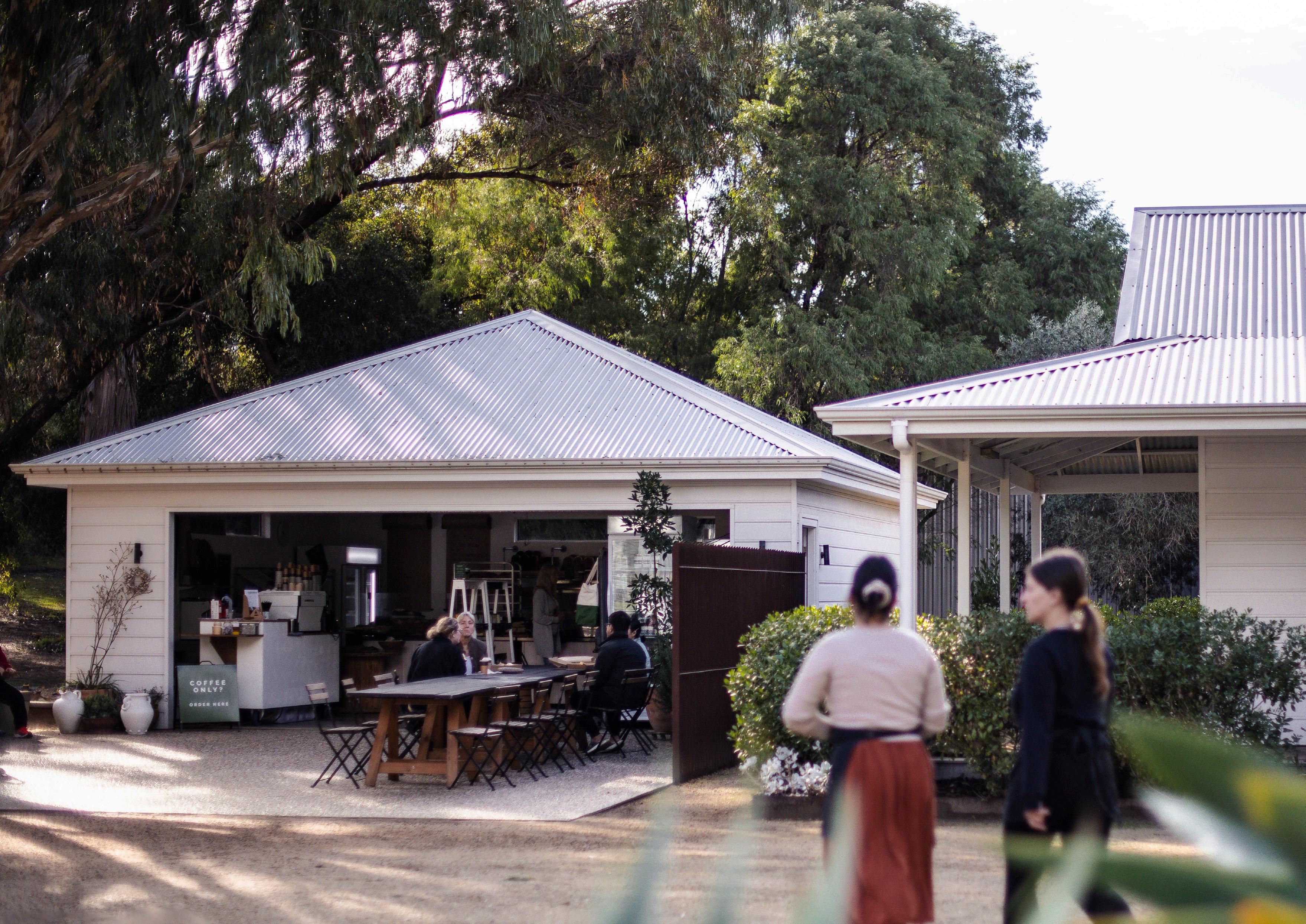
Access to quality services is key to enhancing liveability and maintaining and growing regional populations. Ensuring regional residents have high levels of wellbeing and economic development opportunities, particularly in the form of meaningful employment, contributes to both the liveability and sustainability of our communities.
The GEDC is uniquely positioned to understand the diverse needs and challenges experienced by communities across the region and advocate for place-based, innovative solutions. For the Goldfields-Esperance region, the GEDC is focused on enhancing liveability and repositioning the perception of the lifestyle opportunities across the region.
• Chair and active member of the District Leadership Group, providing advice and support for on-ground responses to local issues and opportunities. In 2023-24, the group supported the Summer Response Strategy as well as the DV Steering Group. The Group visited Norseman for their meeting in May, providing an opportunity to hear from the Shire of Dundas and visit key projects and initiatives.
• Supported the formation of the Warburton District Leadership Group Subcommittee with a focus on programs and initiatives in the Ngaanyatjarra Lands.
• GEDC worked closely with the Shire of Dundas, Main Roads WA and the Department of Transport to develop the Eucla Airstrip project business case. Funding of $3.3 million was allocated to reseal the Eucla Airstrip through the 2024-25 State Budget.
L1: Advocate for service levels in regions to be comparable to the metropolitan area
• Member of the Regional Coordination Committees for both Esperance and the Goldfields. In partnership with the Department of Training, Workforce Development, this group has focused on strengthening education and pathways to employment in the region, and coordinating stakeholders and activities to do this.
• Worked with State agencies and private ECEC providers to develop new initiatives, new models of ECEC collaboration and resourcing and funding submissions.
• The GEDC Chair attended several emergency and follow up meetings and undertook liaison between key stakeholders and agencies during and following the major power cuts in the Goldfields region in January 2024.
• Supported the KBCCI Activ8 program – a series of events and initiatives held over autumn and winter months, in the Kalgoorlie CBD, to reinvigorate retail and business patronage in the City Centre and bring people into newly completed park and public spaces.
• GEDC supported WAPOL with funding to provide a program of youth summer activities in the Ngaanyatjarra Lands over the school holiday period.
• Facilitated support to Shire of Ravensthorpe for economic recovery following the closure of mining operations and loss of jobs and local contracts in 2024. This included arranging meetings with the Minister for Regional Development and other Ministers and State Government agencies to progress recovery assistance and initiatives.
• GEDC provided financial assistance to the Shire of Ravensthorpe towards the Hopetoun Foreshore Masterplanning and Upgrades project to enable economic diversification into tourism.
• GEDC provided financial assistance to the Fitzgerald Business Network to support increased employment and local business support for the closure of mining operations.
• Focused on engagement with the ECEC sector and providers across the region with regular meetings and referrals between other local and Australian Government agencies. Funding a professional development workshop and training series for Esperance and planning for similar professional development for Kalgoorlie-Boulder and Northern Goldfields providers.
• Chaired the Kalgoorlie-Boulder Land Group and engaged with a range of housing and land stakeholders including Local Government, State Government agencies, community housing providers and project proponents to monitor and advocate for housing and land investment, explore new housing projects and program pilots and funding options.
• GEDC staff attended Business After Hours and other similar local business events in Kalgoorlie-Boulder, Esperance and Ravensthorpe and visited businesses and stakeholders in other remote centres across the region to engage with business and community stakeholders.
• Regular attendance at local and regional stakeholder meetings including the Kalgoorlie-Boulder City and Regional Meetings hosted by the KBCCI to provide GEDC and State Government program and funding updates.
• Provided funding for community events including the Taste of the World multicultural festival and funding for Live Music event with regionally based Aboriginal artists from the Ngaanyatjarra Lands, in Esperance.
With access to affordable child care an important driver of liveability, as well as an enabler of economic participation, the GEDC has continued efforts to support the Early Childhood Education and Care (ECEC) sector.

During the past year, the GEDC has focused on practical, on-the-ground measures of support for the Goldfields-Esperance ECEC sector, in conjunction with continued advocacy across Government.
In mid-2023, the GEDC worked collaboratively with stakeholders to hold industry roundtables in both Kalgoorlie-Boulder and Esperance. The roundtables identified a number of key issues and a localised action plan was refined and agreed upon.
With the support of industry and other agencies, GEDC has taken the lead in progressing a number of Early Childhood Education actions.
Both roundtables uncovered that there was limited availability of professional development opportunities in the region, and that access to any available professional development was stifled by chronic staff shortages. Travel and the cost of bringing experts to the region were identified as significant barriers. To support the sector and its staff, GEDC organised and funded a series of collaborative professional development workshops, which saw experts from across the State travel to the region to deliver group and individual support to the ECEC sector.
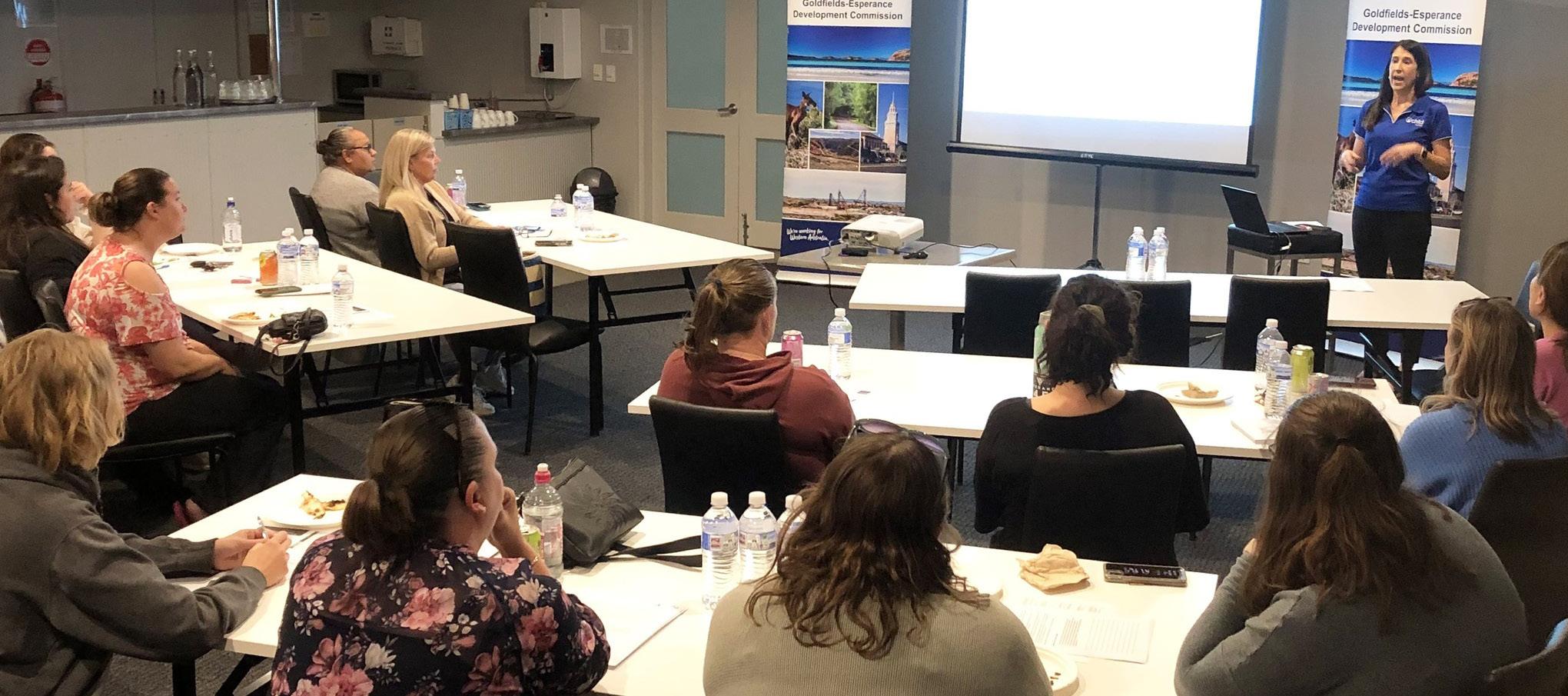
The first professional development workshop, held in Esperance in March, brought together educators from every ECEC centre in Esperance, with educators also travelling from Ravensthorpe and Hopetoun to attend.
Building partnerships and collaborating across the sector has been crucial to supporting the Early Childhood Education and Care sector through practical solutions.
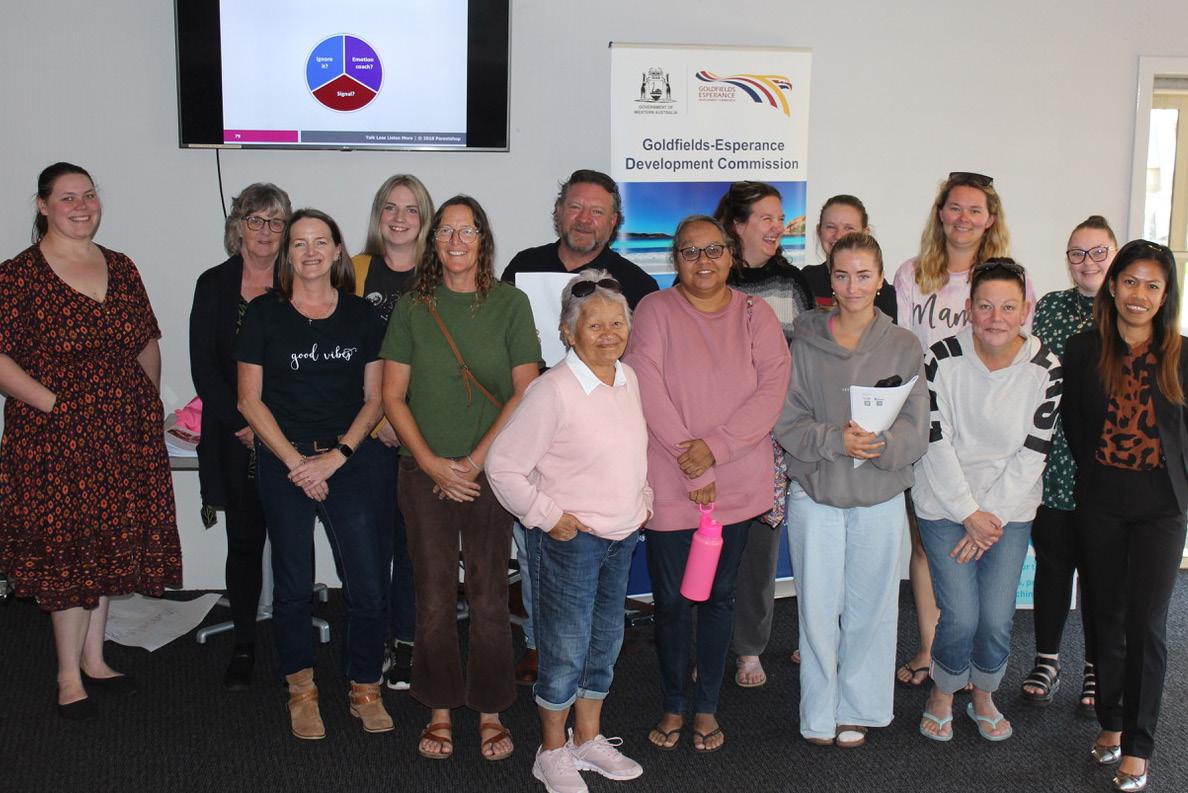
To date the GEDC has provided more than 40 hours of free professional development to ECEC educators in the Goldfields-Esperance region.
A second Esperance workshop, featuring a child behaviour specialist, was held in May and included on site support in centres in both Ravensthorpe and Hopetoun.
Workshops for Kalgoorlie-Boulder and the Goldfields have been arranged for July 2024. The need for a framework for future sector collaboration and information sharing was also identified through the roundtables.
In collaboration with the Employment Facilitator from the Esperance Local Jobs Taskforce, the GEDC held an Early Childhood Educators Forum in June to provide an avenue for the ECEC sector to plan joint initiatives and provide coordinated feedback.
Participants at the forum provided direction for future initiatives to support the sector and indicated that building relationships across the sector and community were a priority.
During 2023-24, the GEDC supported a number of initiatives from Local Governments and not-for-profits aimed at building capacity in the sector. This included supporting a successful $1 million application for funding from not-for-profit provider Regional Early Education and Development Inc. (REED). The funding will enable REED to expand their wrap-around services to Goldfields-Esperance to support ECEC providers’ sustainability.
Now in its second year, the Goldfields-Esperance Arts and Culture Gathering took place in Kalgoorlie-Boulder in June, organised by the GEDC and ArtGold Inc.
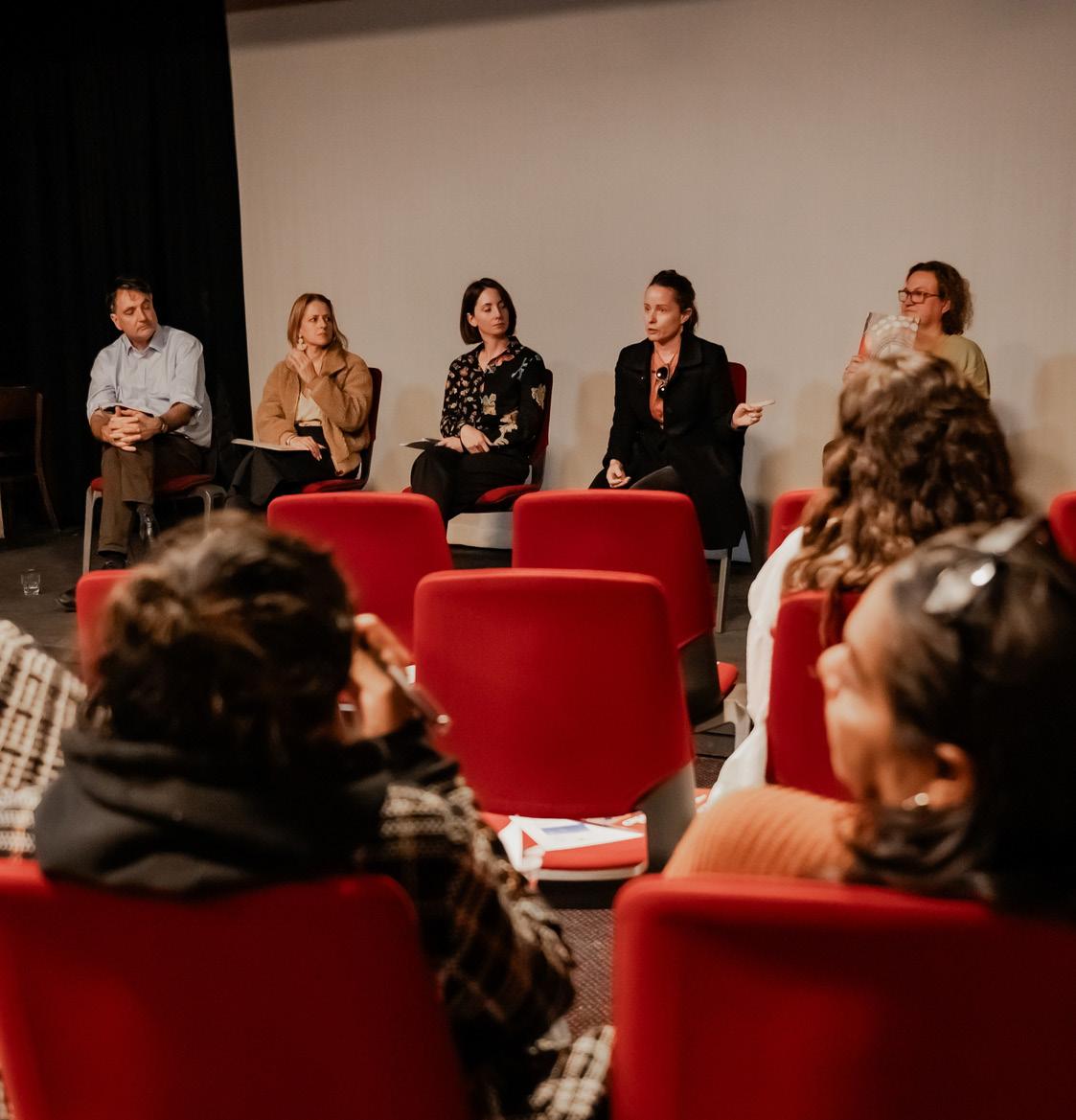
The gathering bought together representatives of arts organisations from across the region including Ravensthorpe Raveaboutarts, the Cannery Arts Centre and Esperance Community Arts, Kambalda Cultural and Arts Group, Judumul Aboriginal Corporation, ArtGold, Walkatjurra Art, Tjuma Pulka, Golden Mile Art and Tjukurba Art Gallery.
This event provides an opportunity to showcase and share the work of arts organisations from across the region and the important role they play in enhancing regional livability, fostering community engagement, and driving economic prosperity.
Kicking off the two-day event was an inaugural local screening of “Gravel Road,” a documentary spotlighting the Desert Stars from Tjuntjuntjarra, acclaimed as the most remote rock band in the world. The film achieved international acclaim, winning the Best Documentary Feature title at the Poppy Jasper Film Festival in California and securing the Best Road/Tour Movie accolade at the Sound on Screen Music Film Festival in South Africa.
Event attendees were treated to a number of inspiring presentation and panel discussion sessions over the two days, with a focus on celebrating the nationally significant contributions that Goldfields-Esperance projects and artists make to the arts and culture sector.
One of the highlights was the presentation from John Clark from FORM who spearhead the project delivery of the acclaimed GIANTS of Mandurah arts installation. This grass-roots arts project transformed key location across Mandurah, delivering significant artistic, cultural and economic benefits.
Travelling from Adelaide, Dr Scott Cane, renowned Anthropologist/Archeologist shared his first-hand experience of the first Native Title claim for mainland Australia (after the Mabo decision). He had attendees on the edge of their seats as he shared his knowledge, wisdom and experience about Aboriginal cultural heritage, community life and relations to land.
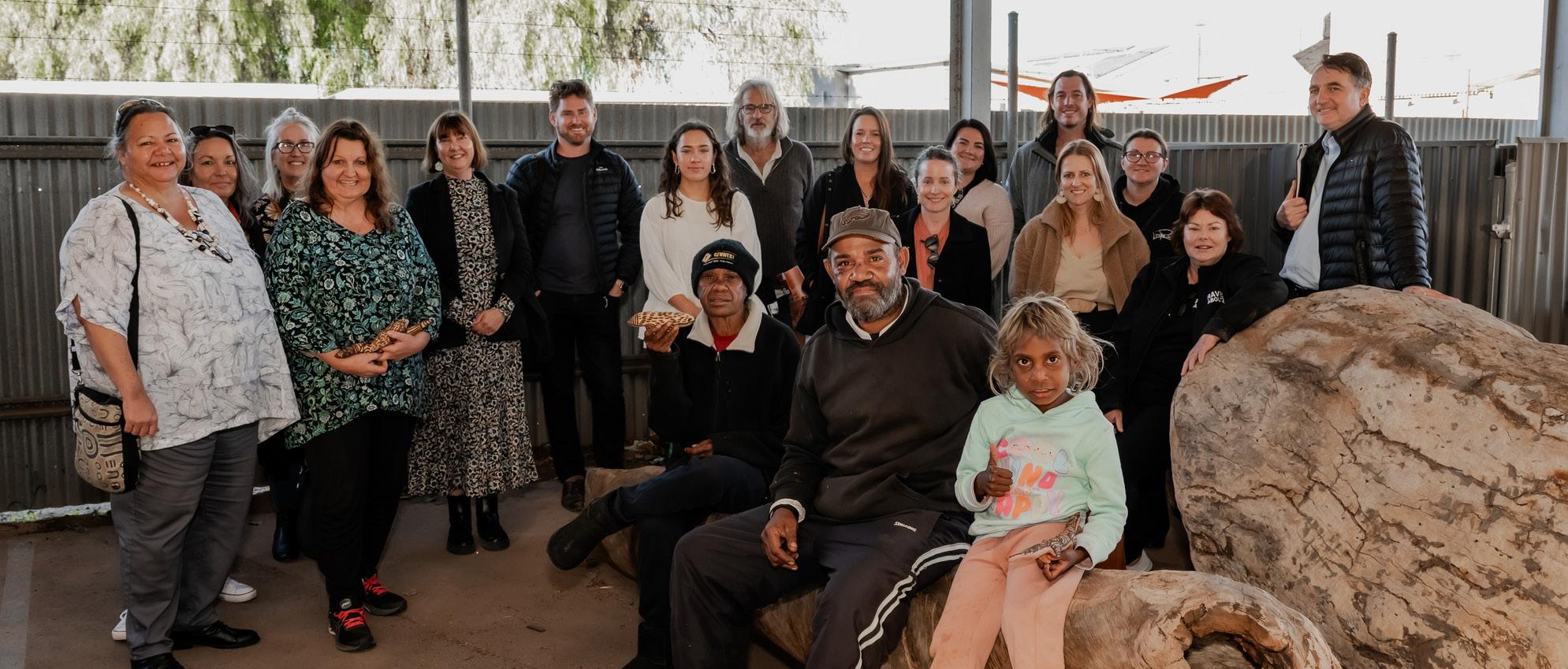
Gathering 2024 not only celebrated artistic excellence but also strengthened our collective resolve to nurture and amplify the arts within our region.
Throughout the gathering, participants spent time engaging, informing and collaborating on a range of arts and culture related themes, sharing innovative and creative ideas.
The formal proceedings were followed by a networking evening attended by the Director General of the Department of Local Government, Sport and Cultural Industries and a range of government, not-for-profit, and cultural industries representation.
Part of the GEDC’s role in leading the organisation of this event is to build capacity of local organisations and networks to take over the coordination of future events and regular communications. GEDC looks forward to building on this foundation as the region continues to harness the transformative power of creativity for our communities and beyond.
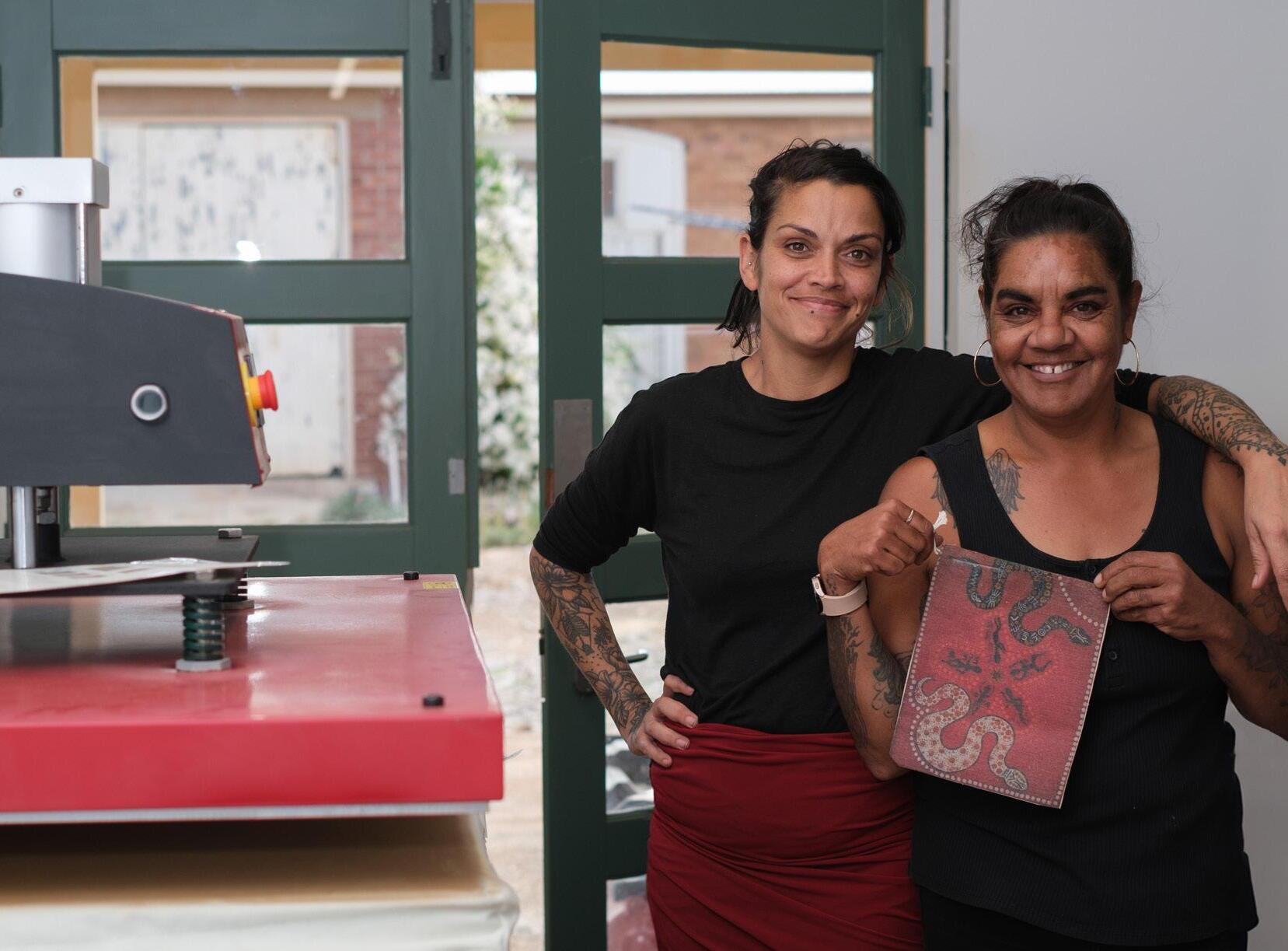
Maximising opportunities for economic participation, through Native Title determinations, supporting Aboriginal business growth, creating more inclusive workplaces and supporting training and employment programs are all key factors in breaking down barriers and achieving economic outcomes in our region.
Supporting Aboriginal economic development in the region is critical to achieving regional development outcomes and forms a core focus across all Strategic Priority areas.
• The GEDC worked closely with many Traditional Owner Groups, Prescribed Body Corporates and Aboriginal Controlled Community Organisations to identify opportunities for economic participation and prosperity.

A1: Foster genuine co-design of and participation by Aboriginal people in business, economic and service delivery initiatives and opportunities
A2: Support the identification and realisation of economic opportunities from Native Title
A3: Support the activation of Aboriginal interests in land, culture and skills into the economy
A4: Promote Aboriginal procurement with support to build capacity and capability
A5: Support for Aboriginal people in business and industry
• Partnered with Development Commissions and DPIRD to deliver the Northern Native Seed Industry Development Initiative ($4m) (page 44) and the Aboriginal Visual Arts Investment Feasibility project.
• On country visit to the Ngaanyatjarra Lands to meet with the Shire of Ngaanyatjarraku, Ngaanyatjarra Council and local community in August 2023.
• Member of the Tjiwarl socio-economic study working group with TAC, DPIRD and Curtin University, meeting monthly throughout the year to scope and implement a Tjiwarl baseline study with members.
• Co-Chaired the Tjiwarl Economic Empowerment Working Group under the Tjiwarl ILUA (page 45) with TAC and the State Government.
• Developed a scope and provided funding for an Economic Development Strategy for the Tjiwarl Economic Empowerment Group.
• Supported the development of an Aquaculture Precinct concept with Esperance Tjaltjraak Native Title Aboriginal Corporation (ETNTAC) and industry.
• Supported the First Nations Arts Project within the Kalgoorlie City Centre project in the CBD.
• Provided sponsorship and support to workshops and events in partnership with the Goldfields Aboriginal Business Chamber (GABC).
• Our Local Content Adviser worked with service providers and agencies, such as the GABC to promote best practice procurement, increase employment outcomes and build the capacity of Aboriginal businesses and organisations, through grants, workshops and better access to tenders.
• Facilitated several regional workshops in tender and grant writing.
• Funded Aboriginal empowerment projects via our Regional Economic Development Grants.
The Northern Native Seed Industry Development Initiative (NNSIDI) is a joint project of the Pilbara, GoldfieldsEsperance and Kimberley Development Commissions.

This Initiative is supporting Aboriginal and Torres Strait Islander enterprises to develop and operate native Seed Production Area (SPA) trial sites across the Pilbara, Goldfields-Esperance, and Kimberley regions.
The aim of the initiative is to build the capacity of Aboriginal enterprises to supply native seed for land rehabilitation and support development of a future land restoration economy in the regions.
During 2023-2024, the NNSIDI team including a GEDC based staff member working 0.5 FTE on the initiative, undertook extensive consultation across the three regions, engaging with over 200 stakeholders, to inform development of the NNSIDI.
An expression of interest (EOI) process was developed and opened to participants during 2023-2024, receiving 26 applications from organisations seeking to participate in native SPA trials.
Following the EOI process, the NNSIDI team worked to support eligible organisations with preparing applications for the next stage in the process. A total of 16 Northern Native Seed Grant applications were received and up to seven Aboriginal-owned Seed Production Area trial sites will be funded through the project.
Work on the NNSIDI will continue into 2024-25 with successful applicants being notified early in the next financial year and commencement of funded projects.
The GEDC is privileged to be contributor and signatory to the Tjiwarl Palykuwa (Agreement) which is an Indigenous Land Use Agreement (ILUA) between the State and Tjiwarl Aboriginal Corporation (on behalf of the Tjiwarl people) that resolves the State’s native title compensation liability in relation to Tjiwarl Country.

This historic Agreement commenced in May 2023 and is testimony to the commitment of both the Tjiwarl people and the State Government to facilitate positive outcomes for Tjiwarl people, working together to continue an ongoing relationship and dialogue built on a strong foundation of agreement-making.
Under this Agreement, the GEDC is a member of the Implementation Committee and a Co-Chair, alongside a Tjiwarl member, of the Economic Empowerment Working Group, one of several working groups established under the Agreement to foster relationships and implement the Agreement.
The Economic Empowerment Working Group was supported by GEDC and DPIRD and aims to support Tjiwarl Aboriginal Corporation (TAC) in managing the expenditure of the Economic Empowerment Funding ($3 million) in accordance with TAC policies and directions.
The Working Group focused on supporting Tjiwarl business participation in economic activities occurring on Country, and identifying and assessing new or emerging strategic opportunities.
With the support of Curtin University, TAC has undertaken a social study with its members that aims to assist with future decisions relating to Tjiwarl activities and GEDC was excited to be involved in this unique body of work during 2023-24.
The GEDC CEO attended an On Country Implementation and Working Group meeting in Leinster in May 2024 and was provided with a valuable opportunity to listen to Tjiwarl people tell their stories and share their culture. It also provided a great opportunity to discuss the aspirations of TAC and their members, whilst being surrounded by their deep cultural connections, landmarks and stories.
The GEDC maintains a positive track record in achieving organisational excellence, supported by transparent and effective governance and talented people.

Across the State and the Goldfields-Esperance region, our focus is on demonstrating strong leadership and fostering transformational partnerships with our stakeholders.
E1: Demonstrate regional leadership
E2: Build collaborative and trusted partnerships
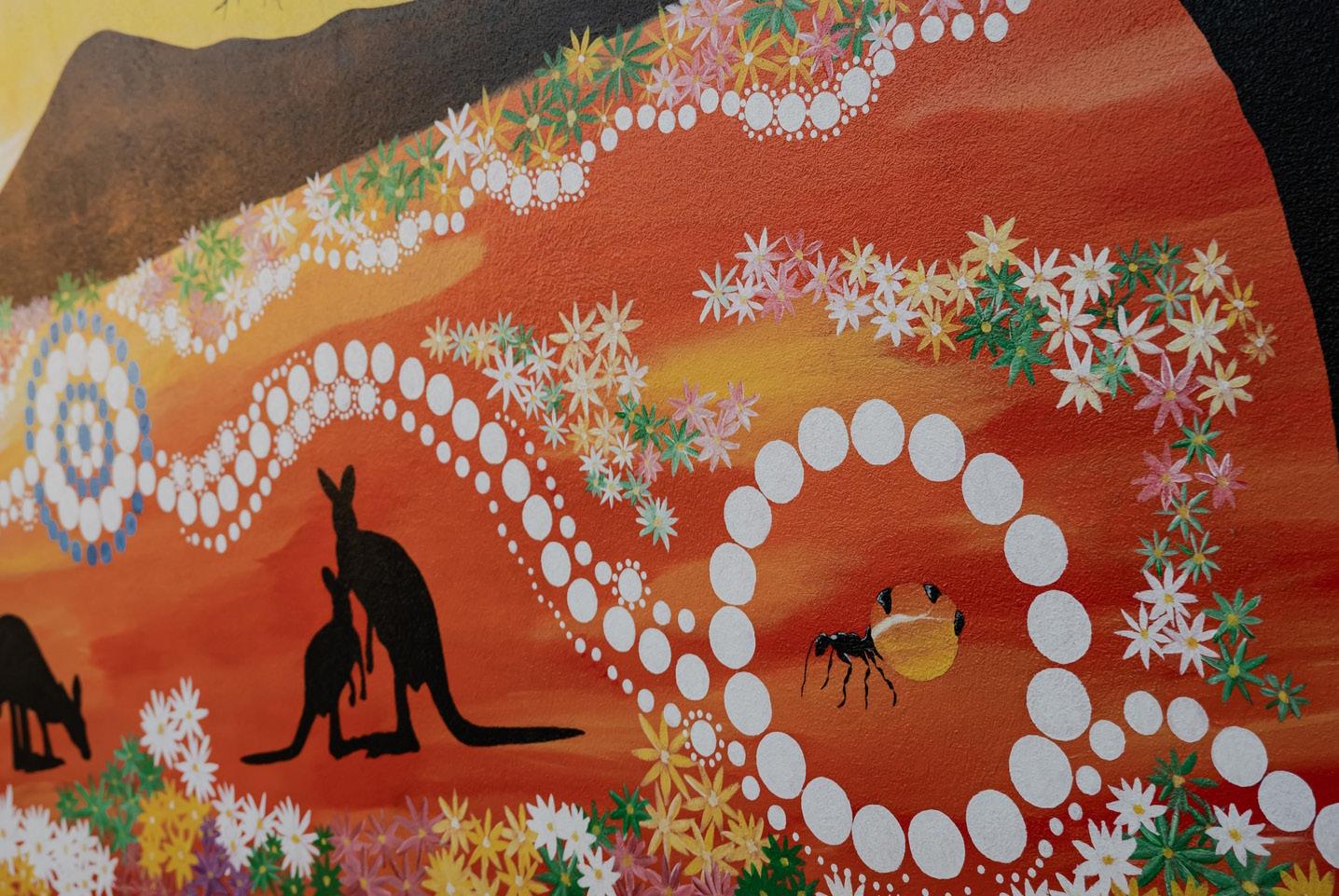
E3: Contribute to a unified regional voice on regional development matters
• Facilitated, coordinated and attended Ministerial visits, Board meetings and events throughout our remote and regional communities.
• Attended meetings of the GVROC including sub-committees and workshops, and regular liaison with GVROC members on key issues such as infrastructure and housing.
• Worked closely with Local Government, representative organisations, advisory groups and business networks to remain informed and connected to local issues.
• Fostered strong and effective relationships to deliver positive regional development outcomes through the Western Australian Regional Development Trust, Western Australian Regional Development Council, Western Australian Regional Development Alliance and DPIRD.
• Chair and CEO representation at Trust, Council and Alliance meetings in Perth and online throughout the year.
• Prepared the Goldfields-Esperance Housing and Land Summary for period January to June 2023, featuring key housing and land statistics and data analysis for the region’s centres. Shared with our key stakeholders and relevant agencies.
• Produced and analysed economic statistics and data to inform internal studies, economic snapshots, briefings and reports, and to provide to external stakeholders.
E4: Provide regional intelligence
E5: Manage regional investment funding
• Prepared REMPLAN economic modelling reports for external stakeholders to inform the economic benefits of their project proposals and funding applications. Supported REDs grants proponents with economic information and modelling for their projects.
• Met with industry and project proponents to provide regional insight and briefings and advise on government services and pathways.
• Delivered Round 6 of the State Government’s RED Grants Program for the Goldfields-Esperance region. (See appendix, page 98)
• Managed small grants and large grants for the Goldfields-Esperance region (See appendix, page 100)
ORGANISATIONAL PRIORITIES CONT. HOW WE ACHIEVED THIS
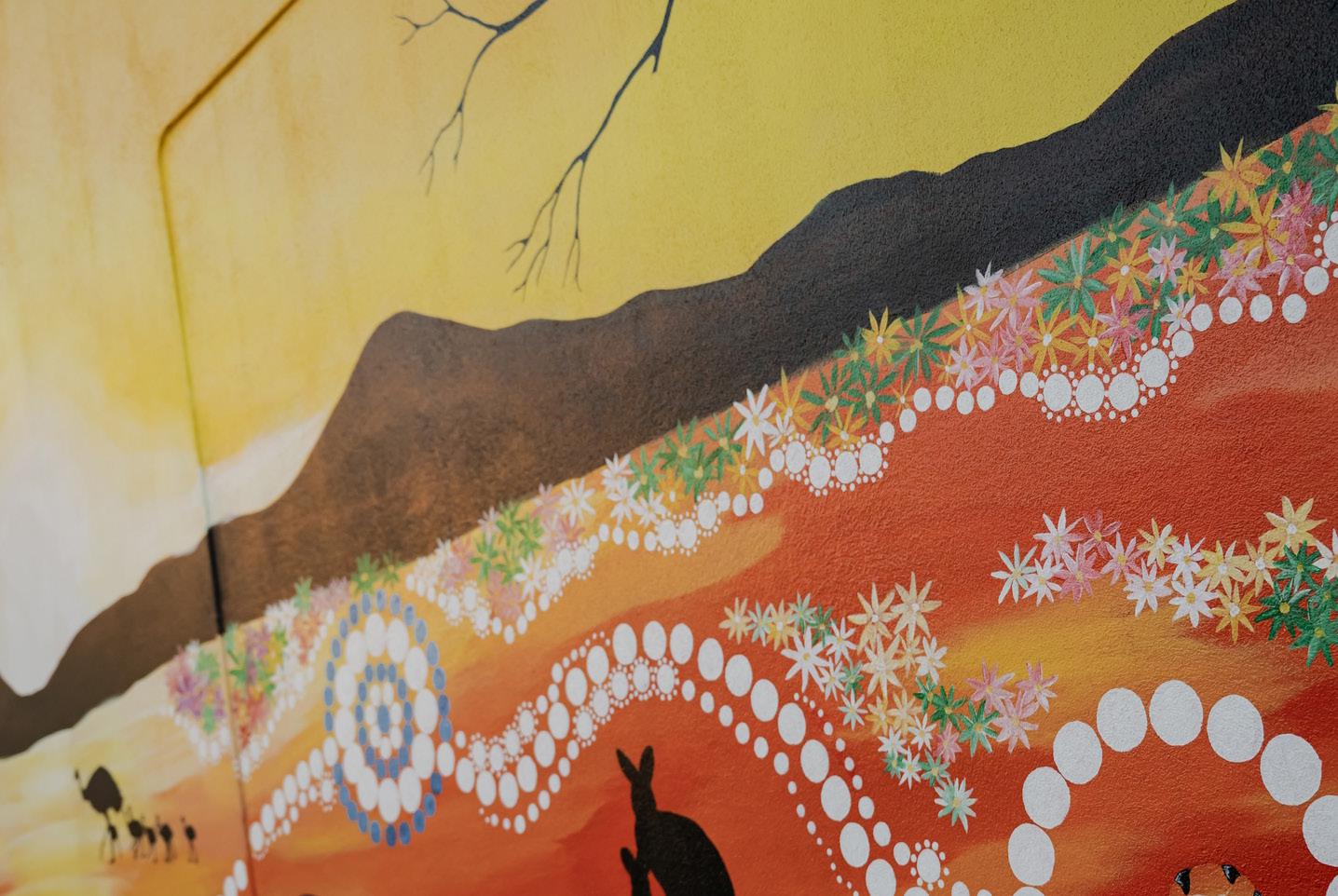
E6: Build and retain a capable workforce
E7: Effective communications
E8: Manage integrity and risk
E9: Excellence in corporate management
• Attended formal and informal training opportunities such as conferences, events and activities that build knowledge and networks. This included economic development and planning training, contract management briefings and a regional development forum.
• Launch of new GEDC website.
• Integrating paid promotion of key communications through online platforms to more accurately tap into key target audiences or reach specific subregions.
• Continued growth on all social media / electronic news platforms, connecting digitally with our followers.
• The Risk Management and Audit Committee continued to govern our risk management processes and provide an effective internal audit function under Section 53 of the Financial Management Act 2006
• Monitored and responded to cyber-security threats providing regular reporting to the Department of Premier and Cabinet (DPC), Office of Digital Government and Australian Cyber Security Centre (ACSC) Cyber Hygiene Improvement Programs (CHIPs).
• Board and staff members completing Integrity and Code of Conduct training.
• Held three Risk Management and Audit Committee meetings to monitor and review the GEDC risk profile and appoint an Internal auditor.
• Undertook a successful Internal Audit and provided timely information to the Office of the Auditor General for the DPIRD RDC external audit.
• Held a Risk Management training workshop with all staff to increase awareness of risks and management processes.
• Developed a new Integrity training module and implemented this across the Board and staff.
• Provided timely responses and briefings to Ministerial offices as requested and when necessary.
• Implemented new procedures for HR, financial management and ICT systems.
• Managed two regional offices and assets dealing with emergency events including floods and power failures. Progressed options for improving office accommodation including new lease options.
• Managed our budget and funding resources effectively to achieve optimum outcomes for the GEDC and the region.
To understand how the GEDC is performing, we invite our stakeholders to participate in our Annual Client Survey.
This survey provides insight into the effectiveness, timeliness and quality of service provided; and measures whether we are making a positive contribution to the economic development of the region. This year’s survey was conducted by Perth Market Research, with a total of 101 surveys being completed. We thank our stakeholders for taking the time to complete the survey for 2023-24.
Our Annual Client Survey lets us know what we are doing well, and what we can do better.
80%
of respondents rated the service provided by GEDC staff as 4 out of 5 or higher (on a scale of 1 to 5 averaged over 5 indicators).
of stakeholders agreed that GEDC makes a positive contribution to the economic development of the region. 90%
The highest level of service awareness was for aboriginal economic development initiatives, followed by:
• economic impact modelling for regional projects, business cases and grants
• coordinating or undertaking research and studies within the region
• maximising local content spending in the region; and
• facilitating workforce development and capacity building initiatives.
The GEDC demonstrated regional leadership by facilitating, coordinating and attending Ministerial visits, Board meetings and events throughout its diverse, regional and remote communities in the largest region of WA.
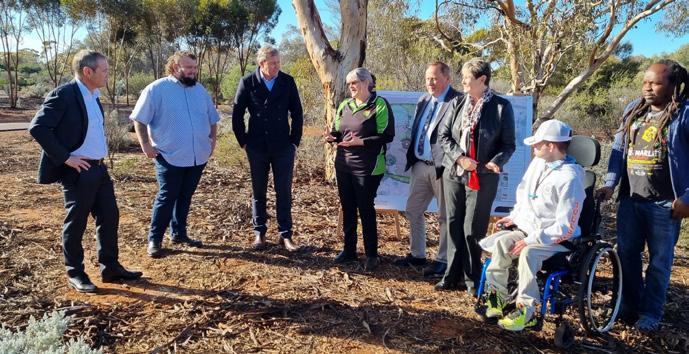
KALGOORLIE-BOULDER
30 - 31 July 2023
Community Cabinet
Premier of WA, Hon. Roger Cook and his Cabinet met in KalgoorlieBoulder.
The Premier, Minister Whitby and Minister Punch attended official launch of the Karlkurla Nature Playground project. The Premier also announced $2.1 million Lotterywest funding for the Kalgoorlie-Boulder Youth Precinct project during a visit to Kingsbury Park, which provided an opportunity for the Premier, Minister Punch and Minister McGurk to view the designs and discuss key project components. These regional investments are managed by the GEDC.
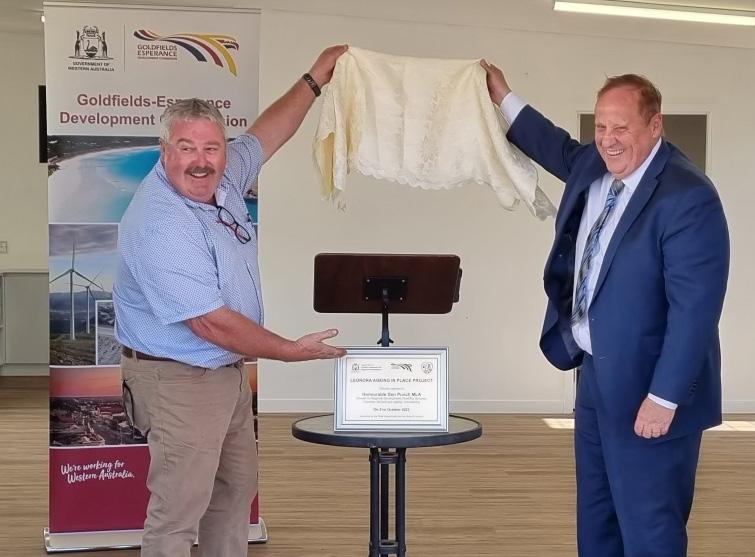
KALGOORLIE-BOULDER
31 October - 1 November 2023
Hon Don Punch MLA
Minister for Regional Development; Disability Services; Fisheries; Seniors and Ageing; Volunteering
Announcement of successful recipients of the GEDC’s Round 6 Regional Economic Development (RED) Grants. Minister Punch also opened the Leonora Ageing in Place Village - new senior’s accommodation funded through the GEDC and DPIRD, Regional Aged Accommodation Fund.
Direct engagement between Local Government Authorities, business and industry representatives, local stakeholders, and the Board and staff, through formal and informal arrangements, ensures the GEDC remains well-informed and connected. It also develops and maintains effective relationships and partnerships, while fostering an environment of collaboration and information sharing for the benefit of the region and the State.
Through our partnerships and regional intelligence, we ensure government has a clear understanding of the region’s potential and economic needs.
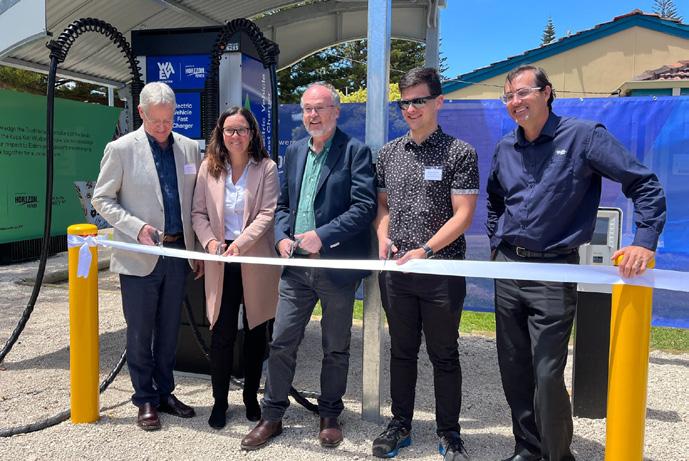
ESPERANCE
2 November 2023
Hon Bill Johnston MLA
Minister for Mines and Petroleum; Energy; Hydrogen Industry; Industrial Relations
Official opening of Horizon Power’s DC fast chargers (150kW) as part of the WA EV Network, attended by GEDC.
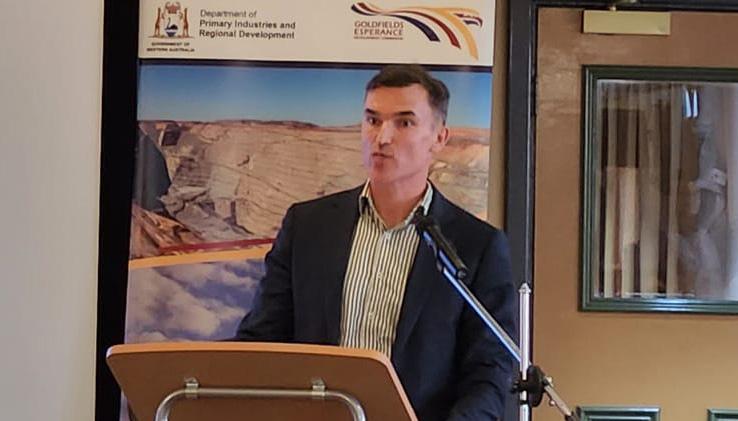
KALGOORLIE-BOULDER
15 March 2024
Hon John Carey MLA
Minister for Planning; Lands; Housing; Homelessness
Roundtable with GVROC, State agencies and GEDC to discuss potential housing projects and land initiatives. Minister Carey also announced a $50 million boost to funding for social and community housing.
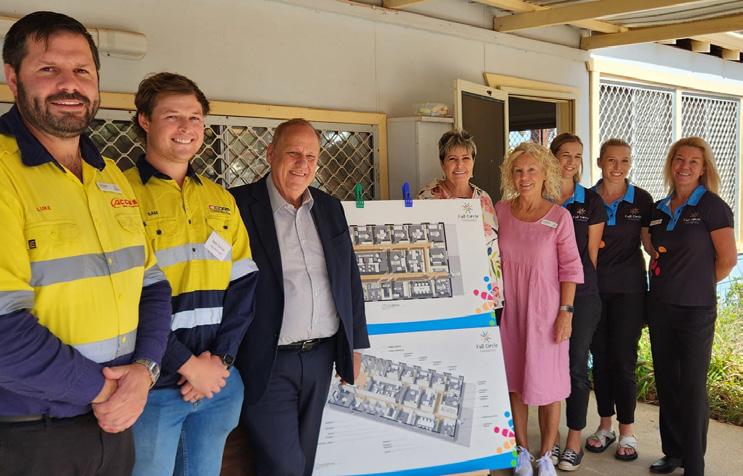
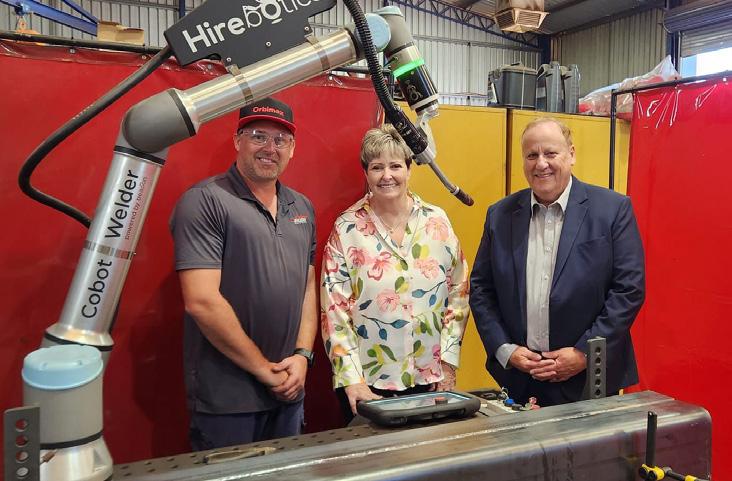
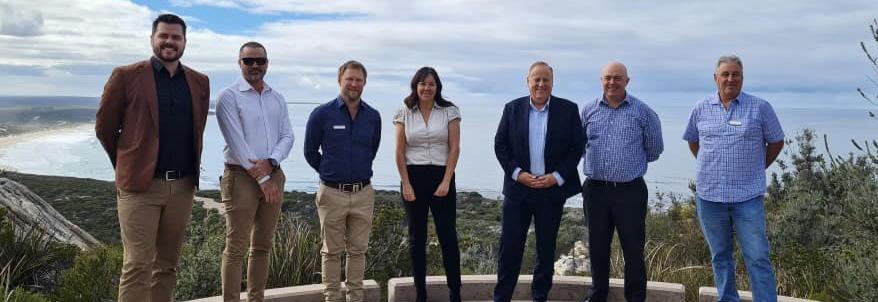
HOPETOUN, ESPERANCE, KALGOORLIE-BOULDER
3-4 April 2024
Hon Don Punch MLA
Minister for Regional Development; Disability Services; Fisheries; Seniors and Ageing; Volunteering
Minister Punch met with local Councils and community organisations in April 2024, in the Shires of Ravensthorpe and Esperance during a visit hosted by the GEDC.
This included a REDs event at Bread Local in Esperance, celebrating the completion of their expansion project and showcasing the diverse range of Esperance-based REDs Grant recipients.
Minister Punch met with the Shire of Esperance and addressed people that had gathered in the centre of Esperance about the proposed South Coast Marine Park.
In Kalgoorlie-Boulder the Minister attended events and site tours including a visit to Full Circle Therapies to announce the successful construction contractor for their new facility, supported by a $2.8 million State Government election commitment. REDs Grant recipient, MAS Equipment received a visit at their Kalgoorlie workshop to unveil their new Collaborative Welding Robot.
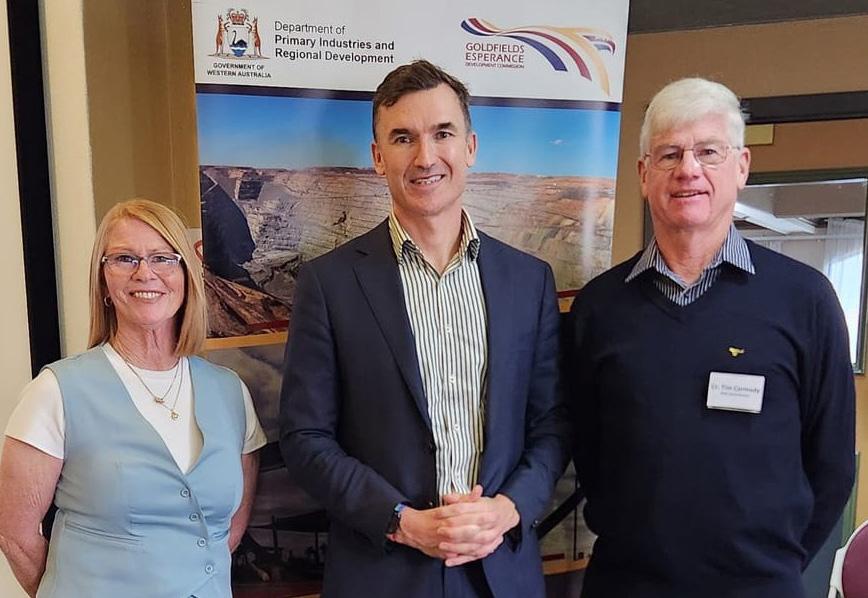
KALGOORLIE-BOULDER
10 May 2024
Hon John Carey MLA
Minister for Planning; Lands; Housing; Homelessness
At the State Budget Breakfast event, hosted by the GEDC, the Minister delivered details of the State Budget which included a number of key commitments for the GoldfieldsEsperance region.
The breakfast event, which was attended by 80 regional residents, provided an opportunity to hear first-hand from the Minister and ask questions following the presentation.
The budget outlined an investment of $20.8 million for the expansion of the ANZAC Drive Industrial Estate, as well as $16.8 million for 32 new residential lots in stage five of GreenView Estate at Karlkurla. In addition, $15 million was allocated for future upgrades to the Goldfields Water Supply Scheme and $3.3 million to upgrade Eucla Airstrip in the Shire of Dundas - all projects the GEDC has been promoting for years.
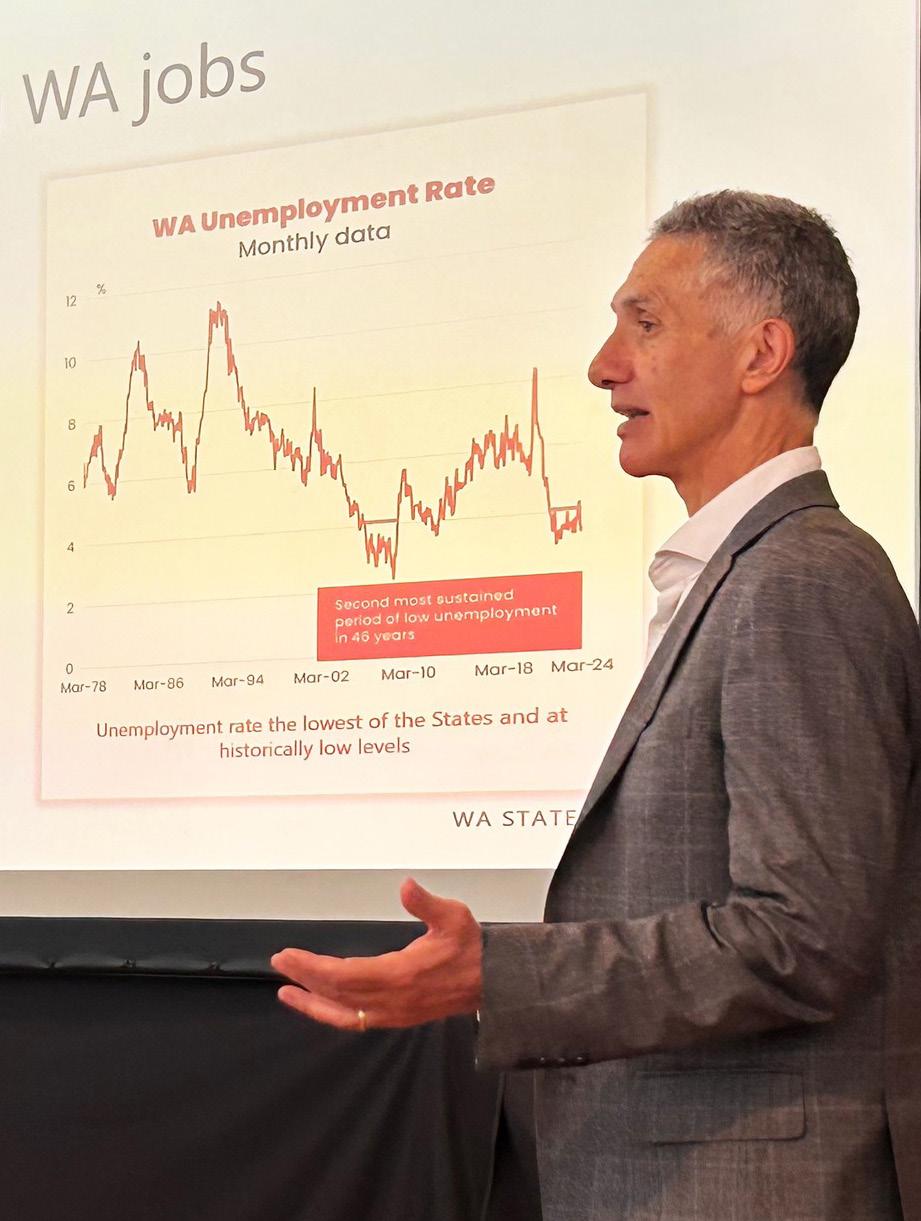
10 May 2024
Hon Dr Tony Buti MLA Minister for Planning; Lands; Housing; Homelessness
The State Budget Luncheon event, hosted by the GEDC, provided an opportunity for Esperance attendees to receive an overview of the State Budget delivered by Minister Buti, discussing new investments for the Goldfield-Esperance region. Notable investments for the Esperance community included $650,000 to the Esperance Senior High School to undertake planning for future upgrades and investment in new stand alone power systems through Horizon Power.
Working across the largest region in WA, the GEDC Board demonstrates its commitment to regional leadership by ensuring it meets regularly across the region. This enables the Board to hear from Local Government staff, regional stakeholders and various key project proponents.
The Board remain well-informed of what is happening, and get to experience first-hand many significant regional projects.

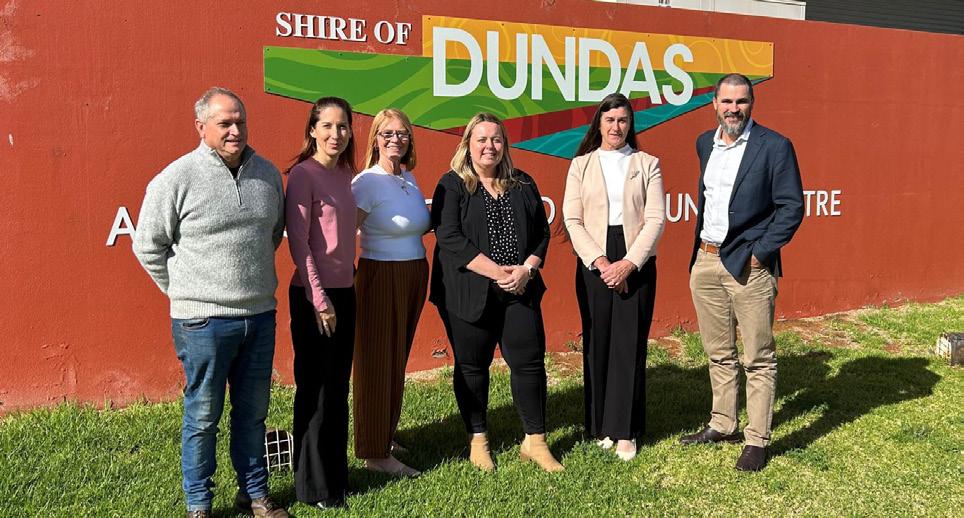
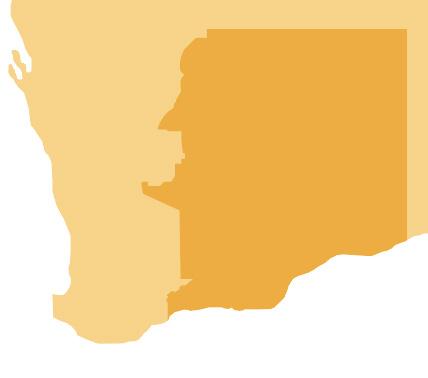
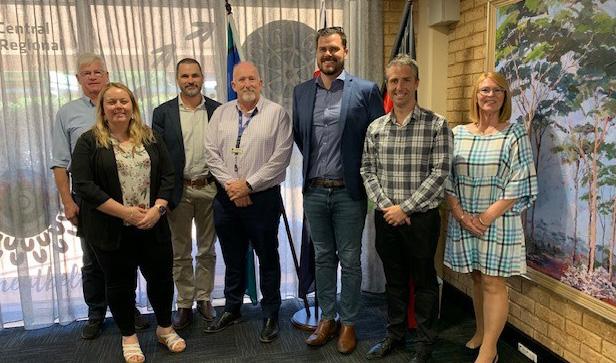
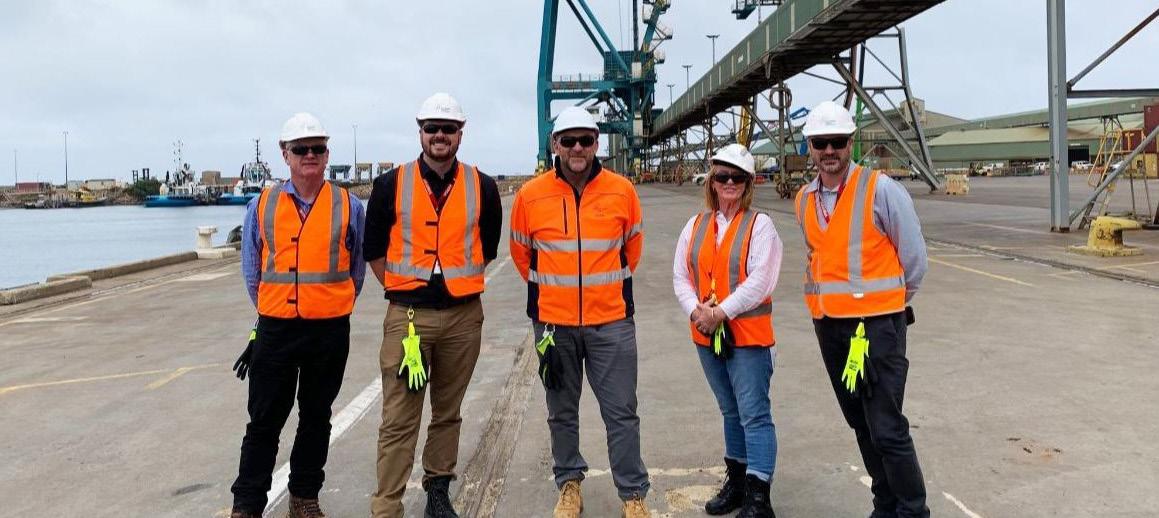
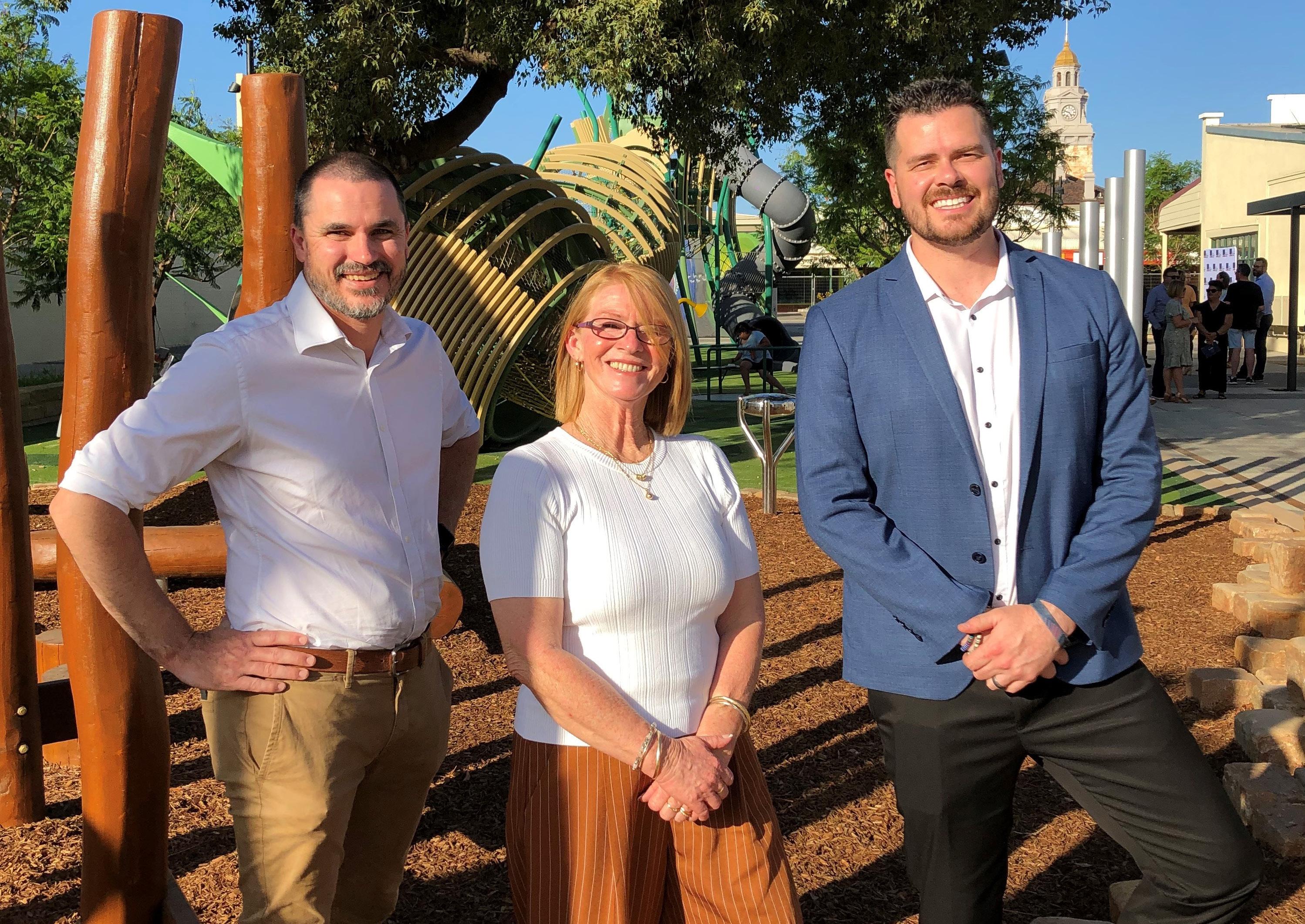
Through its work with local stakeholders and partners, the GEDC is able to identify opportunities to support economic growth and prosperity, resulting in more resilient communities.
In February, more than 90 Regional Development Practitioners from across Western Australia attended the annual Regional Development Collaboration Workshop in Busselton.
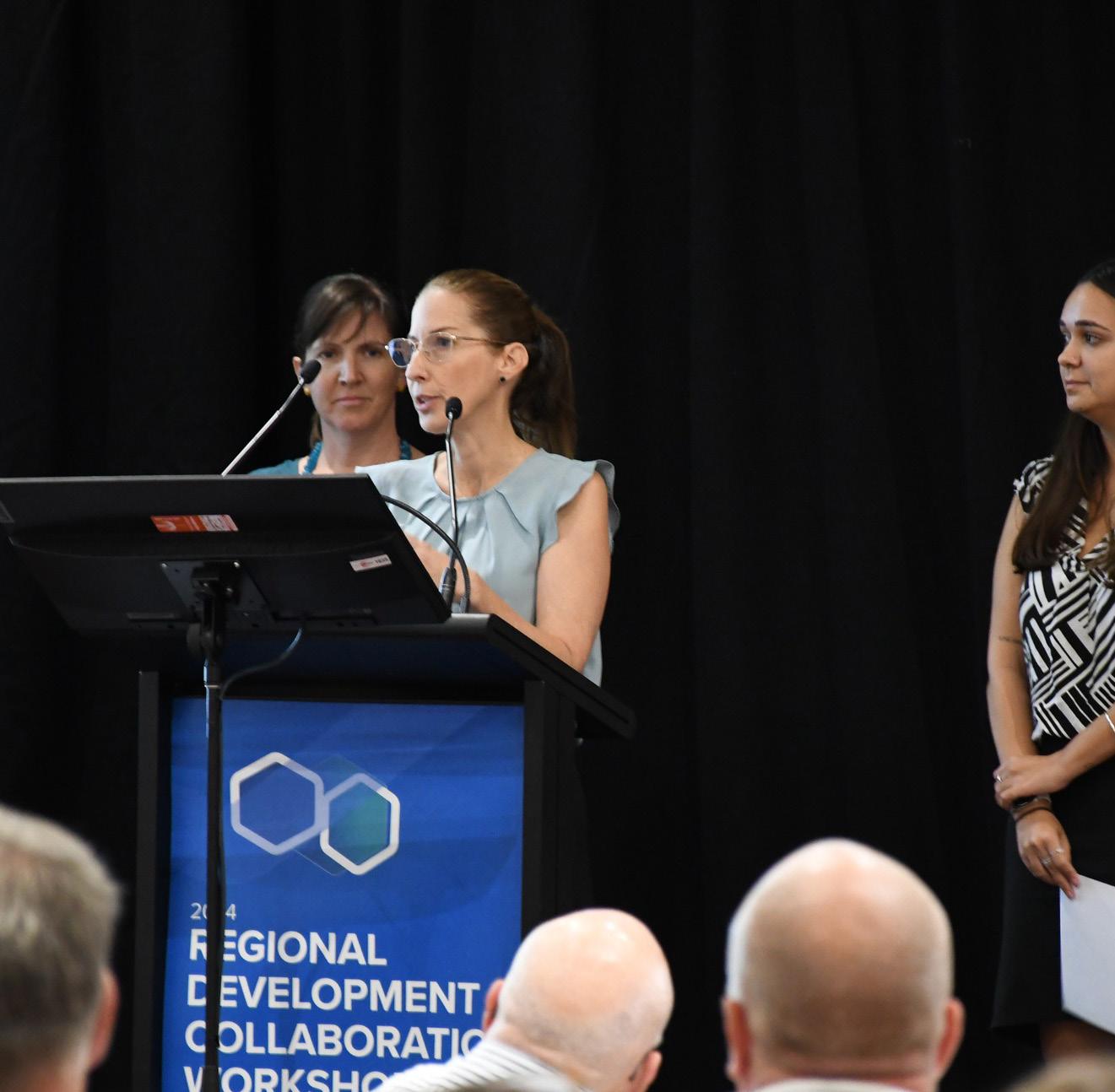
The GEDC team joined other Regional Development Practitioners from across all nine Development Commissions for the workshop to discuss and share on key regional issues, with a strong focus on collaboration, problem-solving and generating innovative solutions to regional issues, opportunities and challenges.
The workshop provided a valuable opportunity to connect face-to-face with colleagues working across the State.
It also enabled practitioners to highlight the work and achievements of their Commissions through an interactive poster display session.
GEDC showcased its work across early childhood education and care and industrial land, with the poster session providing an opportunity to explore synergies and shared issues across the regions.
The workshop focused on issues central to regional livability, with cross-regional groups of regional development practitioners tasked with developing innovative solutions to a range of livability issues including health service delivery, education and childcare access.
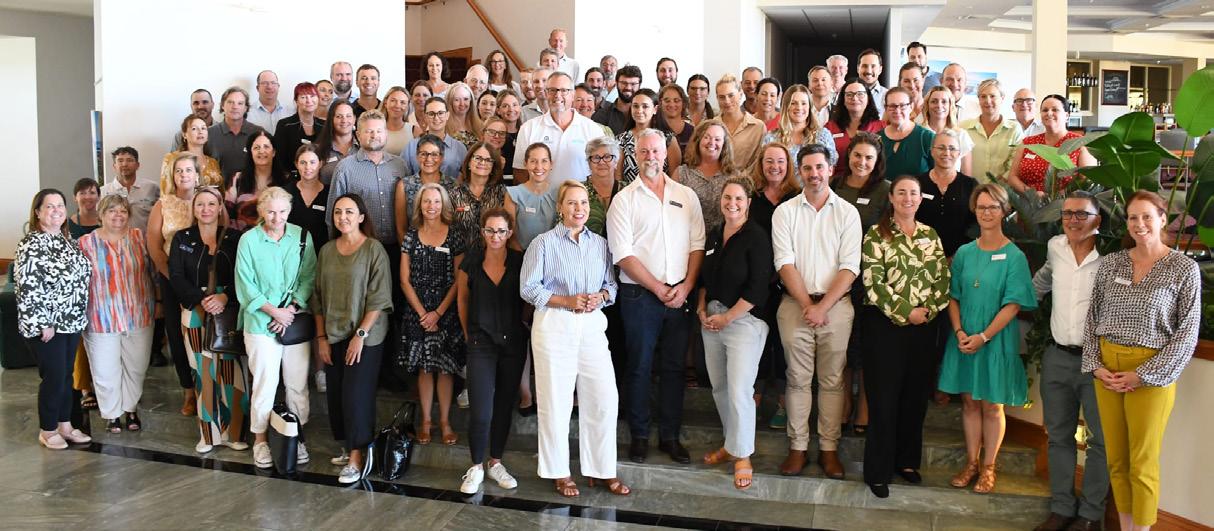
The GEDC continues to support Local Government Authorities, notfor-profit organisations, Aboriginal Corporations and local business to deliver State Government funded projects across the region, providing training and employment opportunities, increased productivity and industry investment.
Driving growth in the Goldfields-Esperance region, the Regional Economic Development (RED) Grants are delivered locally by each of the State’s nine Regional Development Commissions, with support from the Department of Primary Industries and Regional Development, investing in local projects that align with GEDC’s regional priorities and support economic diversification and employment.
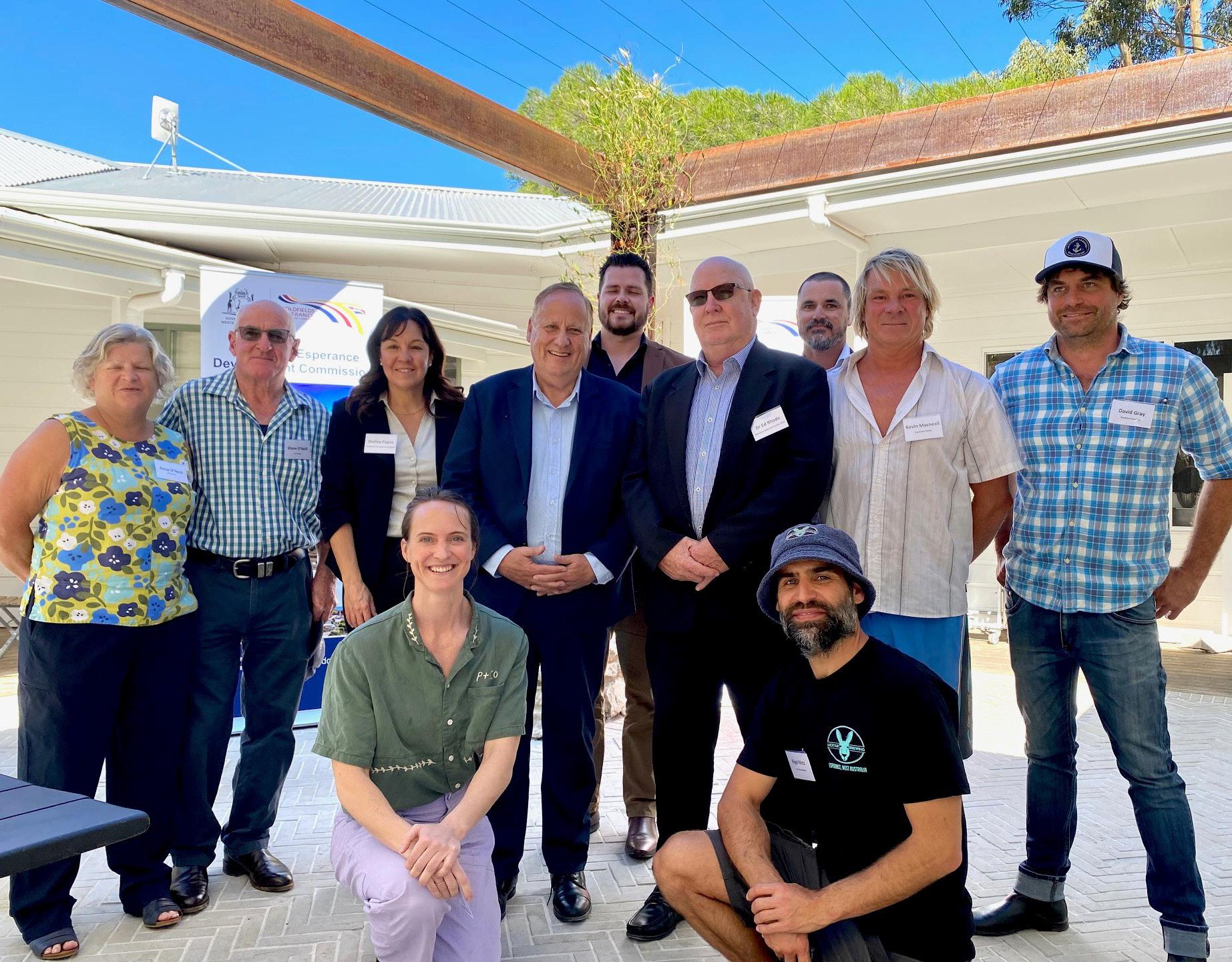
Successful REDs Grant projects promote sustainable jobs, expand or diversify industry, develop skills or capabilities, attract new investment, and or increase productivity.
The successful Goldfields-Esperance recipients of the Round 6 RED grants were announced on 1 November 2023, by Hon Don Punch, Minister for Regional Development at an event at MAS Equipment in KalgoorlieBoulder. Three projects shared in $555,000 in grant funding with a focus on increasing productivity, development of skills and capabilities, and diversifying industry.
Through the previous five rounds of RED Grants, $3,409,390 in funding has been allocated to 24 projects in the region, creating employment opportunities and positive economic impacts in the region’s communities.
Minister Punch attended a GEDC led REDs event at Bread Local in Esperance, celebrating the completion of their expansion project whilst also showcasing the diverse range of Esperance-based RED Grant recipients.
The event enabled the Minister to spend one-on-one time with each previous RED recipient, exploring their REDs supported product offerings and hearing first-hand the real benefits the grants make in the region.
During 2023-24, the GEDC team engaged directly with hundreds of grant recipients and project proponents to support the development of their grant applications and delivery of their projects. In May 2023, the grants team delivered grants workshops across the region and met one-on-one with stakeholders.
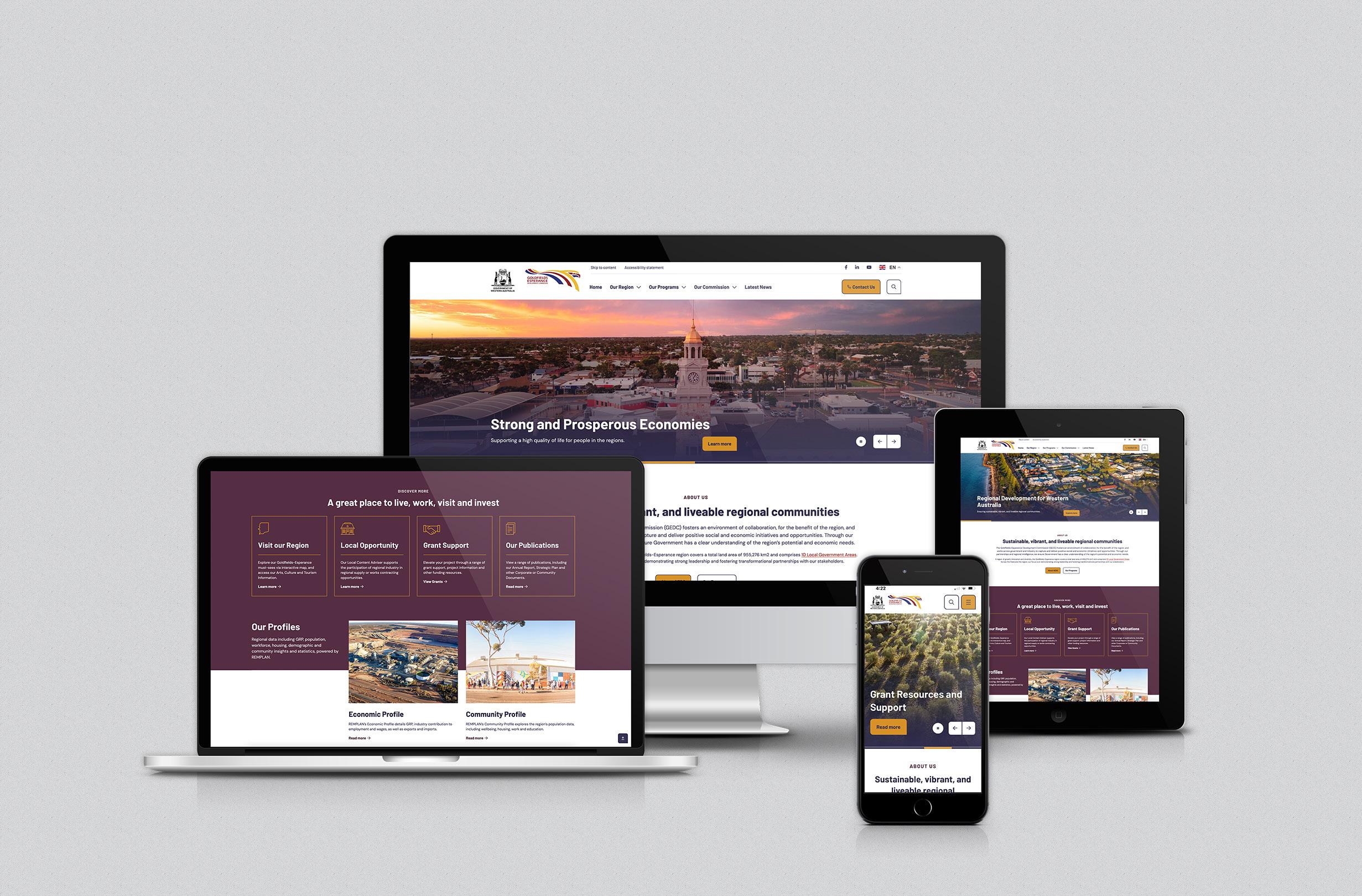
The GEDC’s website is central to the agency’s relationship with stakeholders and community, and to fulfil its functions under the Act to promote the region.
The website upgrade project was an opportunity to strengthen the GEDC’s brand and reputation, as well as showcasing regional strengths, capacity, opportunity and diversity.
The new visual design encompasses a recently curated, locally sourced media library boasting engaging imagery and a selection of bespoke videos, used to promote our region and showcase successful grant recipients and funded projects. Inspiration drew on community connection and liveability in the region, and an awareness of our regional strengths, opportunities and uniqueness.
Strengthening the GEDC’s online presence in an engaging way, the agency’s updated website represents the organisation’s connection to the region whilst ensuring information is engaging, easy to locate, and highly reliable.
During the initial development phase, careful consideration was given to simplifying site mapping and navigation pathways, as well as heading and copy curation, with the aim to increase search optimisation and ensure a smooth and easy user friendly experience.
Site build parameters were established at the commencement of the project to ensure all Accessibility and Inclusivity Guidelines as per the Department of Premier and Cabinet Office of Digital Government’s Digital Services Policy Framework were met. The Google Translate app has also been installed as part of GEDC’s commitment to accessibility, converting site content into 133 different languages.
Integrating a series of additional online platforms for the Commission, YouTube, interactive Google mapping, and ISSUU (digital publication flipbook reader) have been implemented, while the site continues to provide regional statistics through the embedded Economic and Community REMPLAN (regional intelligence) profiles.
Operationally, the new Content Management System (CMS) offers a simple and more efficient method for keeping the site’s information up to date keeping the site’s information up-to-date, resulting in the implementation of a revised internal workflow process for the maintenance of the site.
The new CMS also presents a higher level of cyber security with back-end program and application updates occurring in real time, as needed.
Whilst striving to maintain the agency’s 100% quarterly Cyber Hygiene Improvement Programs (CHIPs) score, additional digital security measures were implemented, along with regular scheduled back-ups mitigating loss of data risk.
A full content audit during the build phase ensured information is clear and accurate. Superseded documents and outdated information and articles have been carefully archived.
Relevance and accuracy of information remains critical in establishing and maintaining trust and building on the Commission’s existing reputation and credibility.
Meeting governance requirements such as GEDC’s Freedom of Information Statement, Public Interest Disclosure and the new Cyber Vulnerability Disclosure Program, all policies have been reviewed and included within a Quicklinks footer, available on every page of the site.
GEDC’s upgraded website ensures consistencies in strategic messaging across both the Commission’s digital and hard copy communications.
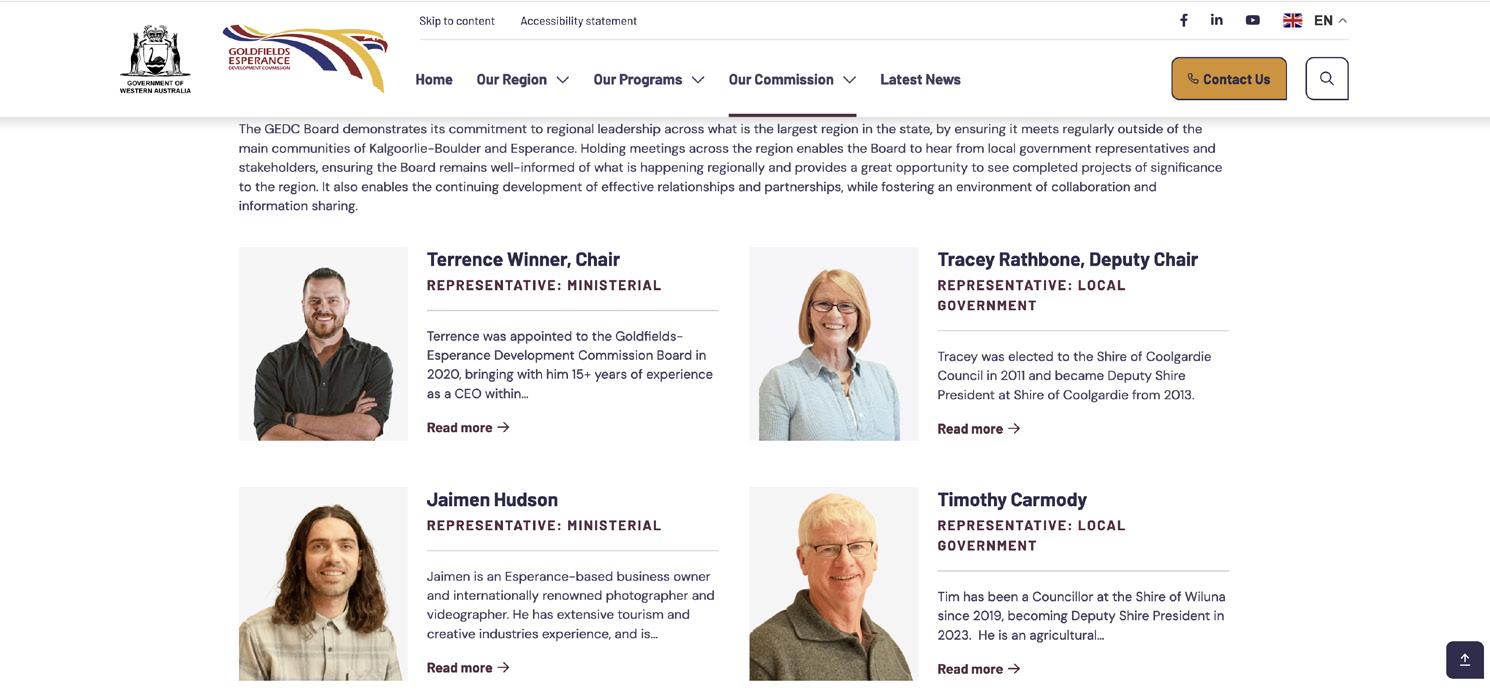
GEDC’s website not only meets the needs of the agency, stakeholders and community - but also presents a highly functional, accessible, mobile responsive platform.
The GEDC collaborates and supports many events throughout the Goldfields-Esperance community. This helps build capacity of organisations across the region and enables the GEDC to provide information and briefings to larger groups, about the work of the State Government in the regions.
Image: Director Regional Development, Sarah Fletcher, and GEDC CEO, Kris Starcevich represent the GEDC at the annual ‘What’s Down the Track’ business and industry forum in Kalgoorlie-Boulder.


NAIDOC Week
2 - 9 July 2023
GEDC Board Deputy Chair, Terrence Winner and GEDC staff member, Regan Brewer both attended the KalgoorlieBoulder NAIDOC opening ceremony at Centennial Park, where GEDC was presented with a Certificate of Appreciation for our support for NAIDOC Week 2023.
6 July 2023
Supported the Goldfields Aboriginal Business Chamber’s annual forum event in Kalgoorlie-Boulder. GEDC sponsored the event, hosted a display booth and the CEO presented at the forum.
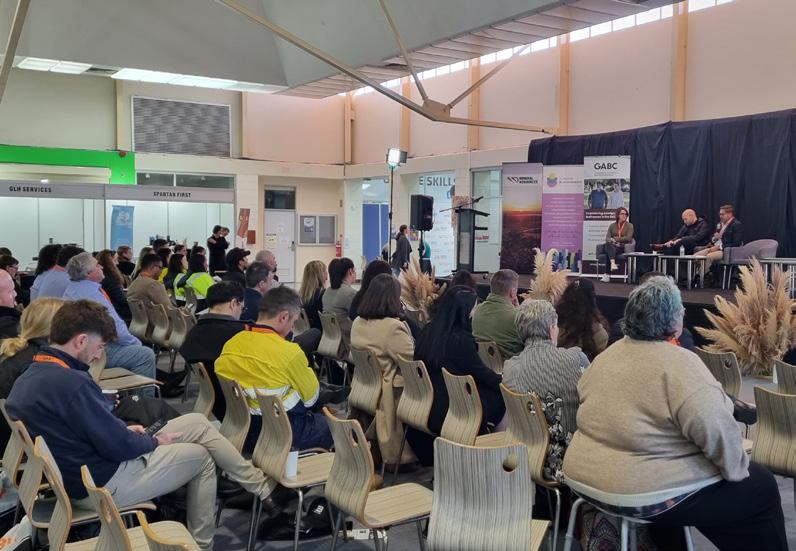
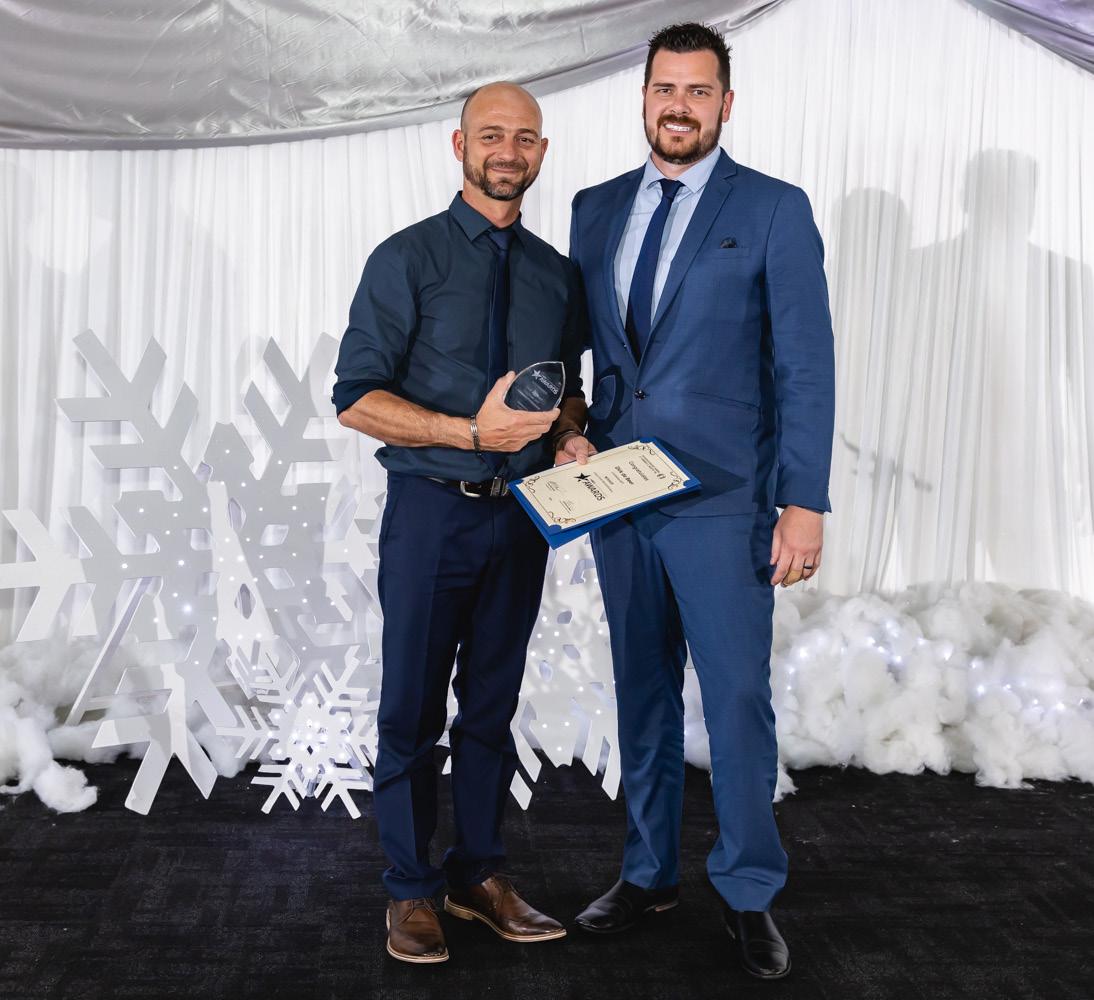
9 September 2023
GEDC Chair, Terrence Winner presented the GEDC sponsored award for ‘Executive Professional of the Year’ to Dirk De Beer, Managing Director of local mining services business Goldfields NDT.
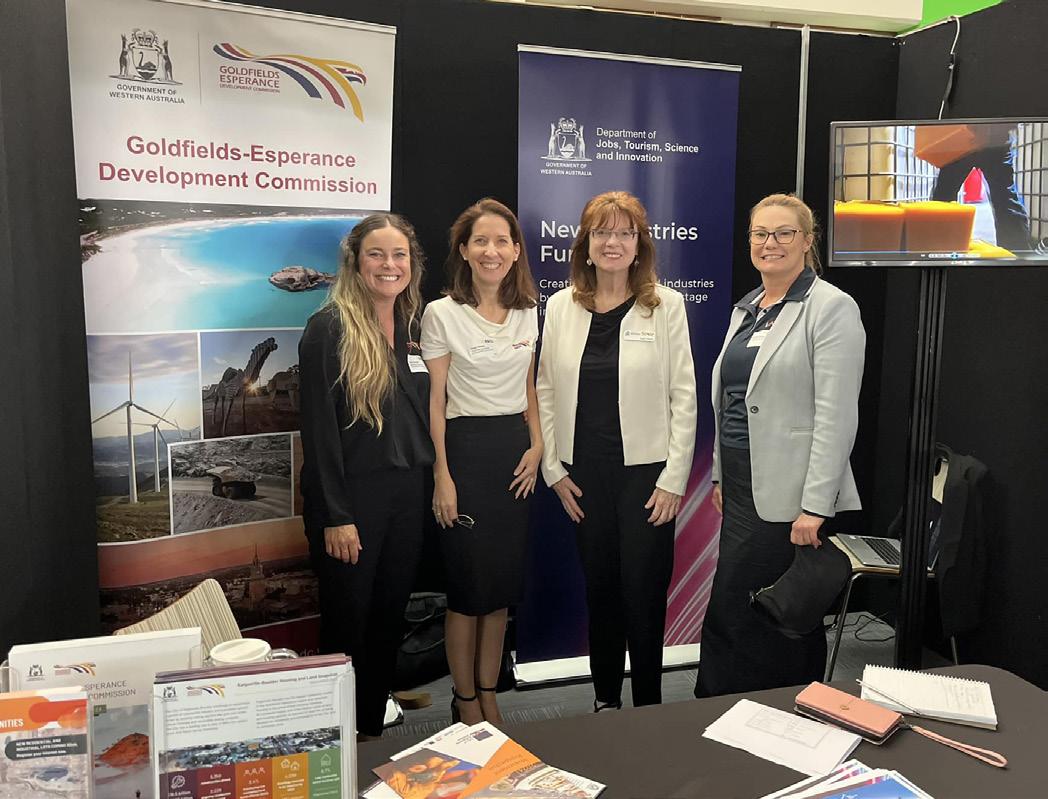
16 November 2023
Unlocking access to land, regional housing and infrastructure development, to set strong foundations for future growth, was the key theme presented by GEDC CEO, Kris Starcevich at the forum. GEDC also supported the event with a booth and met with a variety of stakeholders throughout the day.
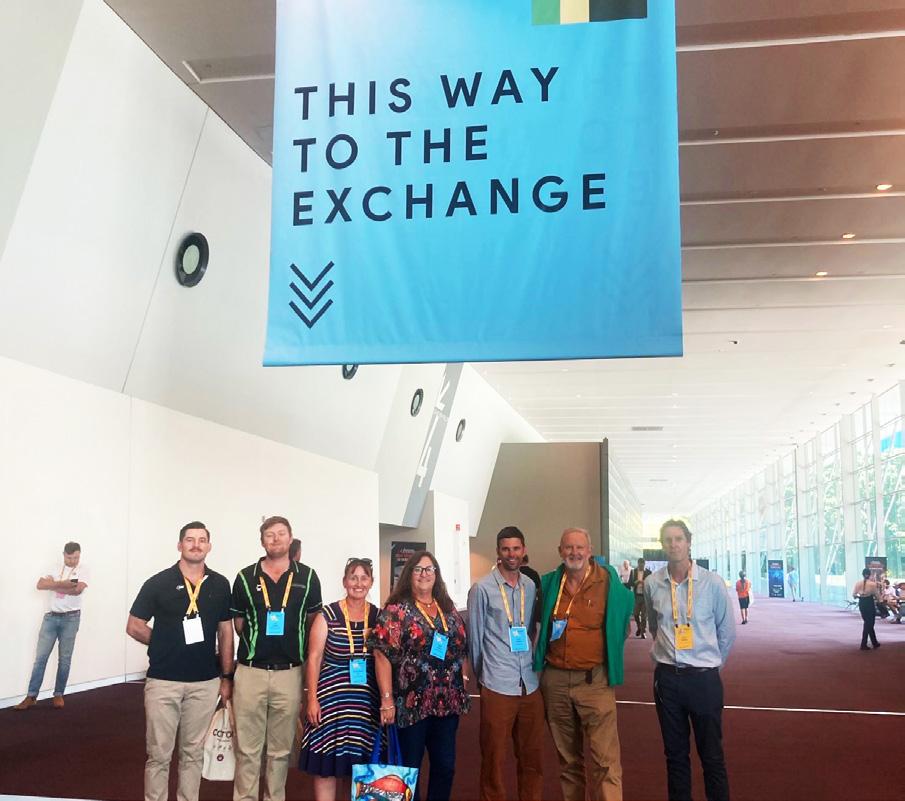
February 2024 (Perth)
GEDC staff represented the GoldfieldsEsperance region at AgriFutures Australia ‘evokeAG 2024’, along with several farmers from the region who attended to promote the ag sector to national and international guests.
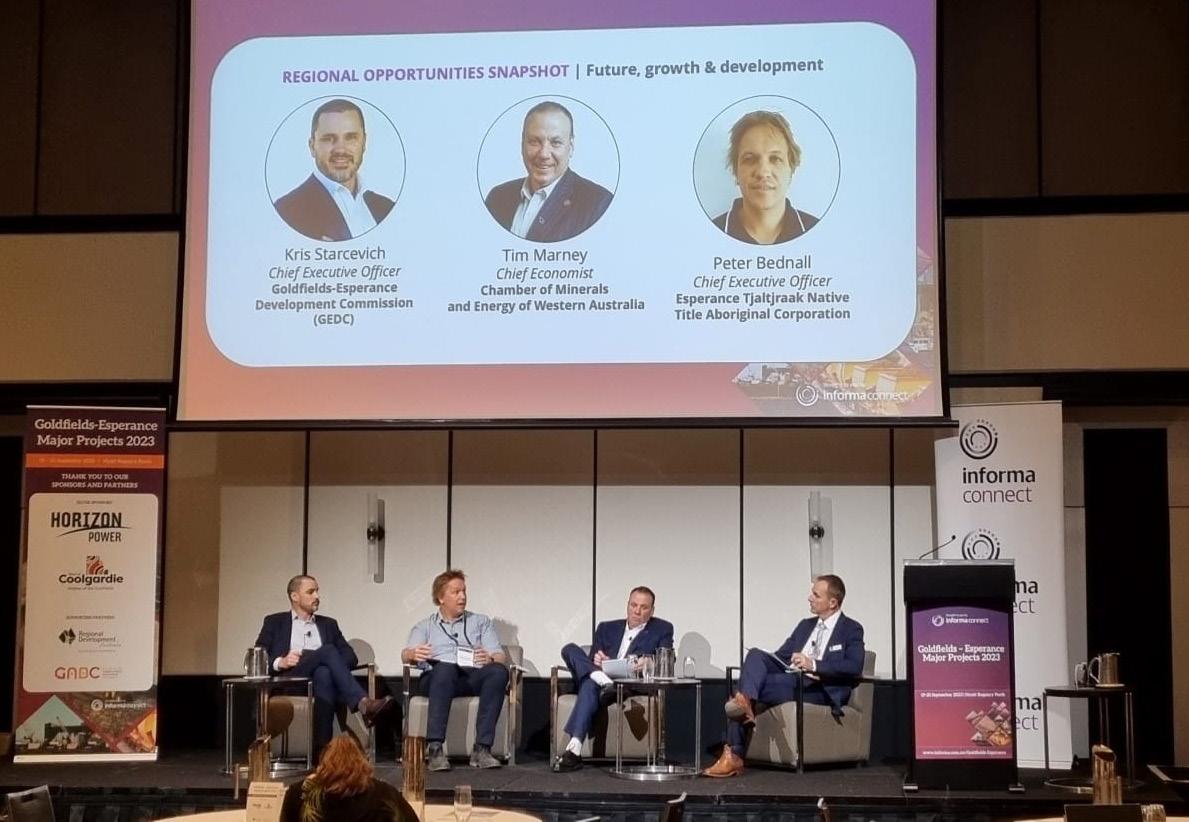
Major Projects Conference
19 - 20 September 2023 (Perth)
GEDC CEO Kris Starcevich joined Peter Bednall from Tjaltjraak Native Title Aboriginal Corporation and Chamber of Minerals and Energy
Chief Economist Tim Marney, for a panel session on creating investment and development opportunities.
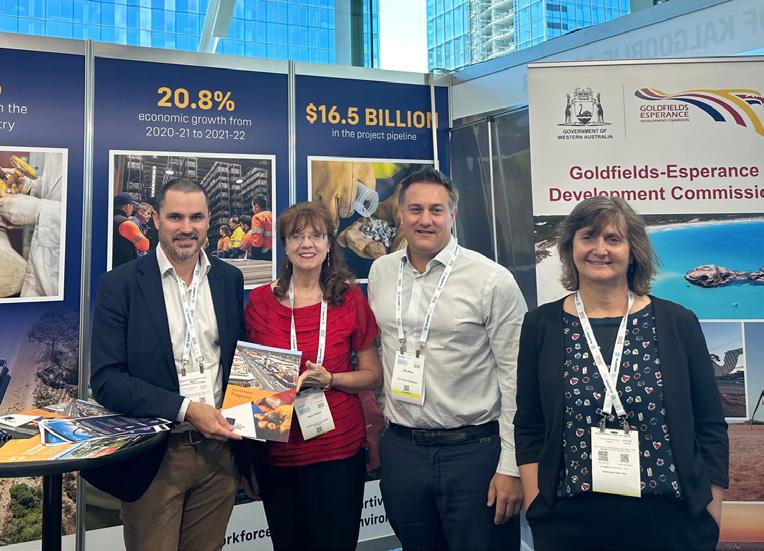
21-23 November 2023 (Perth)
GEDC represented the GoldfieldsEsperance region as co-booth host with the City of Kalgoorlie-Boulder, connecting the Critical Minerals sector and attendees while promoting the new Kalgoorlie-Boulder Investment Prospectus developed by the City with support from GEDC.
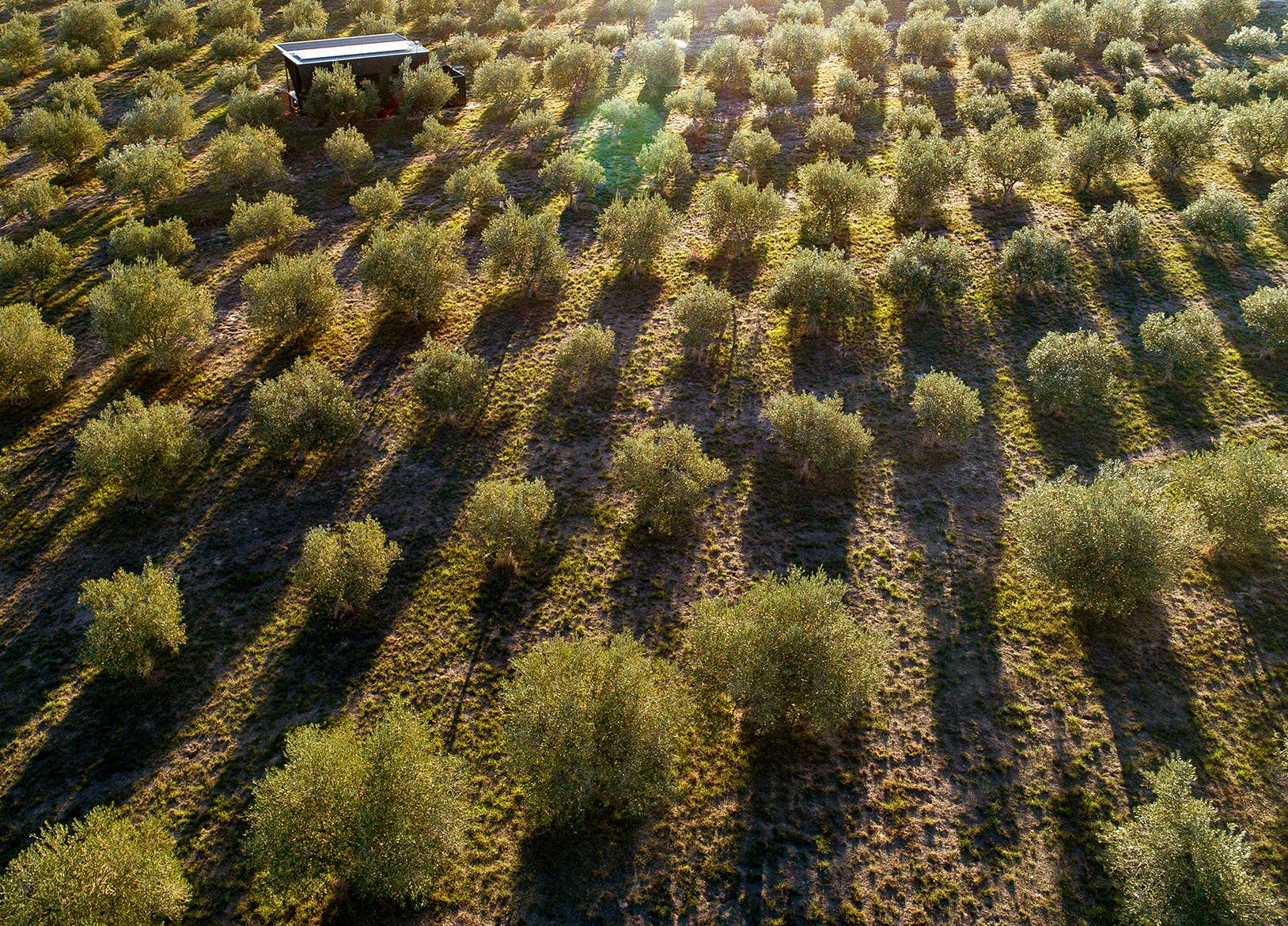
Agreed Borrowing Limit (where applicable)
1)As specified in the Section 40 budget estimates
2)The variation is the difference between the Target and Actual for each line item
a)Total cost of services is lower than the budget estimates (2024 Target) by $185k. This is primarily driven by reduced expenditure in the resources received free of charge resulting from the delay in
b)Net cost of services is lower than the budget estimates (2024 Target) by $185k. This is primarily driven by reduced expenditure in the resources received free
c)The variance of $118k in equity results from a higher than target opening equity position brought forward from 2023.
d)The decrease in cash in the period partially relates to 2024 income not being received prior to financial year end, offset by an increase in payables at financial year end.
e)Salary expense level is in line with target.
WORKING CASH TARGETS
1)Target to reflect the Commission’s anticipated working cash for the 2023-24 financial year.
2)Actual is the actual working cash held at the close of the financial year.
a)This variation is due to brought forward cash balance. The GEDC will be utilise the cash balance for approved projects and grant payments over the forward estimates.
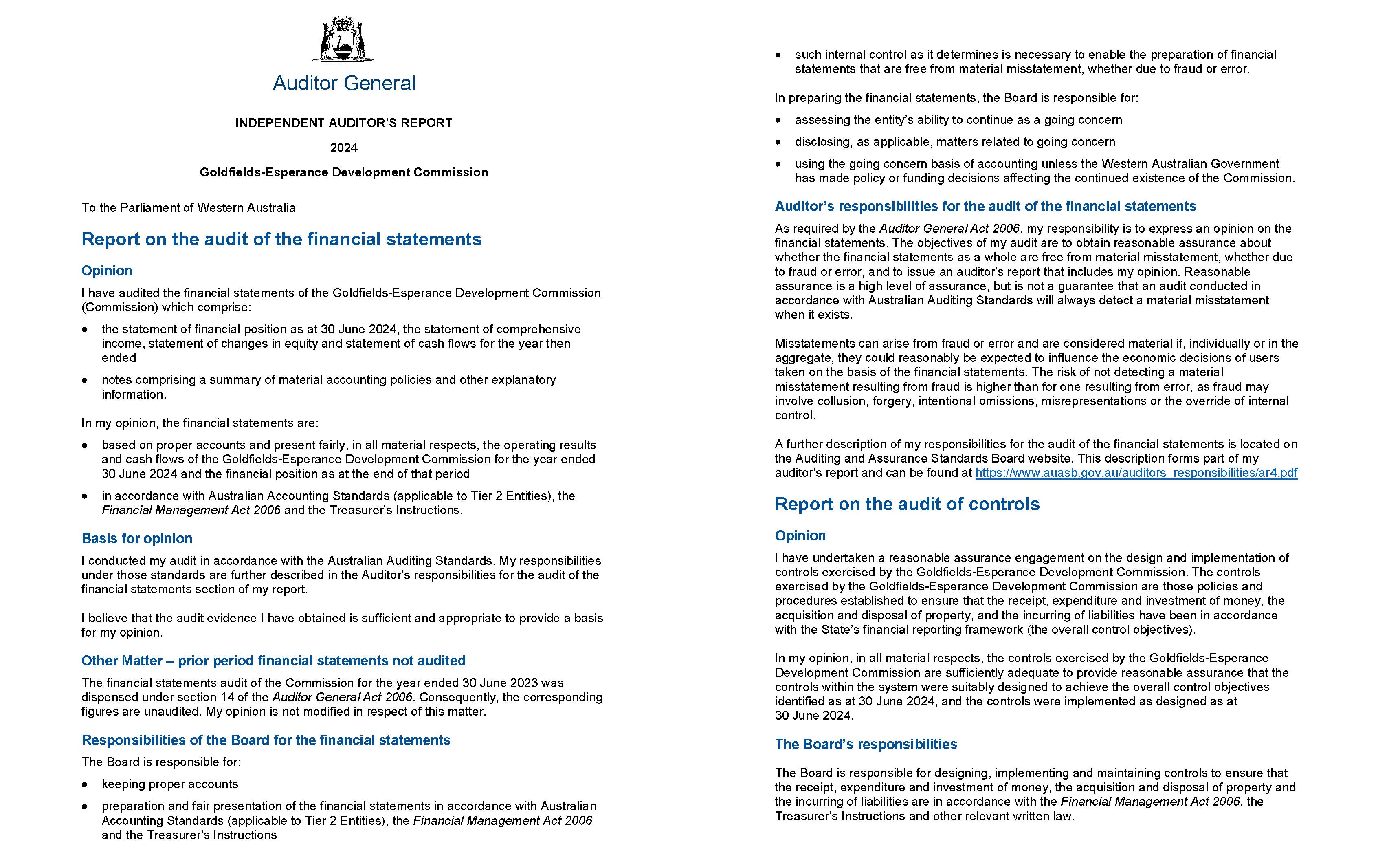
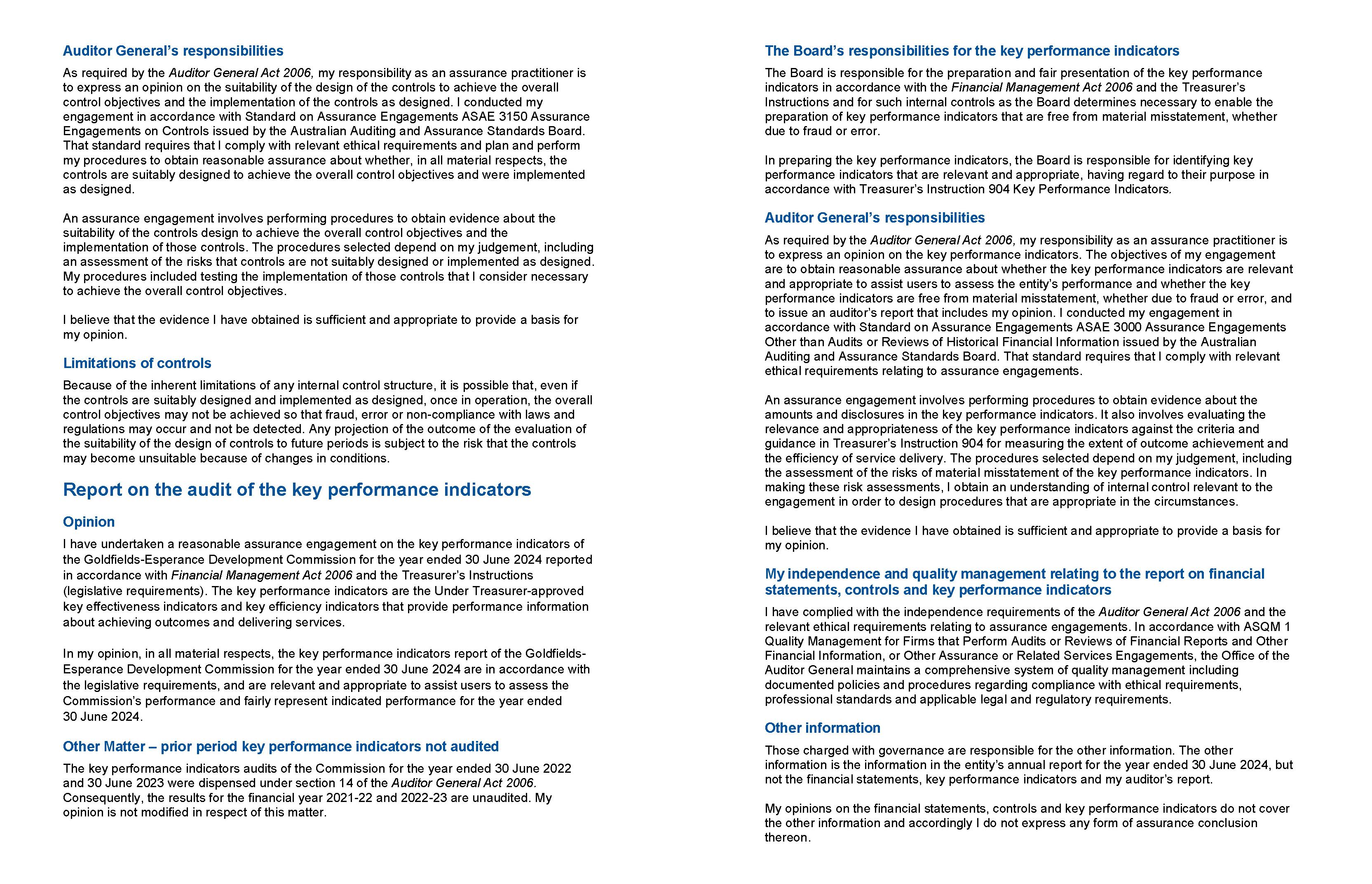
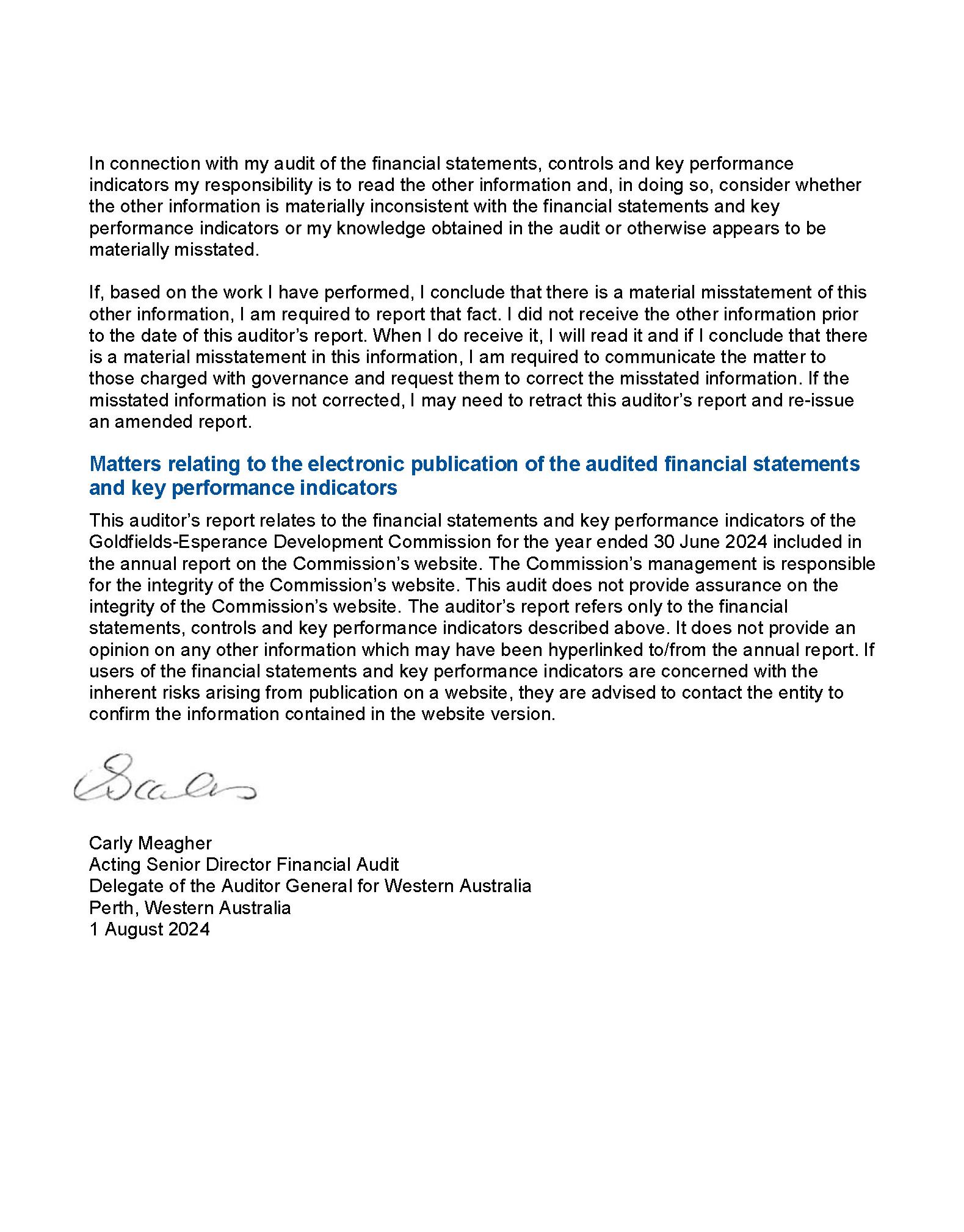
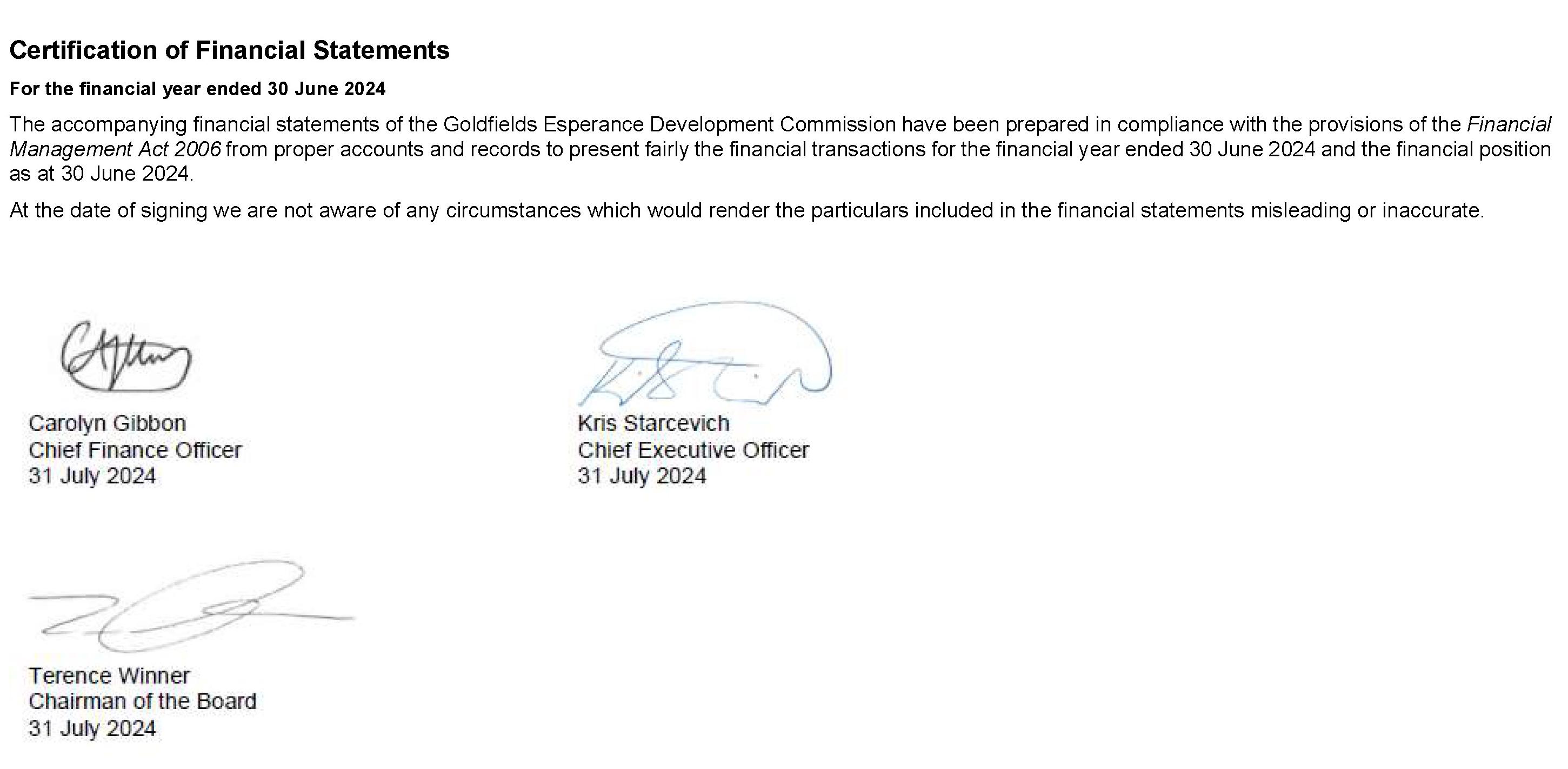
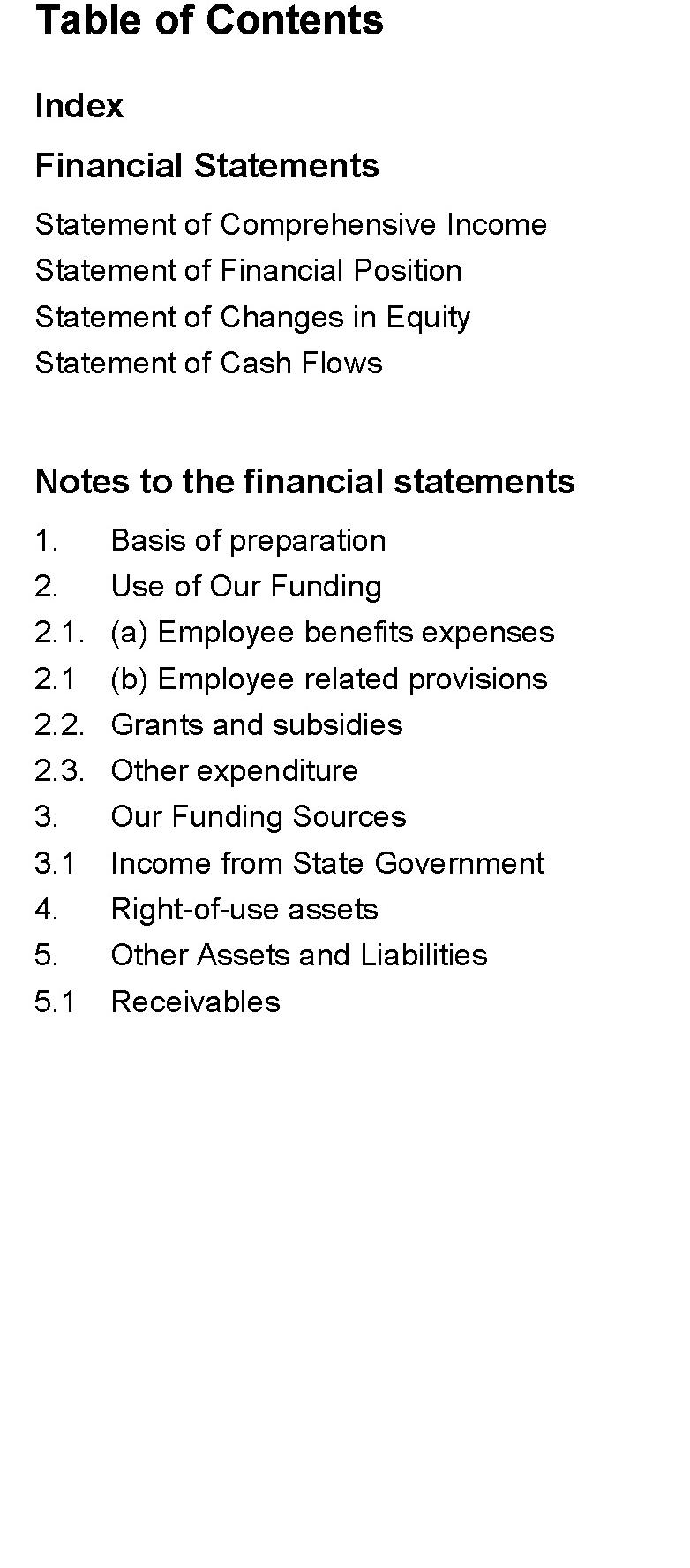
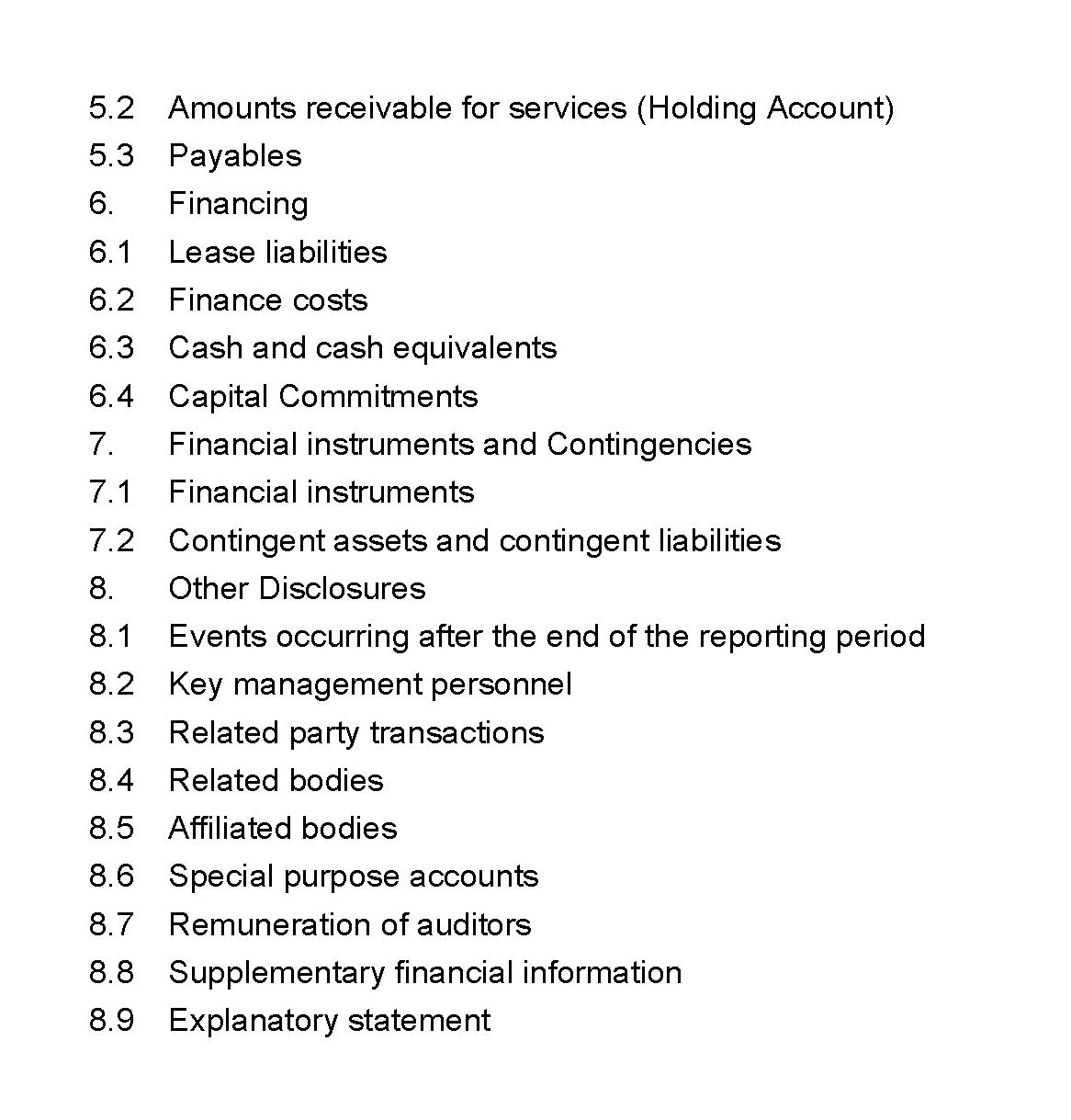
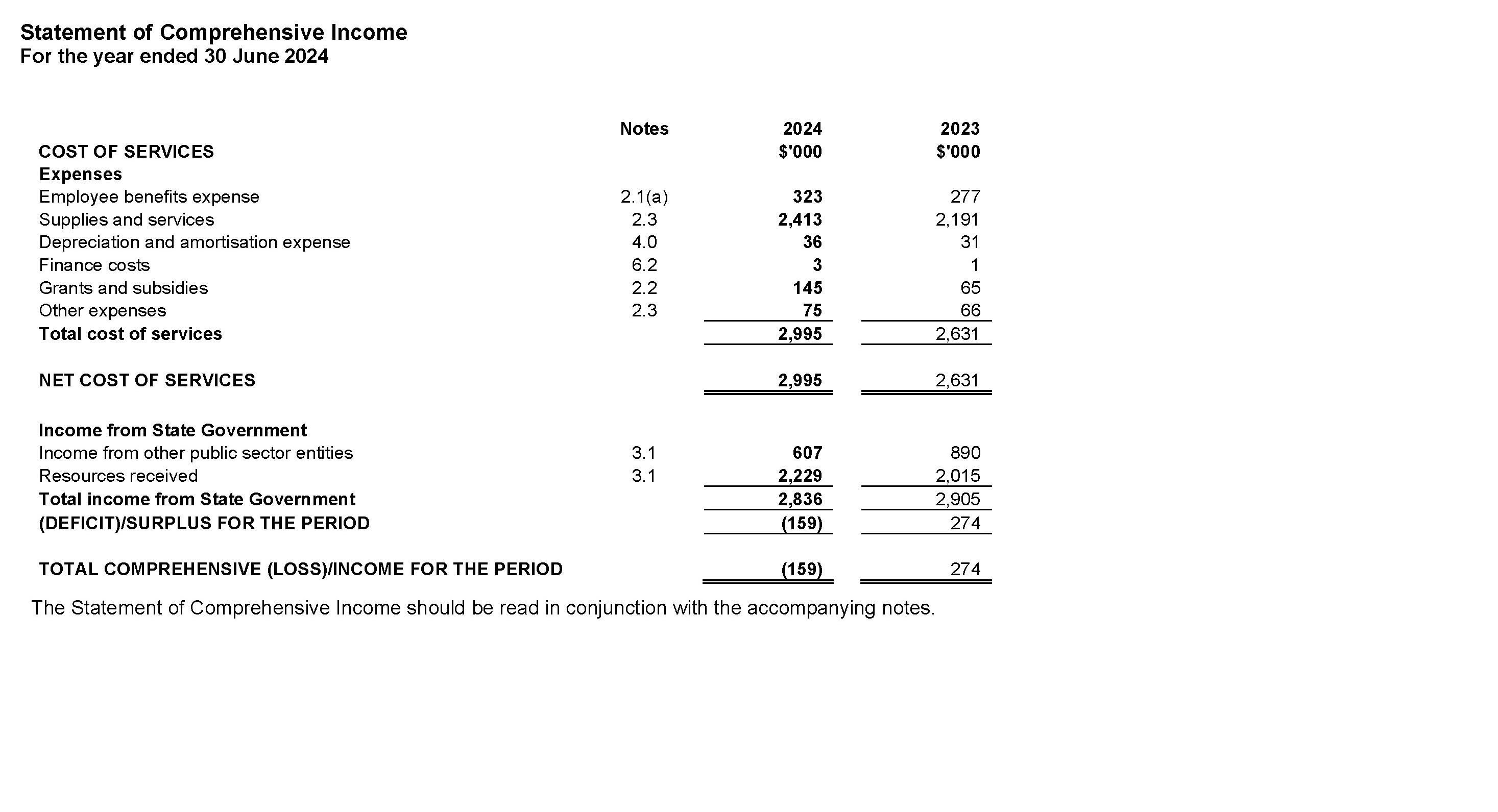
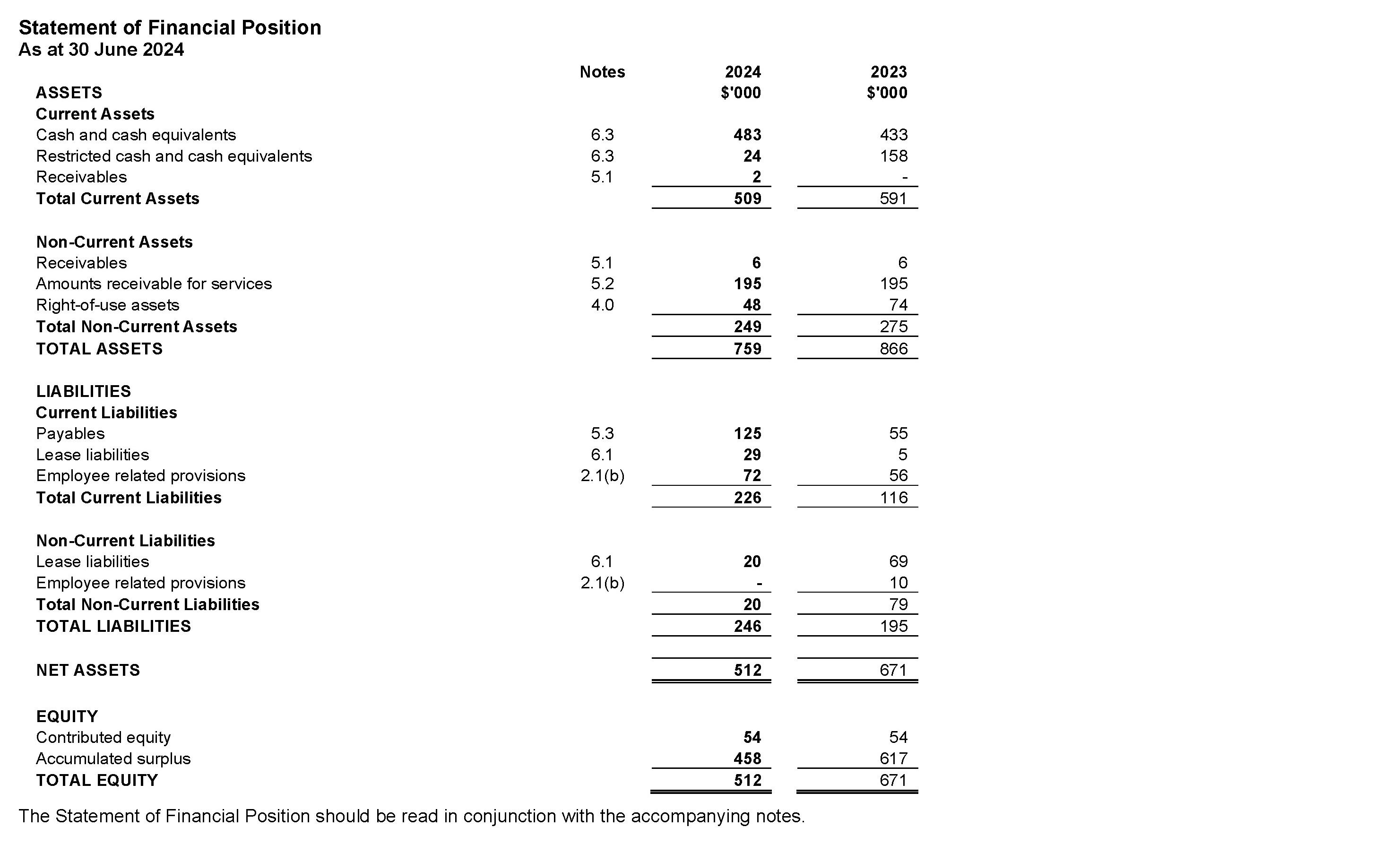
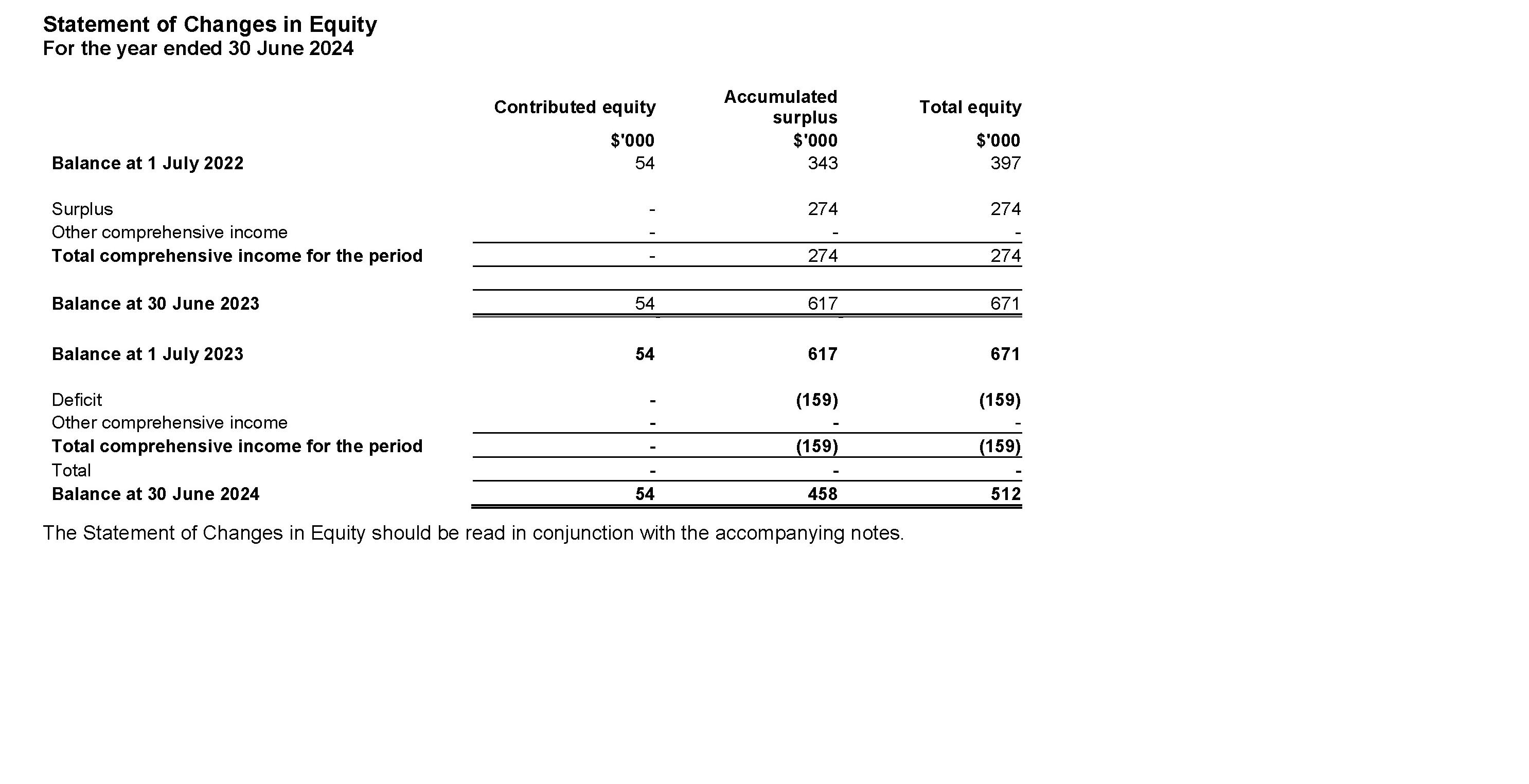
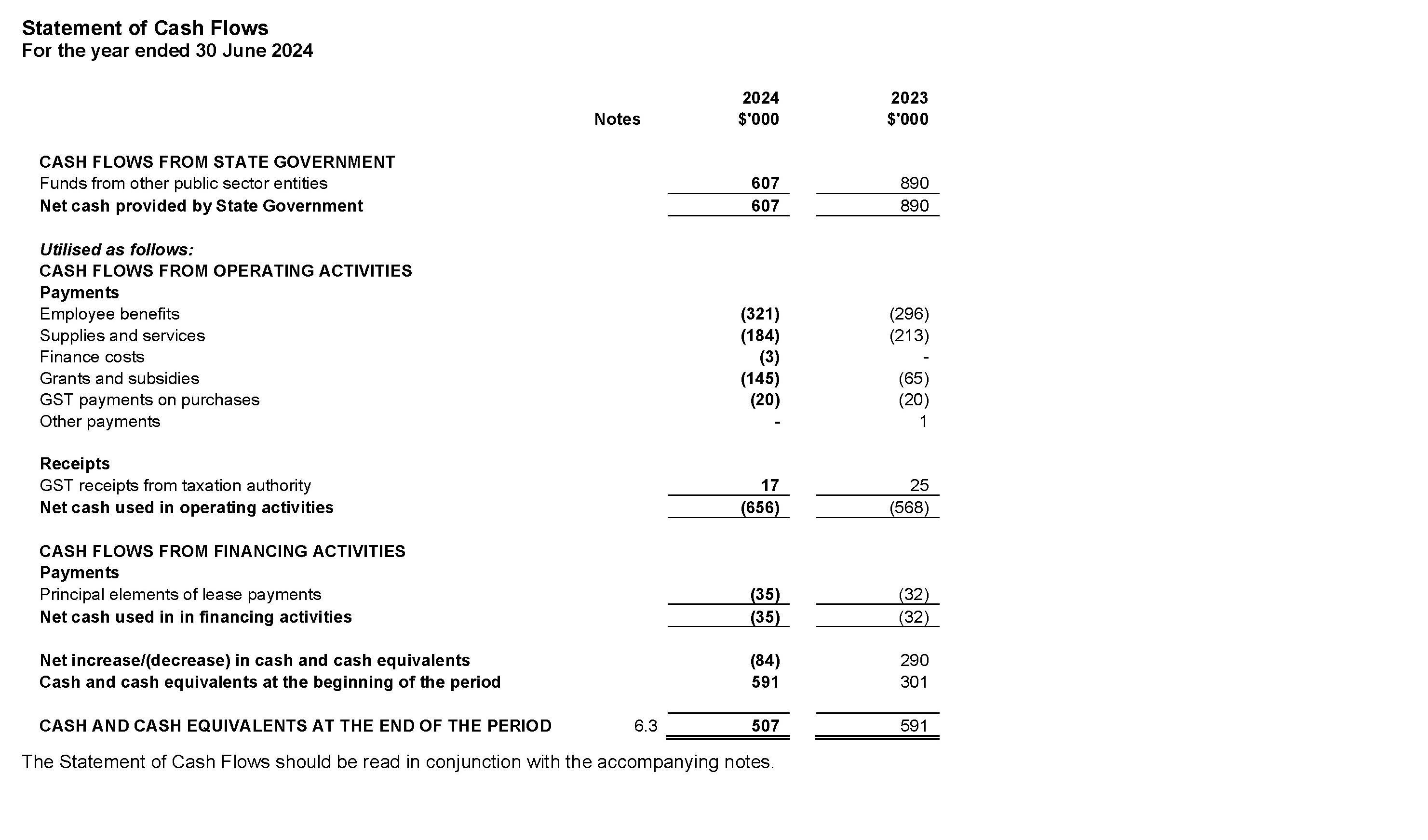
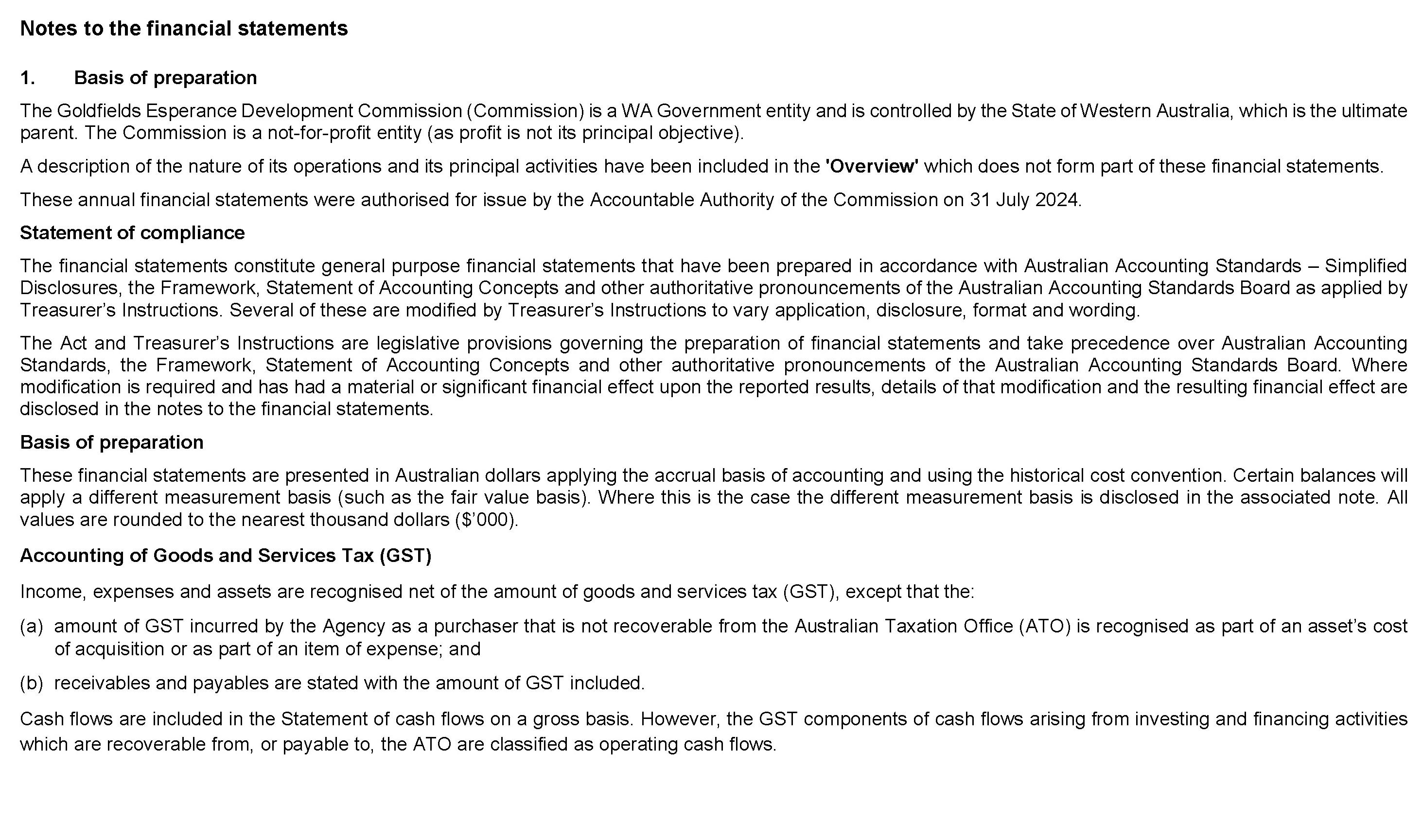
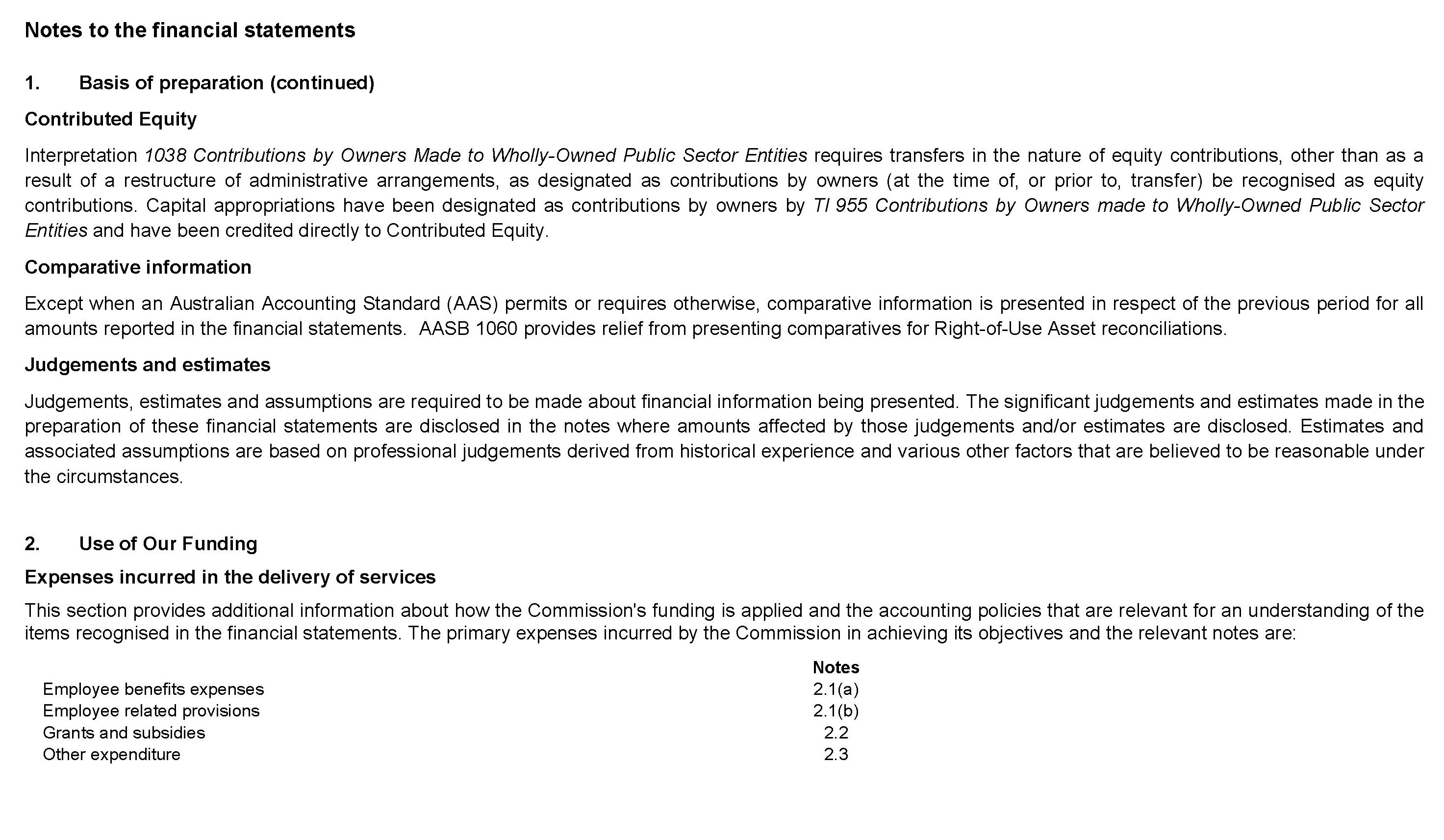
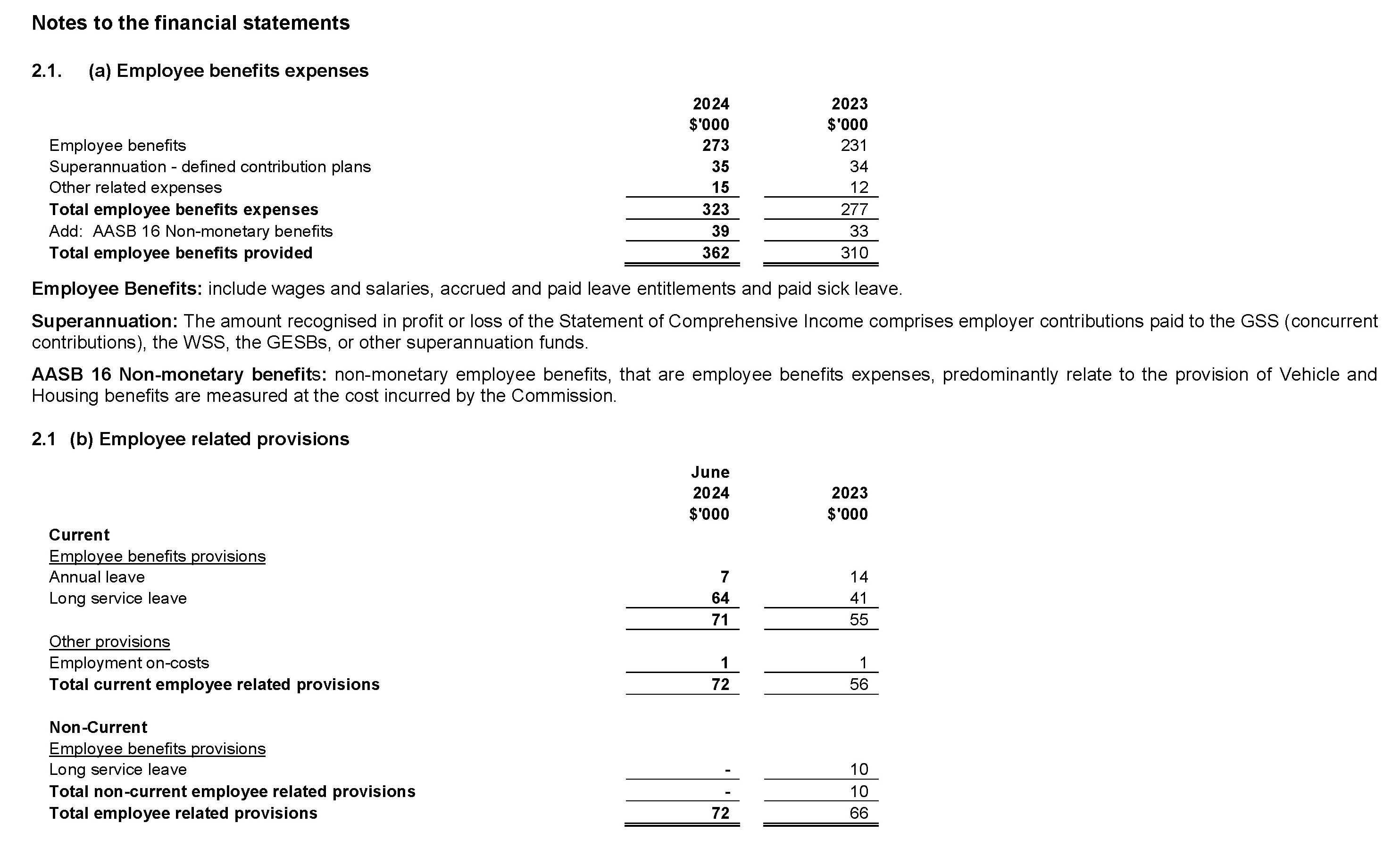
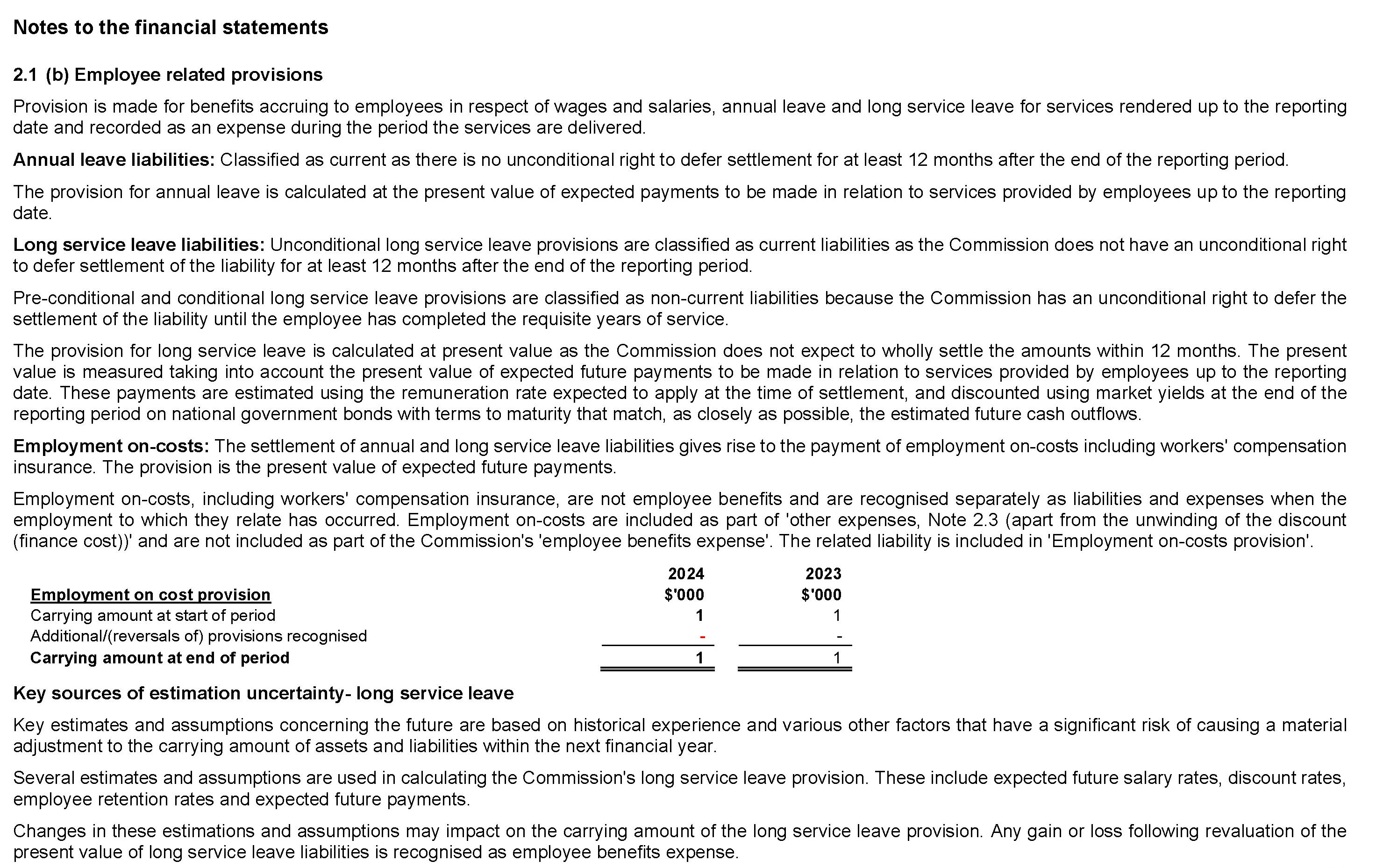
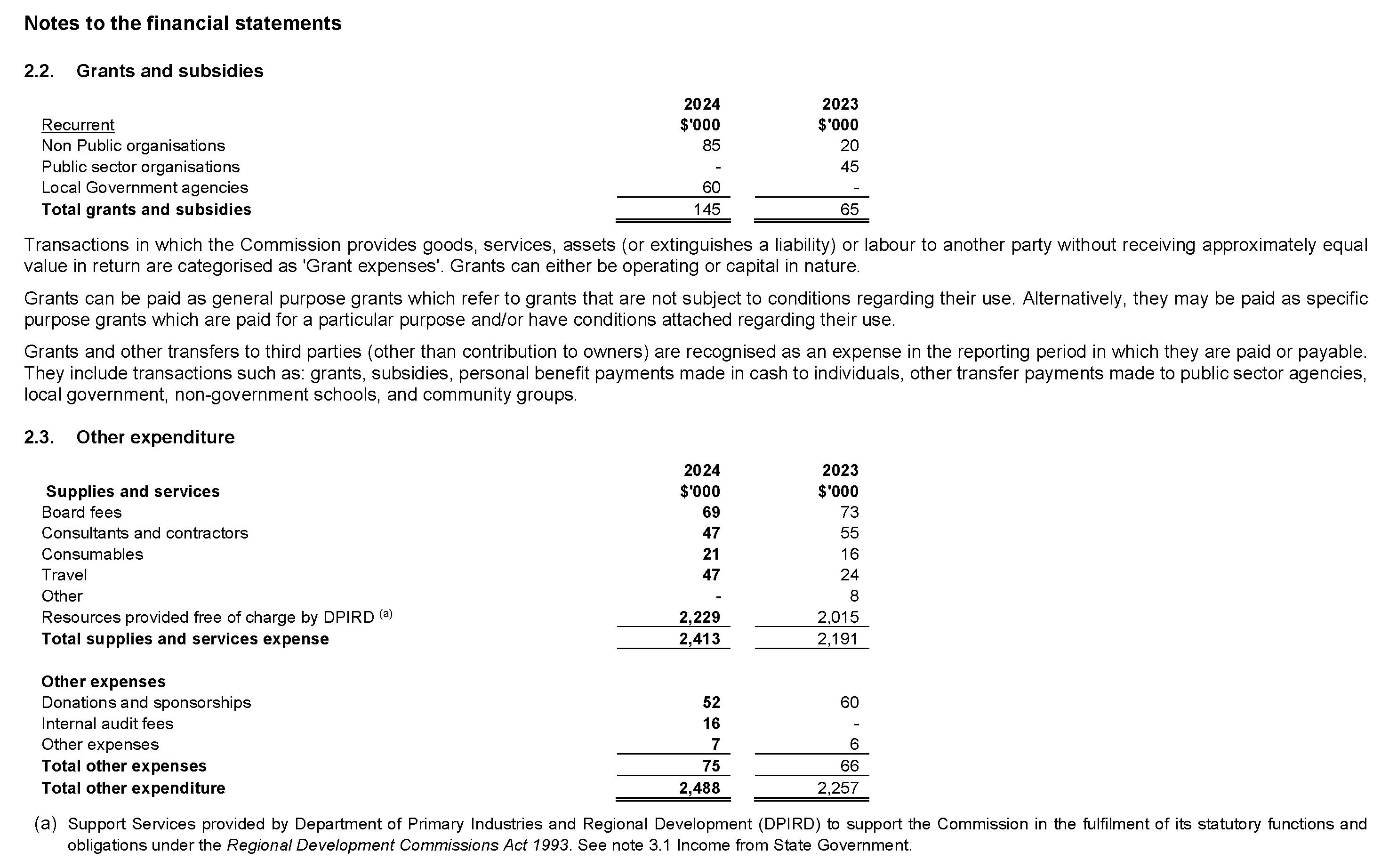
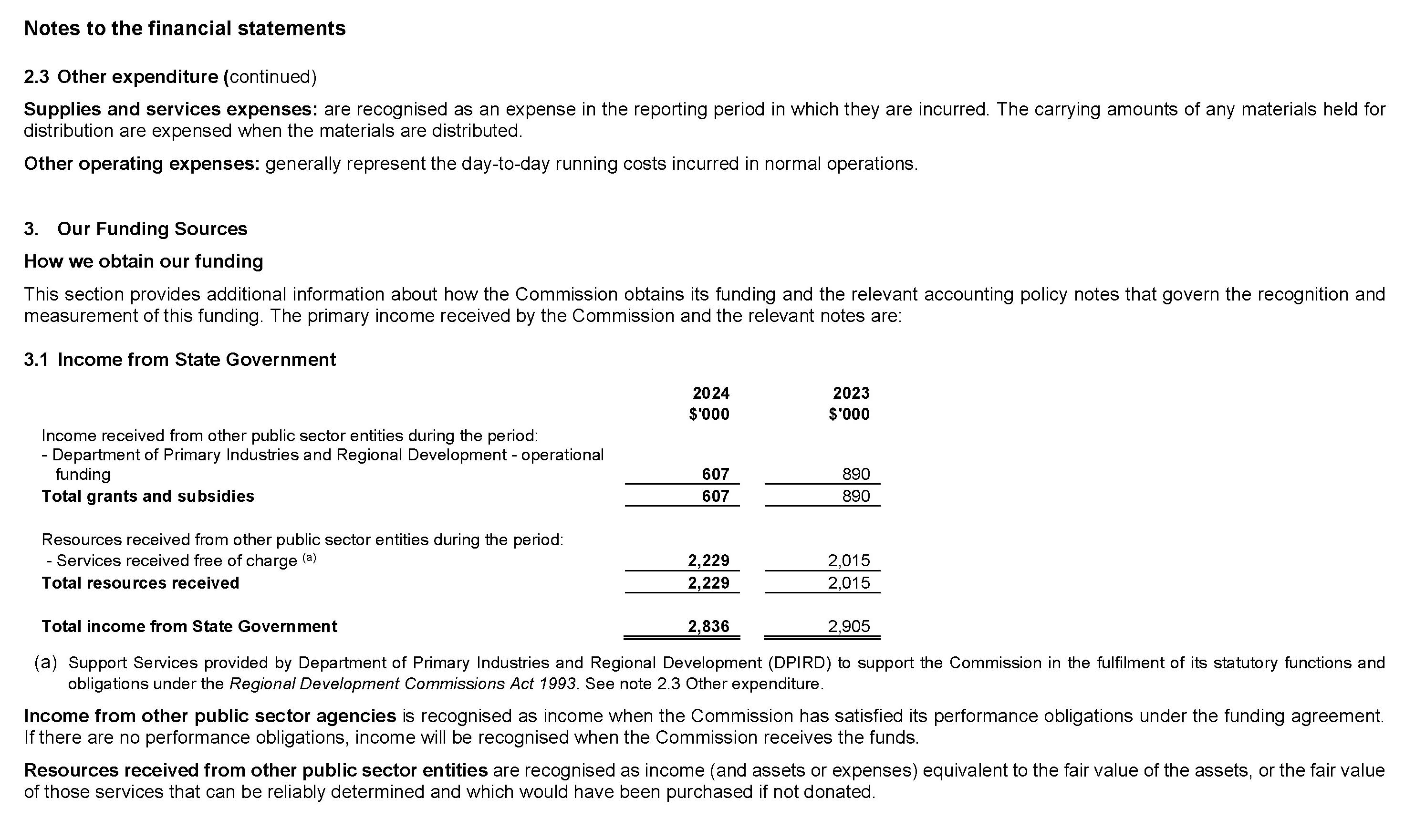

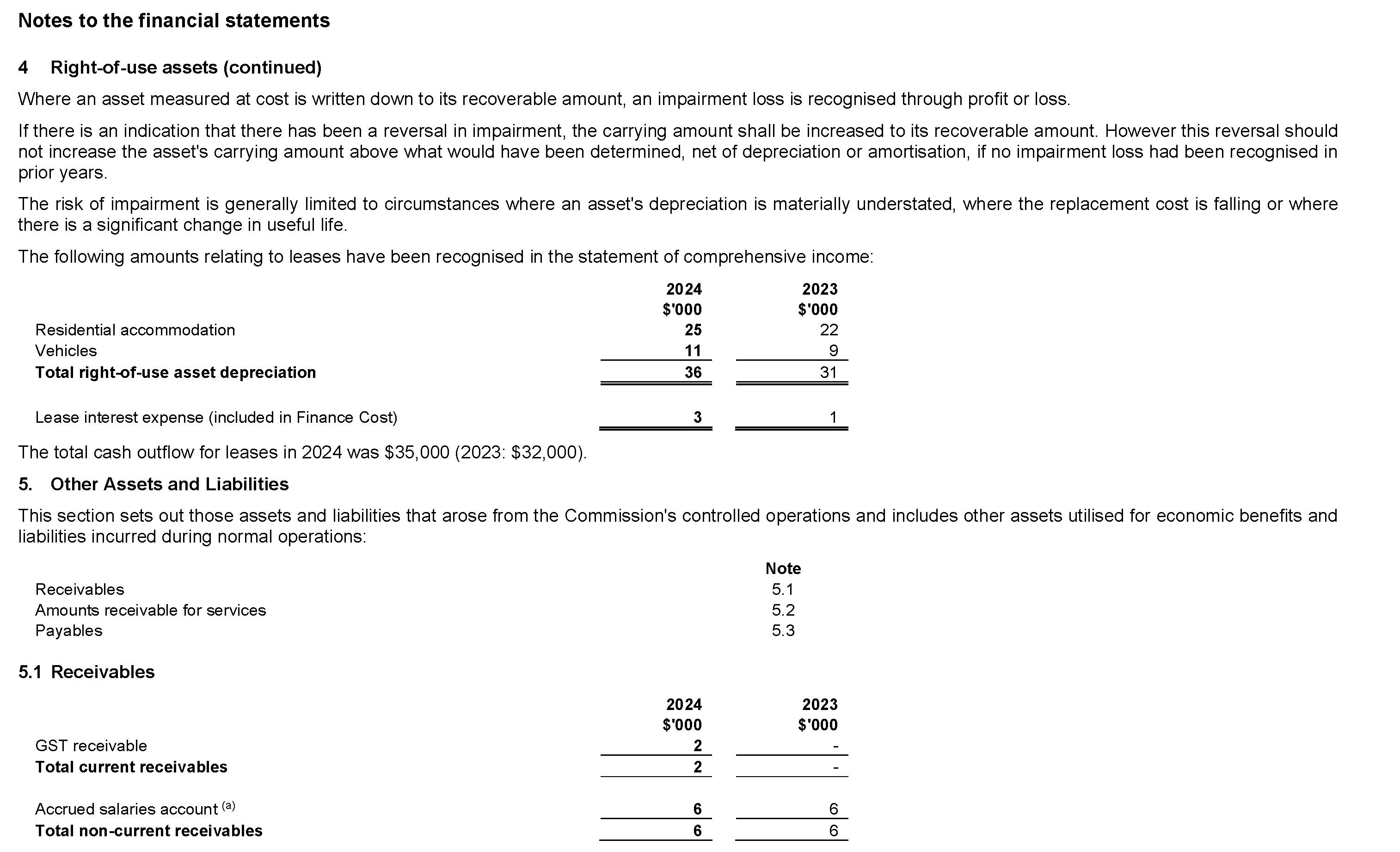
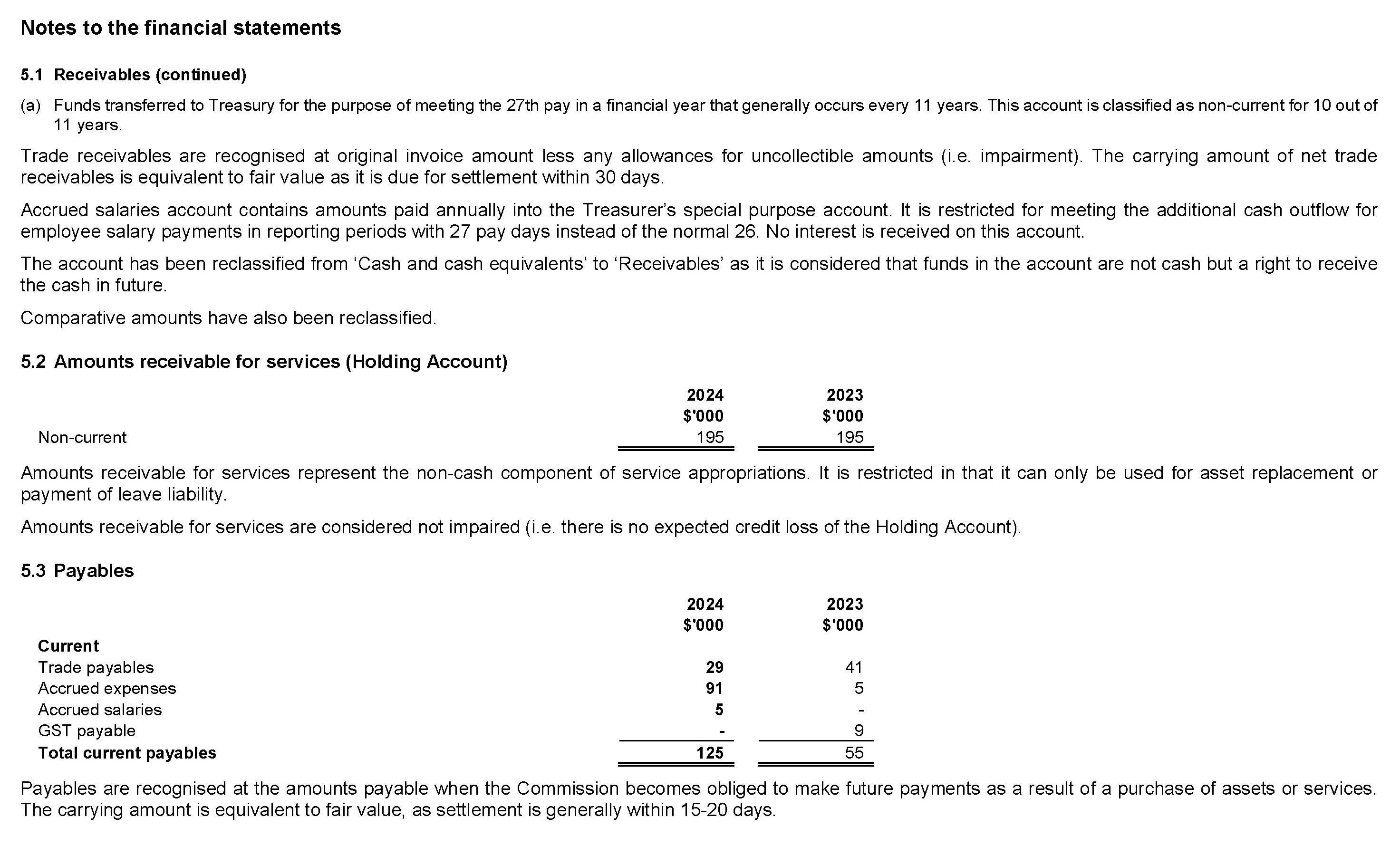
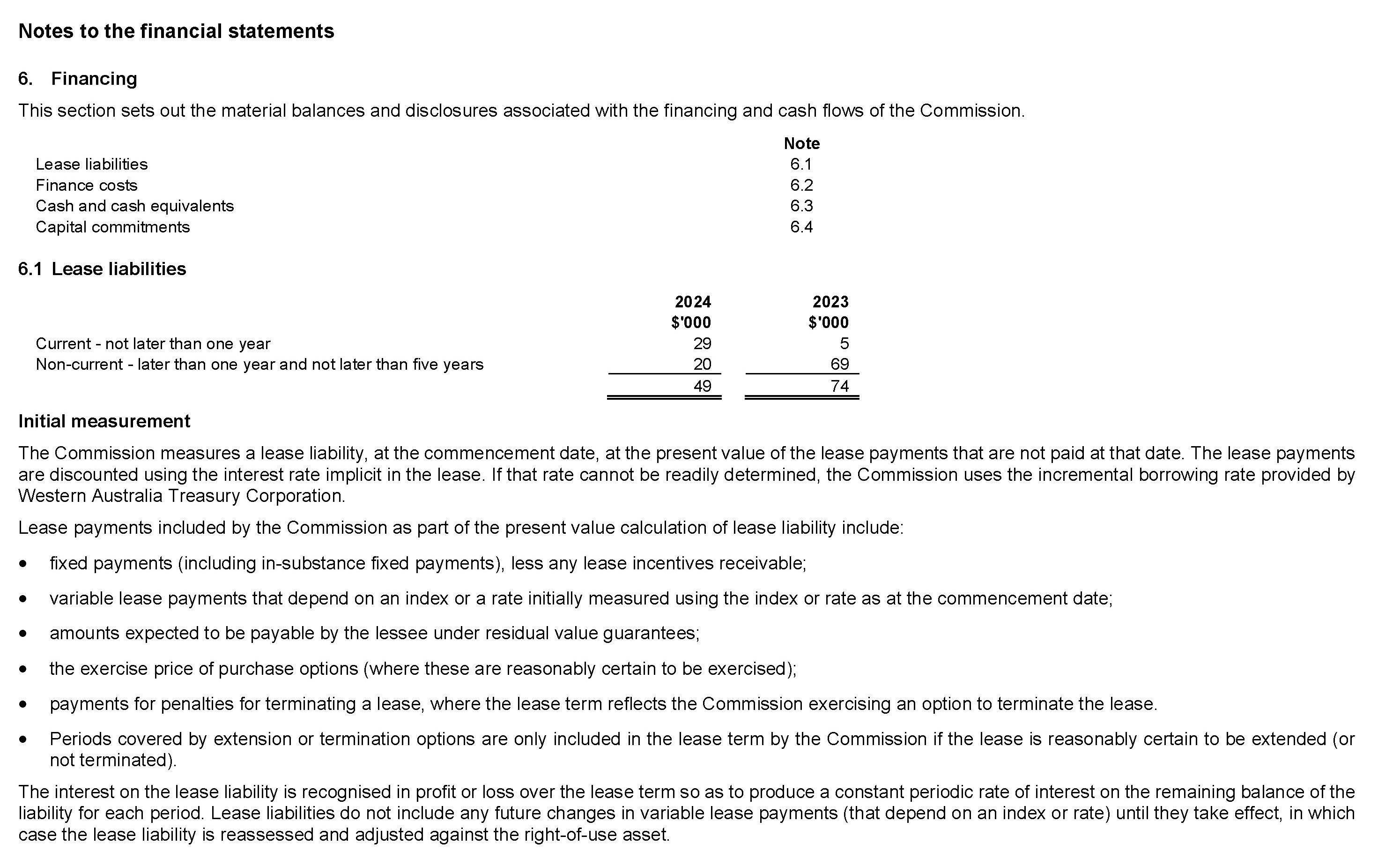
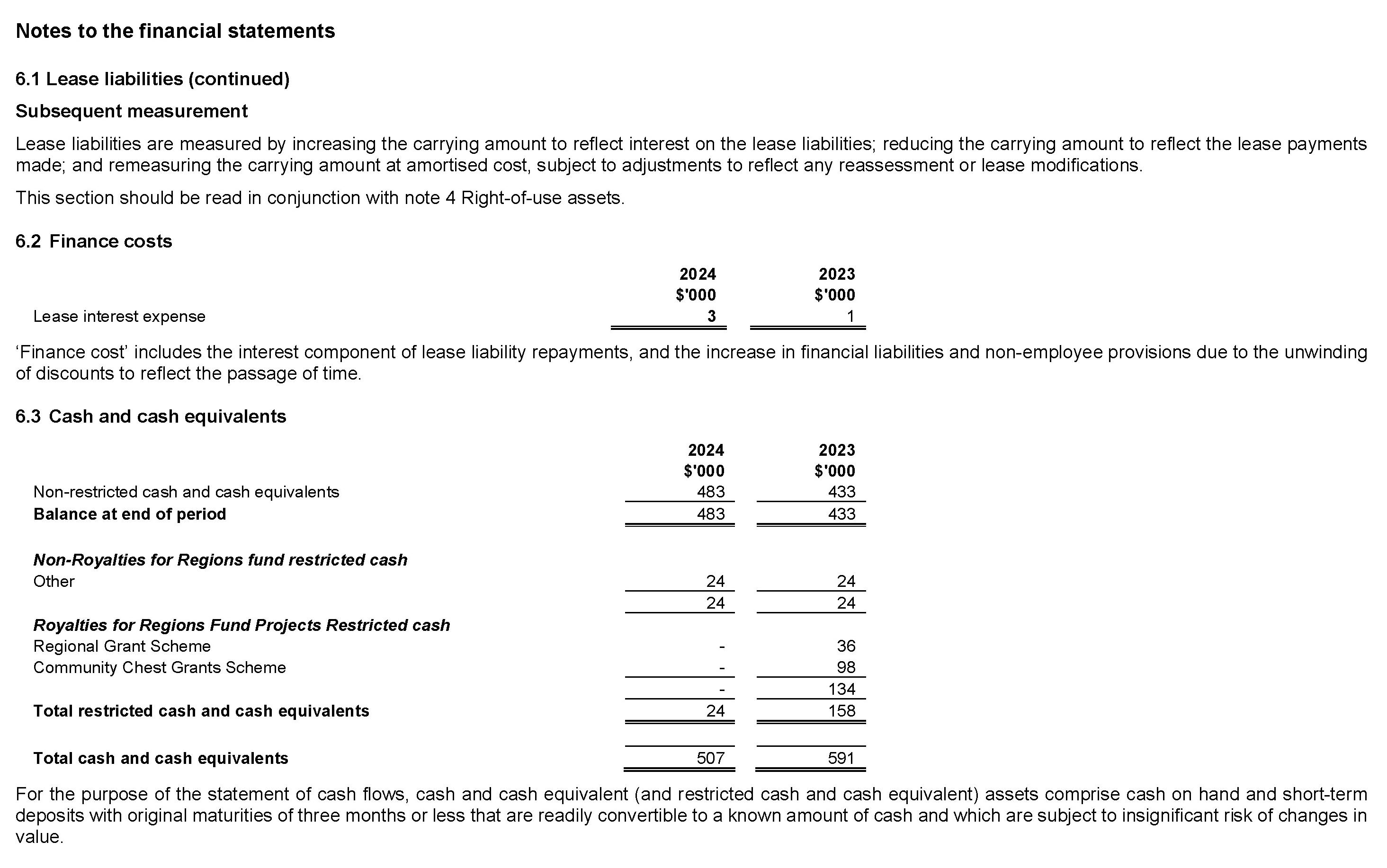
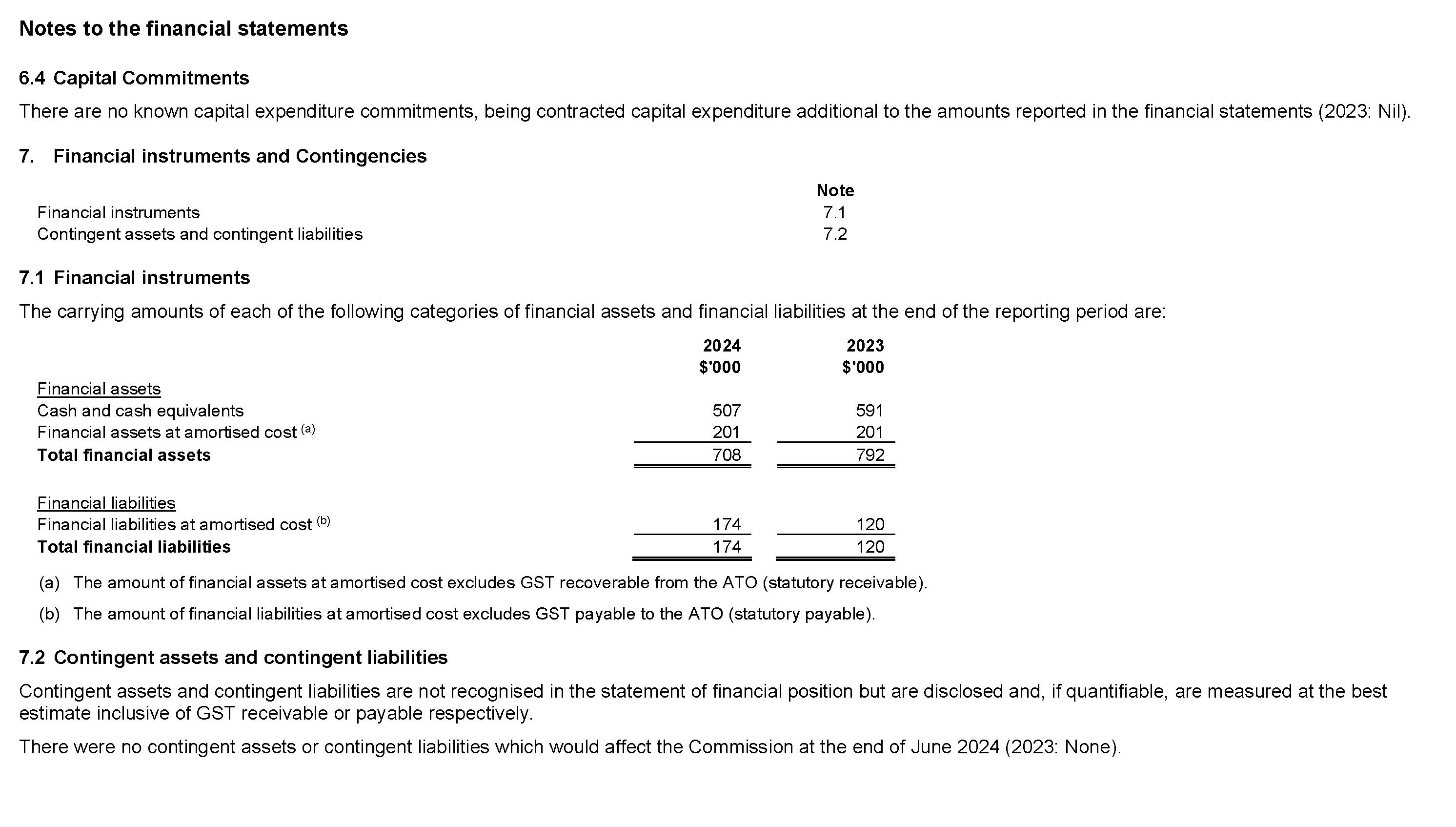
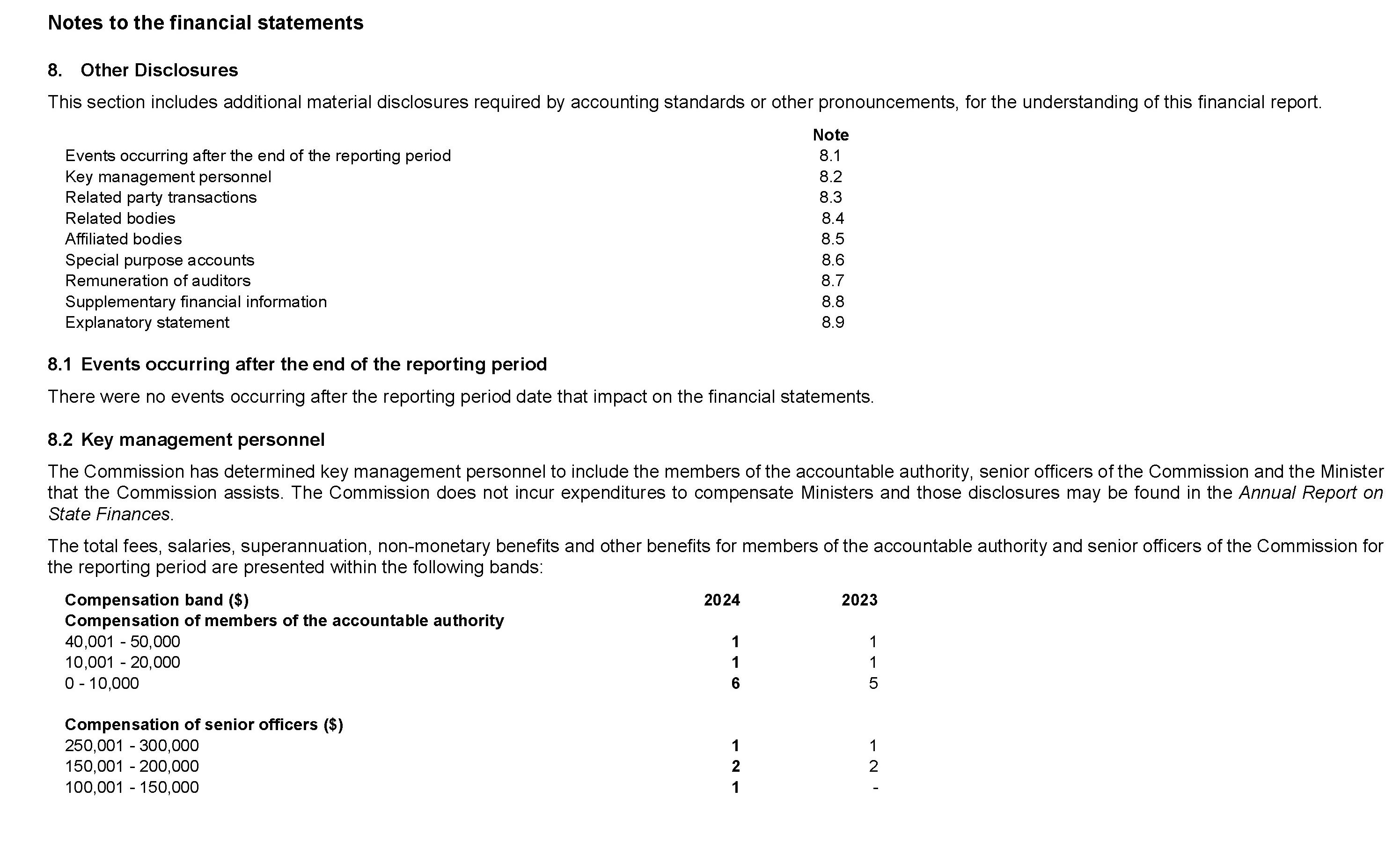
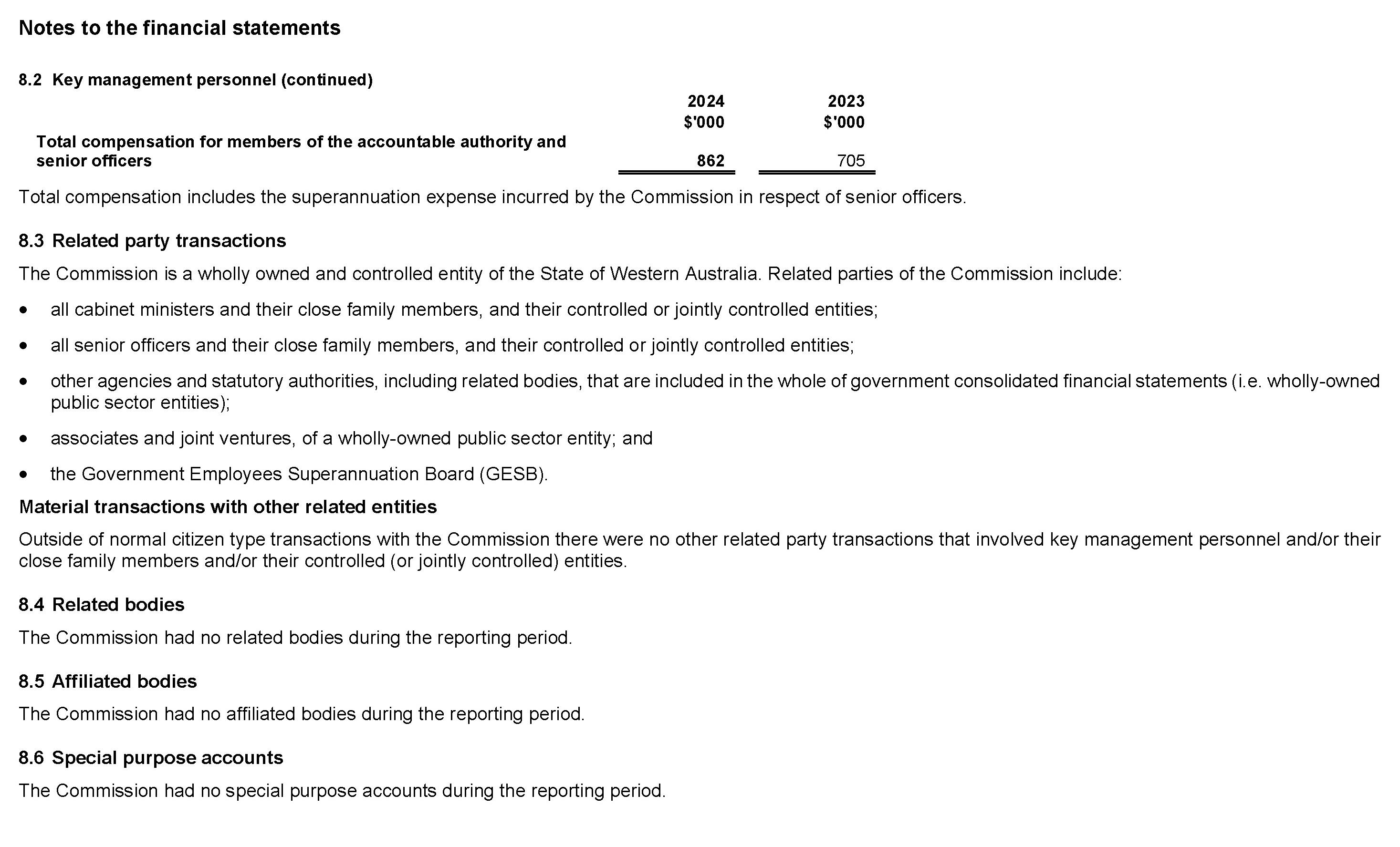
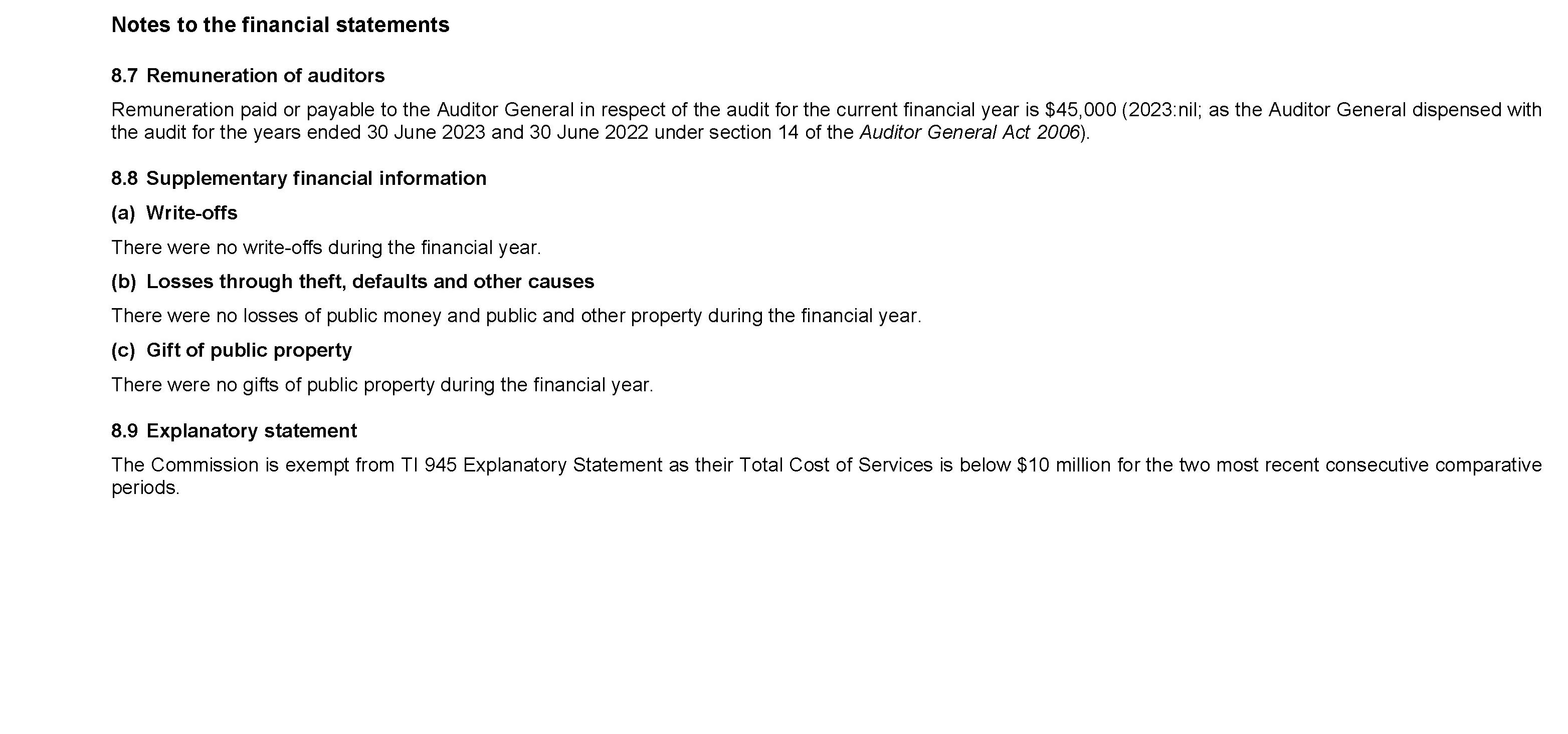
Each year the GEDC is measured in its performance against two key performance indicators – one effectiveness and one efficiency indicator. These indicators are established through the Government’s Outcomes Based Management Framework, prior to the commencement of the financial year, and relate to the GEDC’s prescribed Government Goals, Desired Outcomes and Service.
To evaluate our performance in providing a regional development service to promote economic development and sustainable regional communities, the GEDC utilises performance indicators that are measured on an annual basis.
The GEDC measures its effectiveness through an Annual Client Perceptions Survey, conducted by an independent market research company. To help determine if the desired outcomes have been achieved, participants are asked to rate their satisfaction with the GEDC making a positive contribution to the economic development of the region. The effectiveness indicator and actual result, as measured through the 2023-24 Client Perception Survey, is provided below:
To measure the relationship between services delivered and the resources used, the GEDC’s performance is also measured on the average cost per hour to promote economic development and sustainable regional communities. The efficiency target and actual result, calculated on the hours worked by GEDC during 2023-24, is provided below:
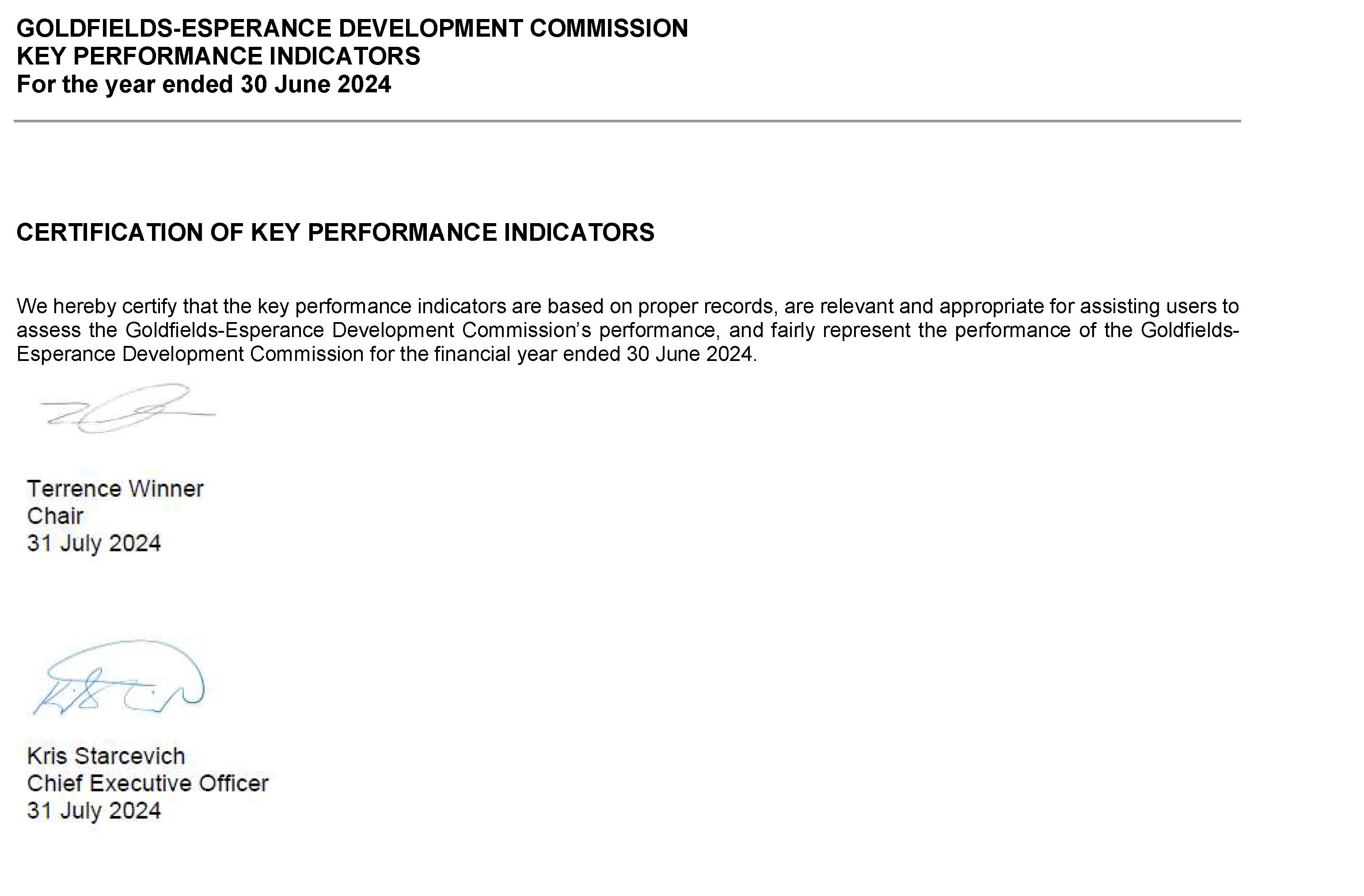
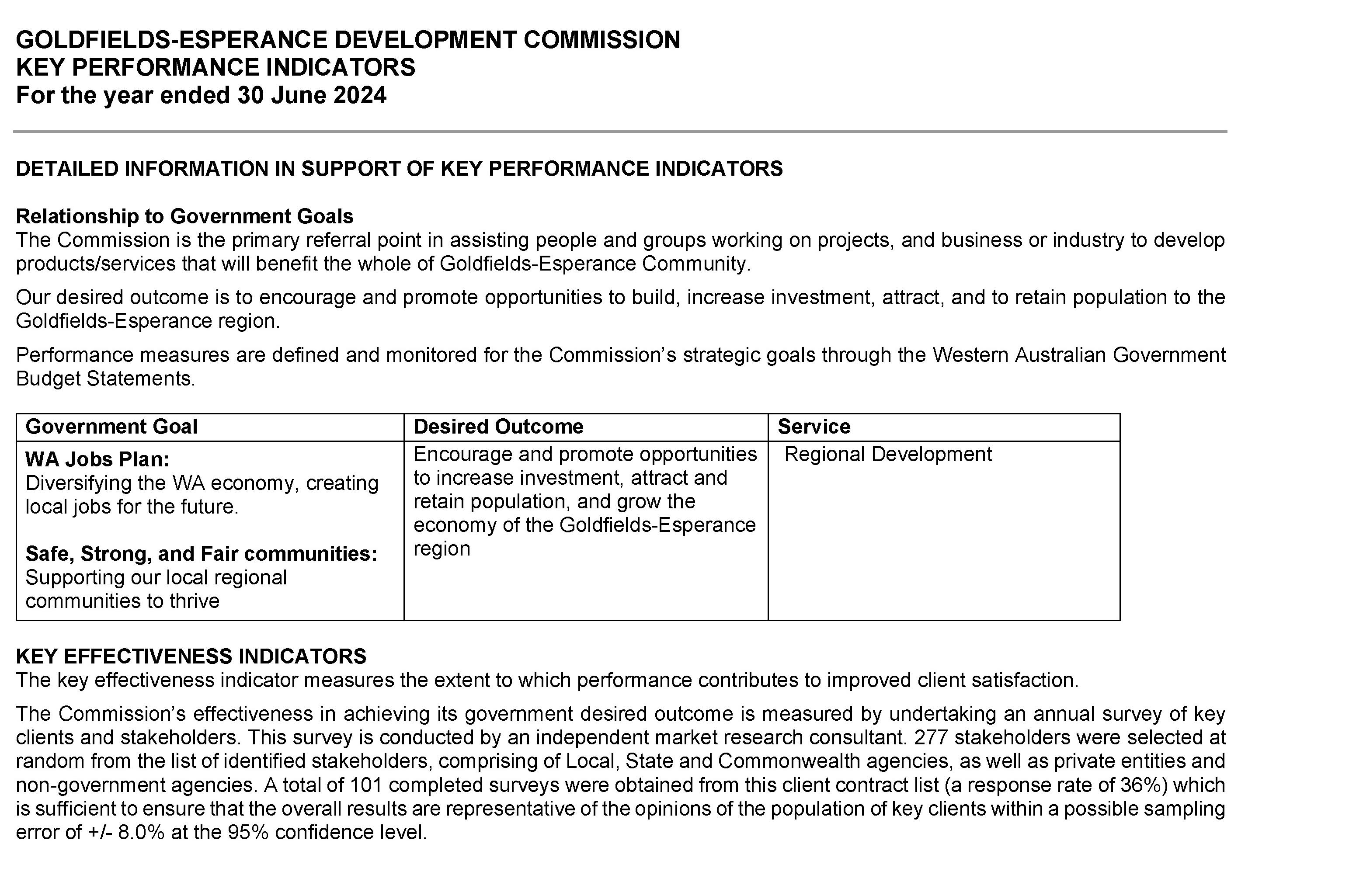
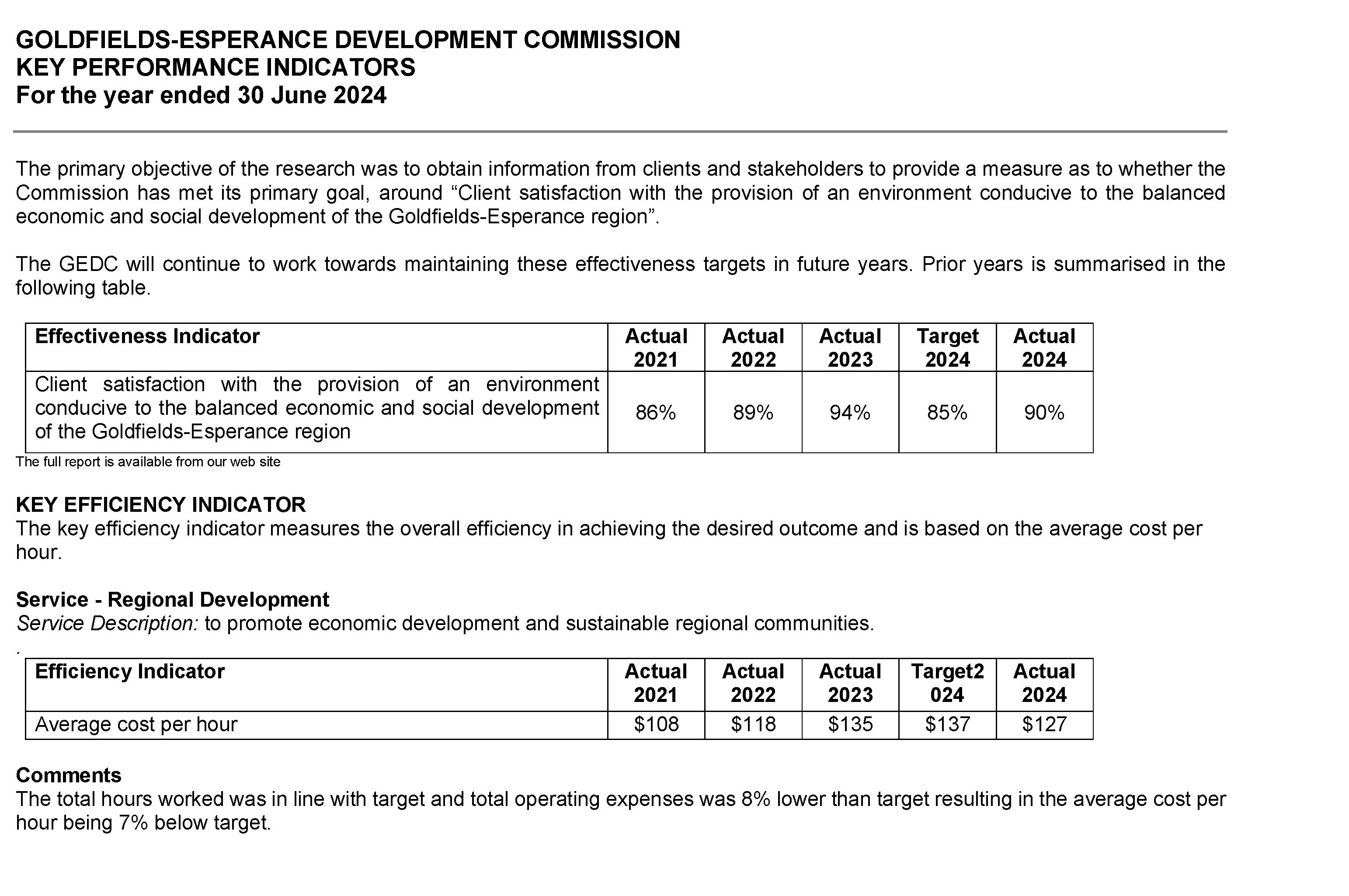
Section 25 (2) of the Regional Development Commission Act 1993 requires that the text of any written direction from the Minister is to be recorded in the Annual Report. No Ministerial Directives were received by the Commission during the financial year.
The Commission did not complete or commence any capital works projects during 2023-24.
The CEO is the only employee of the Commission. Resources, including assigned DPIRD staff, are provided by DPIRD free of charge under a Service Level Agreement and a staffing arrangement pursuant to section 29 of the Act, to enable the Commission to meet its legislative and operational requirements.
There have been no workers’ compensation claims during the reporting period for GEDC employees. Workers’ compensation claims for DPIRD employees working for the GEDC are reported through the DPIRD Annual Report.
At 30 June 2024, DPIRD provided a complement of 11 employees, with an allocation of 12.5 full time equivalent (FTEs) which is consistent with the 2022-23 employee allocation (table below).
The GEDC is committed to professional development opportunities for its Board and staff. New Board Members and staff participate in an induction process with key information provided and online training modules provided by DPIRD and the PSC. Training and development plans are part of every employee’s performance agreement and reviewed annually.
During the reporting period, Board Members and staff participated in various, online, external and in-house training. Staff development workshops, presentations and planning sessions were also held at quarterly staff meetings.
The Goldfields-Esperance Development Commission does not have shares in another body.
In March 2024, $6,282.32 (incl. GST) was paid via Marsh Pty Ltd, to indemnify all Board Members against a liability incurred under Section 13 or 14 of the Statutory Corporation (Liability of Directors) Act 1996.
During the reporting period, the GEDC did not incur expenditure with an entity in which a senior officer is also a Director, Partner or member of the Executive.
The Goldfields-Esperance Development Commission is not separately identifiable in the WA State Government annual estimates as it is aggregated together with the Department of Primary Industries and Regional Development and the eight other Regional Development Commissions in Division 15.
Treasurer’s Instruction 953 requires that each statutory authority whose financial aggregates are not separately identifiable in a single Division of the Consolidated Account Expenditure Estimates, publish their Minister approved Section 40 annual estimates on their website. However, agencies described in Treasurer’s Direction attached to the Treasurer’s Instruction are exempt from preparing draft annual estimates.
As the Commission is a statutory authority whose Total Cost of Services is less than ten million dollars for the two most recent consecutive comparative periods as reported in the tabled annual report, the Commission is exempt. The following annual estimate for 2024-25 for the Goldfields-Esperance Development Commission was approved by Board.
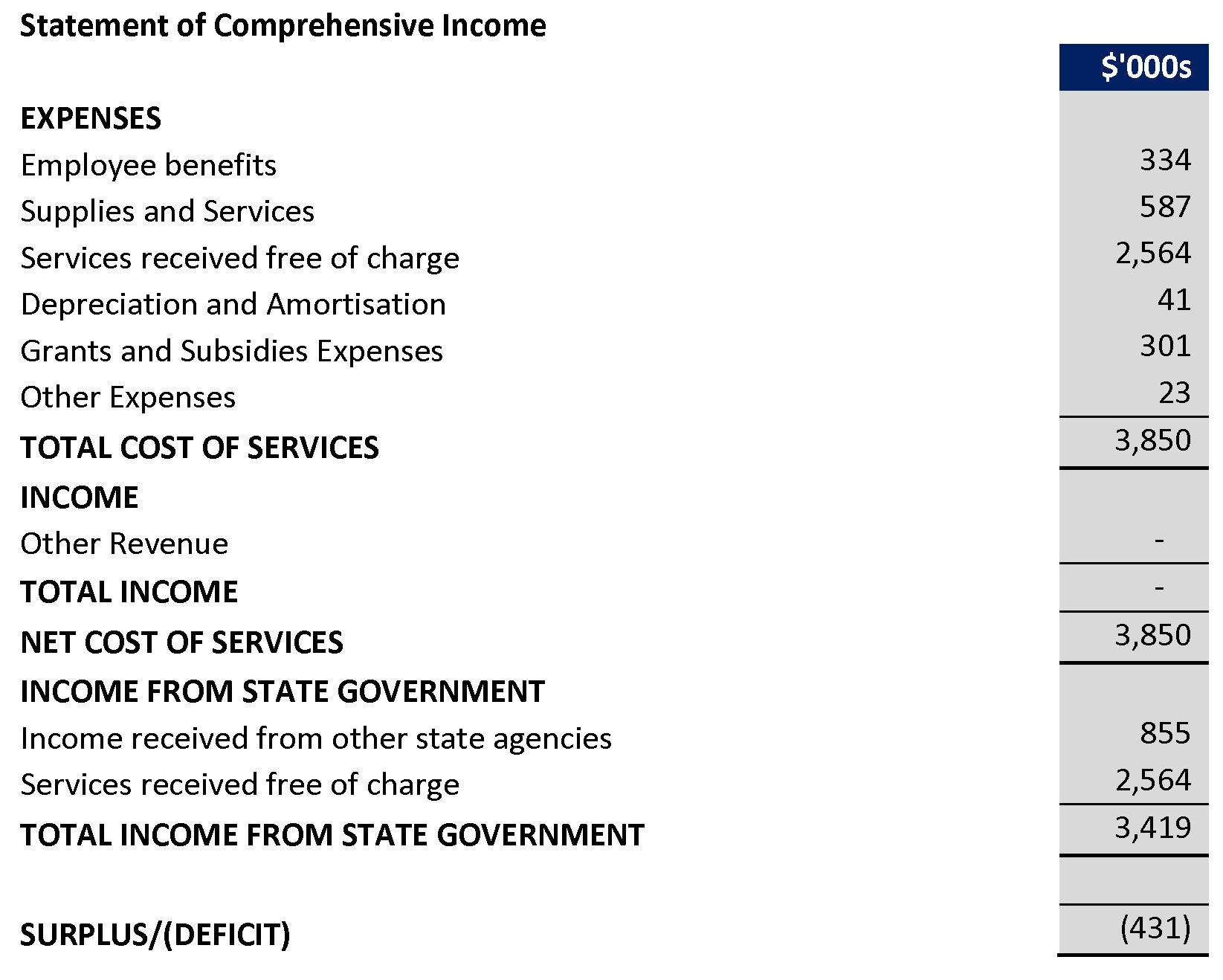
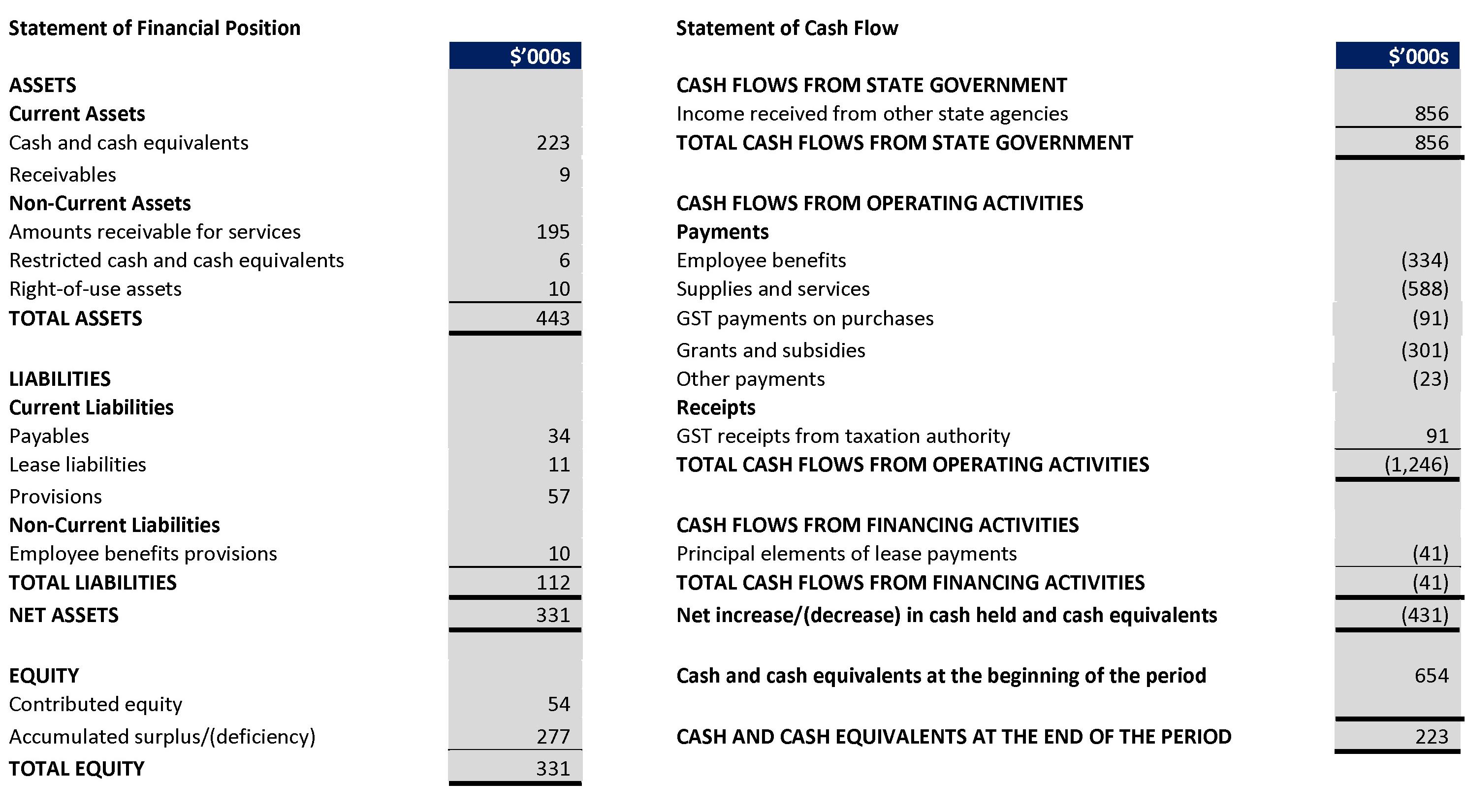
In compliance with Section 175ZE of the Electoral Act 1907, the Commission monitors expenditure incurred in the relation to advertising agencies, market research, polling, direct mail and media advertising. The Commission incurred a total expenditure of $13,023.61 for 2023-24.
Expenditure was incurred in the following areas:
The Commission did not make any Acts of Grace payments in the reporting period.
There was no unauthorised use or personal expenditure recorded this financial year.
The GEDC has had no compliance issues during the financial year regarding the Public Sector Standards, the WA Code of Ethics or the internal Code of Conduct.
The Commission continues to review and update internal policies to ensure compliance with Public Sector Commission updates.
The State Records Act 2000 requires the GEDC to have a record keeping plan and to comment in the Annual Report on compliance with the plan. The GEDC Record Keeping Plan was approved by the State Records Commission on 26 March 2021. In accordance with Section 28 of the State Records Act 2000, the record keeping plan is to be reviewed within five years of its approval date. A report of the review must be submitted to the State Records Office by March 2026. The Commission staff are aware of their record keeping responsibilities and receive induction and ongoing training in relation to the agency’s record keeping policies, practices and procedures.
The Department of Primary Industries and Regional Development was selected and reviewed as part of the Public Sector Commission led Agency Capability Review Program. The GEDC will work closely with the Department to ensure key observations are met.
The GEDC is committed to a diverse and inclusive workplace, as research shows agencies that value diversity and inclusion achieve greater staff satisfaction, better customer service outcomes and improved decision making. The workforce is more connected, motivated, and productive.
As part of the 2023 WA Public Sector Census (conducted by the Public Sector Commission) Regional Development Commissions assigned staff participated in the Census and were asked about their diversity, whether they had shared this information and if not, why. These results reflect the voices and experiences of the employees who took part in the survey including assigned staff from across RDCs but were not broken down to individual RDCs.
The GEDC is committed to promoting an inclusive environment in which all people can access our services and facilities. The DPIRD Disability Access and Inclusion Plan 2018-2023 is the current DAIP for the GEDC.
DPIRD is in the process of developing the next five year plan (2024-29). The GEDC was invited to participate in development of the new plan during 2024.
In accordance with the Disability Services Act 1993 and Schedule 3 of the Disability Services Regulations 2004 the GEDC continues to implement strategies and initiatives that achieve seven access and inclusion outcomes identified and outlined below:
• People with disability have the same opportunities as other people to access the services of, and any events organised by the GEDC.
• People with disability have the same opportunities as other people to access the offices and other facilities of the GEDC.
• People with disability can request to receive information from the GEDC in a format that will enable them to access the information as readily as other people are able to access it.
• People with disability receive the same level and quality of service from the staff of the GEDC as other people receive.
• People with disability have the same opportunities as other people to make complaints to the GEDC.
• People with disability have the same opportunities as other people to participate in public consultation by the GEDC.
• People with disability have the same opportunities as other people to obtain and maintain employment with the GEDC.
A copy of the DPIRD Disability Access and Inclusion Plan can be found on the GEDC website.
Board and Committee Remuneration Entitlements
During the reporting period the Board met on six occasions and the Risk Management and Audit Committee met on three occasions.
The GEDC acknowledges its responsibilities under the Work Health and Safety Act 2020.
The CEO is the only employee of the GEDC and is not trained in OSH and injury management responsibilities. Staff members provided by DPIRD are trained in OSH provide a formal mechanism of consultation on OSH matters.
The Commission provides staff with guidance on safe work practices and all staff are required to comply with DPIRD and GEDC OSH policies and procedures.
Employees are required to conduct themselves in a safe manner, not placing themselves or others at risk. Contractors working on site are also required to conduct their activities in a manner that ensures the safety, health and welfare of others.
The Commission ensures all its safety equipment is serviced as advised by the manufacturer. Compliance officers are responsible for regular inspections and the compliance register. The GEDC has received zero provisional improvement notices.
The GEDC is committed to consulting with Board Members and staff on OSH matters including:
• A strong focus on OSH policy and procedures and hazard identification / incident reporting procedures during induction.
• OSH Committee meetings listing any hazards reported, communication of OSH directives and site reviews.
• OSH standing agenda item of Board meetings, RMAC meetings, quarterly staff meetings and regularly discussed at weekly team meetings ‘Health and Safety Moment’.
The Chief Executive Officer is the only employee of the Commission. Resources, including staff, are provided by the Department of Primary Industries and Regional Development to enable the Commission to meet its legislative objectives. As such the current number of managers employed by the Commission who are trained in occupational safety, health and injury management is nil.
The GEDC continues to work with DPIRDs WHS Reform Project to transition to workplace safety managed under the new Work Health and Safety Act 2020 and the Regulations that came into effect on 31 March 2022.
A local DPIRD OHS Committee is operational at both the Kalgoorlie-Boulder and DPIRD Esperance office. The committee runs independent meetings, identifying any hazards reported, communication of OHS directives and site reviews. The minutes from these meetings are presented at GEDC Board meetings, uploaded to DPIRDs record management system and reported into the DPIRD Strategic OHS meeting.
The GEDC is included in the DPIRD Multicultural Plan 2021-26 and is committed to providing goods, services, facilities and employment opportunities that meet the different needs and aspirations of the Culturally and Linguistically Diverse (CaLD) communities of the region. The DPIRD Multicultural Plan 2021–26 sets outcomes and strategies in which the GEDC will work to achieve the policy priorities:
• Harmonious and inclusive communities.
• Culturally responsive policies, programs and services.
• Economic, social, cultural, civic and political participation.
The GEDC supported cultural diversity in our workplace by acknowledging and celebrating community multicultural events including International Women’s Day, Reconciliation Week, NAIDOC Week, Multicultural Festival, Harmony Day and the Women in Leadership Forum.
In June, the GEDC sponsored the Taste of the World event which celebrated language, food, music, arts and stories showcasing multicultural communities from across Esperance.
During the reporting period the GEDC, through funding, facilitation or in other ways participated in several events and programs that promoted cultural awareness, employment, training or business opportunities for the CaLD communities. The Goldfields Migrant Employment Project (GMEP) continues to be delivered, with GEDC support to attract and settle secondary migrations of CaLD communities from the metropolitan area.
The GEDC supported staff members to participate in the Leadership Australian Resilient Communities (LARC) Program which aims to leverage cross regional connections and place-based development opportunities. Through the program, a staff member is developing and delivering a multicultural community markets in Kalgoorlie.
Substantive equality recognises that while some systems and processes may outwardly appear as nondiscriminatory, they may not be fully responsive to the needs and aspirations of different people and groups and, as a result, can unintentionally create further inequalities. GEDC is committed to identifying and eliminating institutional barriers wherever they exist.
The National Strategic Plan for Asbestos Awareness and Management 2019-2023 is consistent with the Western Australian Government policy on Occupational Safety and Health.
Each State and Local Government department, agency, authority and government enterprise is required to report on its progress in achieving Western Australia’s targets to the Department of Energy, Mines, Industry Regulation and Safety.
The Department of Primary Industries and Regional Development reported on behalf of the GEDC.
Of the fifty-four (54) Small Grant projects (2021 election commitments) 1 project is withdrawn, 48 acquitted, 2 completed and 3 in progress.
The GEDC supported the following strategic community and economic initiatives during 2023-24.
ACRONYM NAME
AED Aboriginal Economic Development
CKB City of Kalgoorlie-Boulder
CME Chamber of Minerals and Energy
CRC Community Resource Centre
CRC TiME Cooperative Research Centre Transformations in Mining Economies
DJTSI Department of Jobs, Tourism, Science and Innovation
DEMIRS Department of Energy, Mines, Industry Regulation and Safety
DPIRD Department Primary Industries and Regional Development
DOC Department of Communities
DOF Department of Finance
DPLH Department of Planning, Lands and Heritage
DTWD Department of Training and Workforce Development
ECCI Esperance Chamber of Commerce and Industry
ECEC Early Childhood Education and Care
ETNTAC Esperance Tjaltjraak Native Title Aboriginal Corporation
GABC Goldfields Aboriginal Business Chamber
GALC Goldfields Aboriginal Language Centre
GMEP Goldfields Migrant Employment Program
GROH Government Regional Officers’ Housing
GTE Government Training Enterprise
GVROC Goldfields Voluntary Regional Organisation of Councils
ACRONYM NAME
KBCCI Kalgoorlie-Boulder Chamber of Commerce and Industry
KPI / KEI Key Performance Indicators / Key Efficiency Indicators
LCA Local Content Adviser
LGA Local Government Authority
METS Mining Equipment, Technology & Services
MIPG Mining Industry Partnership Group
OAG Office of Auditor General
RDAGE Regional Development Australia Goldfields-Esperance
RCC Regional Coordinating Committee
RDC Regional Development Commission
RDCo Regional Development Council
RED Regional Economic Development (Grant)
SEPWA South East Premium Wheatgrowers Association
SHERP Social Housing Economic Recovery Package
SIA Strategic Industrial Area
SME Small to Medium-sized (Business) Enterprise
TAC Tjiwarl Aboriginal Corporation
WALGA WA Local Government Association
WARDA Western Australian Regional Development Alliance
WASM WA School of Mines
WHS Work Health Safety

The GEDC continues to strive towards improving infrastructure and service provision, enhancing regional living outcomes, supporting Aboriginal economic participation, driving new development initiatives and attracting investment to support locally driven projects.

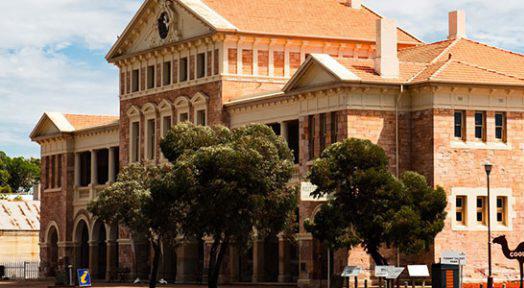

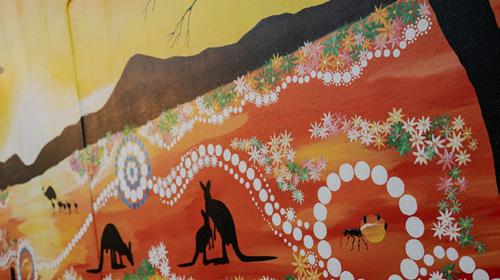
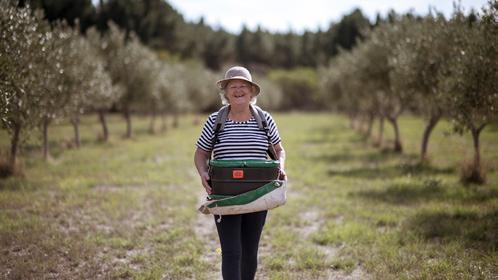
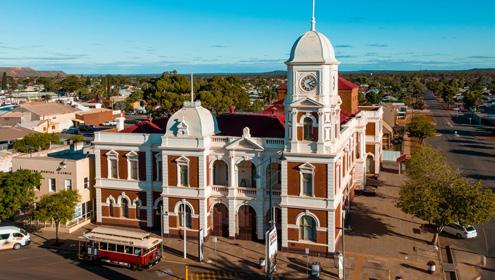
Kalgoorlie-Boulder Office
Viskovich House
377 Hannan Street
Kalgoorlie WA 6430
(08) 9080 5000
Esperance Office
Suite 26c Dutton Arcade
91 Dempster Street
Esperance WA 6450 (08) 9083 2222


info@gedc.wa.gov.au
gedc.wa.gov.au
Goldfields-Esperance Development Commission
@GoldfieldsEsperanceDevelopmentCommission